 17/04/2010 14:47 17/04/2010 14:47 |
|
| | | OFFLINE | | Post: 19.953
Post: 2.594 | Registrato il: 28/08/2005
Registrato il: 20/01/2009 | Administratore | Utente Veteran | |
|


 See preceding page for earlier entries today, 4/17/10.
See preceding page for earlier entries today, 4/17/10.

 It’s wrong to use Newman
It’s wrong to use Newman
to attack Pope Benedict
Efforts to present Cardinal Newman as
a 'spirit of Vatican II' Catholic are laughable
by Ian Ker

16 April 2010
Ian Ker's John Henry Newman: A Biography, which was reissued by Oxford University Press last year as a hardback, will be reissued as a paperback in September.
John Henry Newman is often called "the Father of the Second Vatican Council". In this year of his beatification it is no doubt inevitable that he will he appealed to by those liberal Catholic who are much less interested in the actual text of the documents of the Council than in the so-called "spirit of Vatican II" which they believe lies behind the texts and which justifies an interpretation of the Council as merely the beginning of a revolution that will turn the Catholic Church into a Church remarkably like the present Anglican Communion, a "collegial" Church in which the Pope will be merely the chairman of the bishops, a kind of glorified Archbishop of Canterbury.
In the Easter issue of the New Statesman, John Cornwell [NB: Author of the vicious book Hitler's Pope on Pius XII] celebrates the feast by invoking Newman's name in a particularly vicious and virulent attack on the Pope.
He ends his article by saying that as the date of the beatification approaches: "We may expect... to hear tidied-up versions of Newman's critical and liberalising views of the Catholic Church, but unlike those dissident theologians who have been suppressed down the years, his unexpurgated works ... remain in print."
Yes, indeed, and so do over 30 volumes of letters, as well as other volumes of writings that were never published in Newman's lifetime. As the biographer of Newman and the author and editor of more than 20 books on Newman, I can claim to have consulted these "unexpurgated works" to which Cornwell (who is no Newman scholar) appeals in his attempt to present Newman as a dissident theologian of the "spirit of Vatican II" school.
It is, of course, perfectly true that in the Church in which Newman lived he was seen by the Ultramontanes as a dangerous liberal. But these Ultramontanes were extreme papalists, who were disappointed by the very moderate and circumscribed definition of papal infallibility at the First Vatican Council; their counterpart to "the spirit of Vatican II" of contemporary liberal Catholics, who similarly wish that Vatican II had gone much further in its teachings, was "creeping infallibility", whereby all papal statements were to be exaggerated as far as possible. But even in that very illiberal atmosphere, Newman was no liberal in the eyes of contemporary liberals like Lord Acton who despised him for his deference to authority.
Even though Newman lived in an extremely authoritarian and papal Church, which makes the Church of John Paul II and Benedict XVI look dangerously liberal, in which dissenting theologians were not "suppressed" but simply excommunicated, he does not hesitate to pronounce: "I conceive the force, the peremptoriness, the sternness, with which the Holy See comes down upon the vagrant or the robber, trespassing upon the enclosure of revealed truth, is the only sufficient antagonist to the power and subtlety of the world..."
The Church's infallibility, Newman thought, was "a provision ... to preserve religion in the world, and to restrain... freedom of thought... and to rescue it from its own suicidal excesses". Even a genuine reformer who speaks out when "the right time for it is [not] come" is, in Newman's view, "just one of those persons whom the competent authority ought to silence".
Certainly, Newman thought the Church he lived in was excessively authoritarian and intolerant of theological freedom, but he would have been amazed by the tolerance shown by popes since Vatican II of theologians like Hans Küng who openly dissent from Church doctrine.
Cornwell appropriately cites Newman's famous words: "Here below to live is to change", as "an ideal mission statement for the 1960s". Indeed, they would be very apt words for that rebellious decade had the previous sentence also been quoted - namely, that Christianity has to change " in order to remain the same".
Having invoked Newman's concept of development as essential if the Church is to remain the same, Cornwell then laughably accuses the reforming Ratzinger (who allegedly degenerated into the reactionary Ratzinger) of opposing development because he came to believe that the Church "must remain ... ever the same"!
Then there's the hoary old chestnut beloved of liberals that Newman "insisted... that a person's individual conscience was more crucial than Church authority" - whereas the reactionary Ratzinger insists that for Newman "Conscience meant an 'informed' conscience... instructed by, and obedient to, papal authority".
Well, all Catholics have to believe in the primacy of conscience in the sense that, as St Thomas Aquinas pointed out, our membership of the Church rests on the conscientious conviction that the claims of the Church are true. If we cease to believe they are, then we have a duty in conscience to leave the Church. That is what Newman means when he says that "conscience is the aboriginal Vicar of Christ".
But if we believe in the claims of the Church, then our conscience should tell us to listen to the teachings of the Church - "he who hears you hears me".
After all, as Newman points out, our "sense of right and wrong... is so delicate, so fitful, so easily puzzled, obscured, perverted... so biassed by pride and passion" that "the Church, the Pope, the Hierarchy are, in the Divine purpose, the supply of an urgent demand".
The liberal assumption that, when Newman famously said that he would toast the Pope but he would toast conscience first, he was allowing for so-called "conscientious dissent" from Church teachings, is totally unfounded. All that Newman allows for is the possibility of disobeying a papal order ("a Pope is not infallible... in his commands") - and then only after "serious thought [and] prayer".
More original, but no less false, is Cornwell's idea of Newman as a priest and his idea of the priesthood. We are told that Newman thought priests should be trained in parishes not seminaries; Newman never said any such thing. Certainly, Newman believed in friendship and lived in the "domesticity" of an Oratory not a monastery. But the idea that "his idea of a priestly lifestyle could not be more different from the outlandish asceticism of St John Mary Vianney, or the exalted notion of John Paul II and Benedict" is utterly bizarre.
Blessed Dominic Barberi, the Passionist missionary who received Newman into the Church, wrote of his Anglican community at Littlemore: "A Capuchin monastery would appear a great palace compared with Littlemore."
And anyone who has read Newman's journals and his meditations and devotions - not to mention his sermons - will know that Newman was no worldly post-Vatican II kind of priest, as Cornwell seems to imagine.
Cornwell claims that Pope Benedict underwent a mysterious transformation from reformer to reactionary in the revolutionary year of 1968. The truth is that the reformers at Vatican II were already splitting into two groups before the end of the Council: those who believed in reform in continuity with the Tradition and those who saw the Council as revolutionary and in rupture with the past.
Ratzinger, along with the great French theologians, de Lubac and Daniélou, belonged with Karol Wojtyla, to the first group. And that is the group to which Newman would have belonged - the Newman who knew the Church must change in order to remain the same.
[Modificato da TERESA BENEDETTA 17/04/2010 14:48] |
| |
|
| |
 17/04/2010 17:34 17/04/2010 17:34 |
|
| | | OFFLINE | | Post: 19.954
Post: 2.595 | Registrato il: 28/08/2005
Registrato il: 20/01/2009 | Administratore | Utente Veteran | |
|


APOSTOLIC VISIT OF HIS HOLINESS BENEDICT XVI
TO THE REPUBLIC OF MALTA
for the 1950th ANNIVERSARY OF ST. PAUL'S SHIPWRECK
April 15-18, 2010
P R O G R A M
Saturday, April 17
ROME
15.25 Departure from Leonardo Da Vinci airport
LUQA
17.00 WELCOME CEREMONY
Malta International Airport, Luqa
- Speech by the Holy Father
The Pope will be greeting the public in the streets
on the way to La Valletta.
LA VALLETTA
18.15 CORTESY CALL ON THE PRESIDENT OF MALTA
Palace of the Grand Masters
Children will be gathered at St. George's Square
to greet the Pope.
RABAT
The Pope will be greeting the public in the streets
on the way to Rabat.
19.45 VISIT TO THE GROTTO OF ST. PAUL
- Prayer and Address by the Holy Father
The Pope will be greeting the public
in front of St. Paul's Church.
Sunday, April 18
FLORIANA
10.00 HOLY MASS
Piazzale dei Granai (Granaries Square)
- Homily
REGINA COELI
- Remarks by the Holy Father
RABAT
13.00 Lunch with the Bishops of Malta
Apostolic Nunciature
16.00 Leave Apostolic Nunciature for Kalkara
The Pope will be greeting the public in the streets
on the way to Kalkara.
KALKARA
16.45 Leave by boat from the harbor of Kalkara
for the Grand Harbor of La Valletta
LA VALLETTA
17.15 MEETING WITH YOUTH
Waterfront wharf of La Valletta
- Speech by the Holy Father
The Pope will be greeting the public in the streets
on the way to the airport in Luqa.
LUQA
18.40 DEPARTURE CEREMONY
Malta International Airport, Luqa
- Speech by the Holy Father
19.10 Departure for Rome
ROME
20.45 Arrival at Ciampino airport
Rome and Malta are in the same time zone.
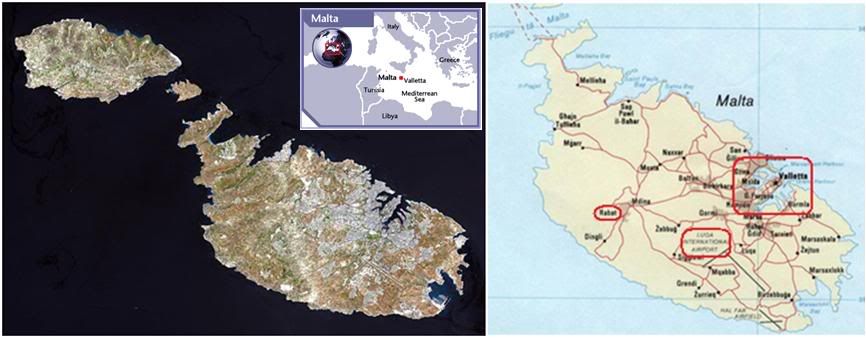

 Upper left, satellite photo of Malta and Gozo, the other main island. Center, Valletta skyline. Map shows location of Rabat, Luja airport, and Greater Valletta, where Kalkara and Floriana are located. Above left is the waterfront at the Valletta Grand Harbor, where the Mass will be held.
Upper left, satellite photo of Malta and Gozo, the other main island. Center, Valletta skyline. Map shows location of Rabat, Luja airport, and Greater Valletta, where Kalkara and Floriana are located. Above left is the waterfront at the Valletta Grand Harbor, where the Mass will be held.
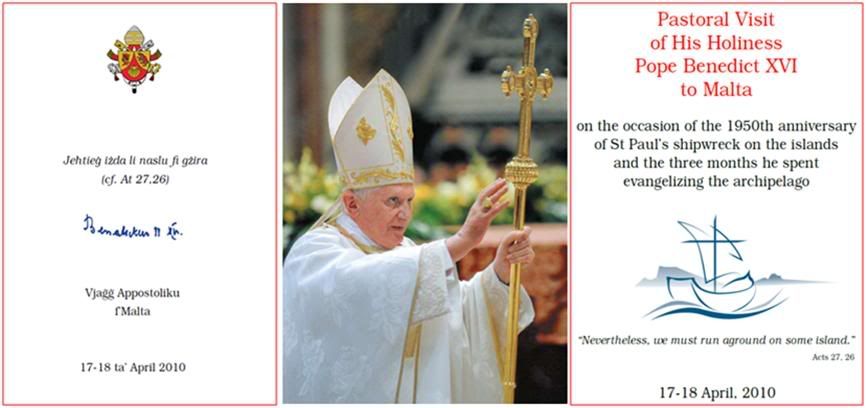
[Modificato da TERESA BENEDETTA 18/04/2010 03:21] |
| |
 17/04/2010 18:37 17/04/2010 18:37 |
|
| | | OFFLINE | | Post: 19.955
Post: 2.596 | Registrato il: 28/08/2005
Registrato il: 20/01/2009 | Administratore | Utente Veteran | |
|
 The Pope's freedom
The Pope's freedom
to take the high road
by Lucetta Scaraffia
Translated from
the 4/17/10 issue of

Unlike what one may read in the newspapers today which, on the eve of the fifth anniversary of Benedict XVI's Pontificate, portray him as weak and beset on all sides, or as an aged theologian who does not understand today's world; unlike those who demand in writing on city walls or in the newspapers for him to resign - which is an unthinkable action - I am convinced that for Papa Ratzinger, this anniversary marks a moment of strength.
The accusations and polemics prove him right about the severity that he has always shown with regard to sexual abuse of minors by priests, about his intransigence against the evil it represents, which he himself did not fail to denounce before he became Pope in clear and unprecedentedly forceful terms.
This critical time is a defeat for those who have always claimed that silence serves to protect the Church, who believe that accepting evil is inevitable with human beings, for those who continue to play blind.
The storm will bring about cleansing in the ranks of the Church, break up internal conniving [I am not sure about that at all!] and help the Pope to build that community of 'angels' that he described a few days ago, knowing well he was expressing a hope that is humanly impossible but that the Church must set a high standard to aspire for in order for teh People of God to move forward as better Christians.
The storm will allow him, above all, to go forward free, without that heavy burden of sin and silence that had surrounded the issue of priestly offenses against the young. Free along the road of openness that he initiated in the Church - a difficult road and an uphill climb but for the continuing betterment of the clergy as well as the faithful.
In his apostolate, the Pope seems to be demanding a little more and raising the bar a little more each time - not content with the crowds who applaud him in St. Peter's Square nor that his words are picked up the various organs of information. [Not always, and hardly in a satisfactory way, because they get to pick and choose only what is useful for their ends!]
In fact, he really seems not to care what the media say about him - and perhaps, this is added aggravation for them - while it is clear that what is important to him is to lead the Church forward towards continuing spiritual purification.
It is exclusively for that reason that he says what he says, explaining the sacred texts to the faithful - and at this level, his gentle, profound and ever attentive voice attains eloquence.
In essence, Benedict XVI is interested only in doing his job as Pope well, which means being the spiritual guide of the world's Catholics.
This is what provokes the secular world and the powerful movers in politics and the mass media: the fact that he so evidently considers them irrelevant to his demanding duty to meditate and explain the Word of God.
"He is silent, he is not answering us" - they continue to protest, even as they do not listen to what he says, or do not understand that there is always a response to events in everything in says, except that he elevates his response to a higher level.
In a society in which vulgarization always triumphs, the easiest explanation that the media resort to is also the most truly vulgar and coarse - that the Pope represents an anomaly that is insupportable for most people.
His strength is in being able to move along paths different from the
'world', off the beaten path. And to do this, he has to be genuinely strong, he must see clearly as he always does exactly what is happening, and above all, he must do this by himself.
Benedict XVI has the intellectual capacity and the spiritual and- psychological strength for all this. Only thus is he able to shed light, to blaze the trail for a free and continually purifying Church, as he has been doing and will continue to do.
One reads about Catholics who are leaving the Church because of the current 'revelations' on sex abuses by priests. [Media soap opera plotting, as usual! Those who do leave have merely been looking for a pretext to finally do so - and from what I read, reports of such 'mass exodus' have only come from Germany, where those who disavow membership in any church do not have to pay a church tax. So who is media kidding here?]
On the contrary, this is the time to join the Church, to bet on the reality that Jesus never abandons his Church and that evil shall not prevail. For this, we have Pope Benedict to thank.
Scaraffia makes very good points, but one somehow expects a more powerful statement from the pages of the Pope's own newspaper, which has a very obvious lack of eloquent editorialists... And even Fr. Lombardi, whose last few editorials for Vatican Radio have been significant, falls very flat in his brief editorial this week 'summing up' the five years of Benedict XVI's Pontificate. I will post it as soon as it's translated.
[Modificato da TERESA BENEDETTA 17/04/2010 18:37] |
| |
 17/04/2010 18:53 17/04/2010 18:53 |
|
| | | OFFLINE | | Post: 19.956
Post: 2.597 | Registrato il: 28/08/2005
Registrato il: 20/01/2009 | Administratore | Utente Veteran | |
|

 Pope Benedict starts
Pope Benedict starts
26-hour visit to Malta

April 17, 2010
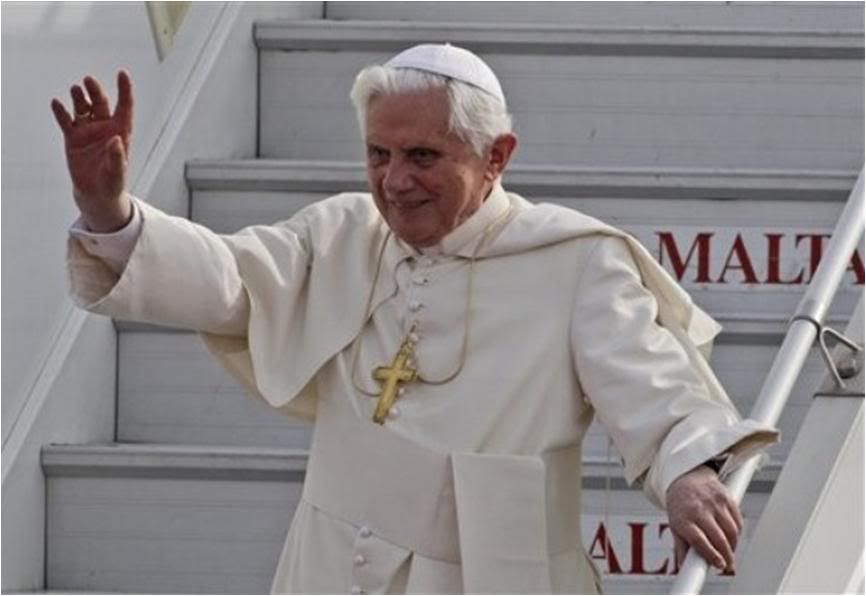
“ Jien kuntent ħafna li ninsab fostkom! [I am delighted to be here with you!]” were the first words, in Maltese, pronounced Pope Benedict XVI on Maltese soil during his short visit to the country.
He landed at the Malta International Airport as scheduled at 1650 CEST Saturday and was welcomed by the highest Maltese authorities, including the President and Mrs Abela, the Prime Minister and Mrs Gonzi, the Cabinet, members of the diplomatic corps, the Archbishop of Malta and the Bishop of Gozo.
The President and the Pope then walked on a red carpet to a dais with the President where they accorded a salute by the Armed Forces of Malta (AFM) Band, which will played the Vatican anthem and the Maltese national anthem.
“It gives me great joy to be here in Malta with you today. I come among you as a pilgrim to worship the Lord and to praise him for the wonders he has worked here. I come also as the Successor of Saint Peter to confirm you in the faith (cf. Lk 22:32) and to join you in prayer to the one living and true God, in the company of all the Saints, including the great Apostle of Malta, Saint Paul. Though my visit to your country is short, I pray that it will bear much fruit,” Pope Benedict said.
He mentioned the geo-political role Malta played in the past, especially the defense of Christianity.
“Indeed, Malta has much to contribute to questions as diverse as tolerance, reciprocity, immigration, and other issues crucial to the future of this continent. Your Nation should continue to stand up for the indissolubility of marriage as a natural institution as well as a sacramental one, and for the true nature of the family, just as it does for the sacredness of human life from conception to natural death and for the proper respect owed to religious freedom in ways that bring authentic integral development to individuals and society.
“Malta also has close links to the near East, not only in cultural and religious terms, but even linguistically. Allow me to encourage you to put this ensemble of skills and strengths to ever greater use so as to serve as a bridge of understanding between the peoples, cultures and religions which surround the Mediterranean. Much has still to be done to build relationships of genuine trust and fruitful dialogue, and Malta is well placed to hold out the hand of friendship to her neighbours to north and south, to east and west.
“I look forward to praying with you during my time in Malta and I wish, as a father and as a brother, to assure you of my affection for you and my eagerness to share this time with you in faith and friendship. With these thoughts, I entrust all of you to the protection of Our Lady of Ta’ Pinu and your father in the faith, the great Apostle Paul.
“ Il-Mulej ibierek lill-poplu kollu ta’ Malta u ta’ Għawdex! [God bless all the people of Malta and Gozo!],” the Pope said to conclude his speech.
Pope Benedict spoke after the introductory speech by the President of Malta Dr George Abela, who welcomed the Pope in the Island of St. Paul.
In his speech the President referred to what he sees as a war between christianity and secularism in Europe.
“Today, we face the wave of secularism which has as its starting point the strict separation of Church and State: a laicist model advocating that the State should be strictly separate from religion which is conceived as belonging exclusively to the private domain. This profane character which has developed in some European States is driving people to be laicist or even anti-Christian. However, as we all know or as we all should know, the moral foundations of a society as a whole, comprising believers, agnostics or atheists, are better served not with the falling away from religion but with the reinvigoration of the moral consciousness of the State.”
He then referred to what he sees as the role of Malta in this situation, with Malta’s own peculiar characteristics.
“Holy Father, we are proud as a nation to have inherited a Christian heritage which is at the core of our historical identity, even though we are not a confessional state. We too are experiencing, like all the rest of Europe, the phenomenon of multiculturalism, but this does not mean that we have to renounce to the beliefs which are our own. We still cherish a code of values, nourished by our Faith, such as the cardinal value of marriage and the family. We acknowledge that our Maltese family is undergoing rapid social changes and challenges, greatly influenced by current Western-world lifestyles and the ever-increasing secularization of the Maltese society. But the majority of our people still believe in monogamous marriage, based on the relationship between a man and a woman, open to the procreation of children, and consequently to the formation of a family as the bedrock of our nation.
“Holy Father, I am proud to say that all this forms part of our national identity and heritage. Your predecessor, the Venerable Pope John Paul II, during His visit in Malta on the 27th of May 1990 had exhorted us by proclaiming that: “Malta is called to contribute to the spiritual unity of the old Continent by offering her treasures of Christian faith and values. Europe needs Malta’s faithful witness too”.
“This is what we promise You today, that we continue upholding these values and our Faith which seemingly started off by mere chance but which we now cherish by our own choice as our firm belief. In the meantime, Holy Father, rest assured that we are welcoming You, as the successor of St. Peter, with extraordinary hospitality, “bi tjubija liema bħala” as our ancestors did with St.Paul.” concluded President Abela.
Following the arrival ceremony the Pope leaves the airport in his Popemobil to proceed to Valletta. On the way he passes through Luqa, Marsa, Blata l-Bajda, Floriana and into Valletta through City Gate. On Saturday evening he will unveil a plaque at the President’s Palace and salute the crowd in front of the Palace, especially thousands of children who will sing him a ‘happy birthday’ on the occasion of his birthday. He turned 83 on Friday.
Later on Saturday he will visit St. Paul’s Grotto in Rabat. He will spend the night at the Apostolic Nunciature in Rabat.
See how informative the local report was compared to this prefabricated story by the AP that says nothing about the arrival itself, but it does refer to the Pope's inflight remarks...
Pope arrives in Malta
by VICTOR L. SIMPSON

VALLETTA, Malta, April 17 (AP) — Pope Benedict XVI on Saturday began a brief pilgrimage to this heavily Catholic island, saying "our sins" have wounded the Church in Malta, where victims of sex abuse by clergy hope to meet with him.
The Pontiff is making his first foreign trip since the scandals erupted.
The overnight trip was long planned as a pilgrimage among the faithful to commemorate the 1,950th anniversary of St. Paul's shipwreck, but it has since raised [media] expectations that the Pope would make a strong gesture to repair the damage of the worldwide abuse scandal.
Benedict did not take questions from reporters aboard the chartered Alitalia plane, which flew him from Rome to this Mediterranean archipelago.
Instead, in the five minutes in which he spoke to the media, he made what the Vatican called "reflections and considerations" on written questions submitted in advance by some media.
Speaking about the church on the island, Benedict said that "Christ loves Malta, even if the body (of the church) is wounded by our sins." But he made no direct references to the scandals rocking his papacy after allegations of wrongful handling of sex abuse cases have touched the pope himself.
Vatican spokesman the Rev. Federico Lombardi told reporters that the pope's remarks were "references" that could have "touched" on the scandals. [Did they really need Fr. Lombardi to explain that????]
The Pope's flight was one of the few to depart on Saturday from Leonardo da Vinci airport in Rome, where many flights were canceled because of the no-fly zone in northern Italy and much of Europe due to the eruption of Iceland's volcano.
The Pontiff, who turned 83 on Friday, sounded hoarse as he began the overnight trip on Malta. He flies back to Rome on Sunday evening.
On the island, 10 men who testified that they were sexually molested by priests at an orphanage here during the 1980s and 1990s have asked to meet with Benedict so what they call a "hurtful chapter" in their lives can be closed.
The Maltese men who have spoken up say they were abused by four priests at a Catholic home for boys, alleging that if they resisted sexual advances they would be asked to leave the home, which was their only shelter.
Lombardi earlier in the week declined to confirm the Pope would meet with victims on this trip but didn't rule it out. Benedict's previous meetings with abuse victims during trips to the United States and Australia in 2008 were not announced in advance.
A few days earlier Benedict made his first allusion to the scandal since he issued a letter to Irish Catholics on March 20, when he rebuked Irish bishops for "grave errors of judgment" in handling clerical sex abuse and ordered an investigation into the Irish church but did not mention any Vatican responsibility, as victims have demanded.
On Thursday, the Pope said the faithful must acknowledge "what is wrong in our lives" and repent. [It's something any Pope, any priest, would say whether there was a 'scandal' or not!]
Recently, the Maltese church announced it had received 84 allegations of child abuse allegedly involving 45 priests over the past decade. Local bishops have apologized for the abuse.
The influence of the Catholic Church on the island is heavily felt in the European Union nation. Abortion and divorce are prohibited.
Strikingly for such a Catholic country, billboards announcing the visit bearing a large photo of Benedict have been defaced over the past few days, with one giving the German-born pope a Hitler-like mustache. [You would think dozens of billboards wre defaced - why can't he say 'Three billboards were defaced...']
Tradition holds that St. Paul stayed three months on Malta after being shipwrecked on the way to Rome.
Earlier in the day, the Holy See's spokesman, the Rev. Federico Lombardi, told Vatican Radio that Benedict is forging ahead with his papacy on "a sure route." The Vatican will mark the fifth anniversary of his election on Monday.
[Modificato da TERESA BENEDETTA 17/04/2010 19:14] |
| |
 17/04/2010 21:51 17/04/2010 21:51 |
|
| | | OFFLINE | | Post: 19.957
Post: 2.598 | Registrato il: 28/08/2005
Registrato il: 20/01/2009 | Administratore | Utente Veteran | |
|

 The Pope enroute to Malta:
The Pope enroute to Malta:
'The Church is wounded by our sins'
By JOHN L. ALLEN JR.

April 17, 2010
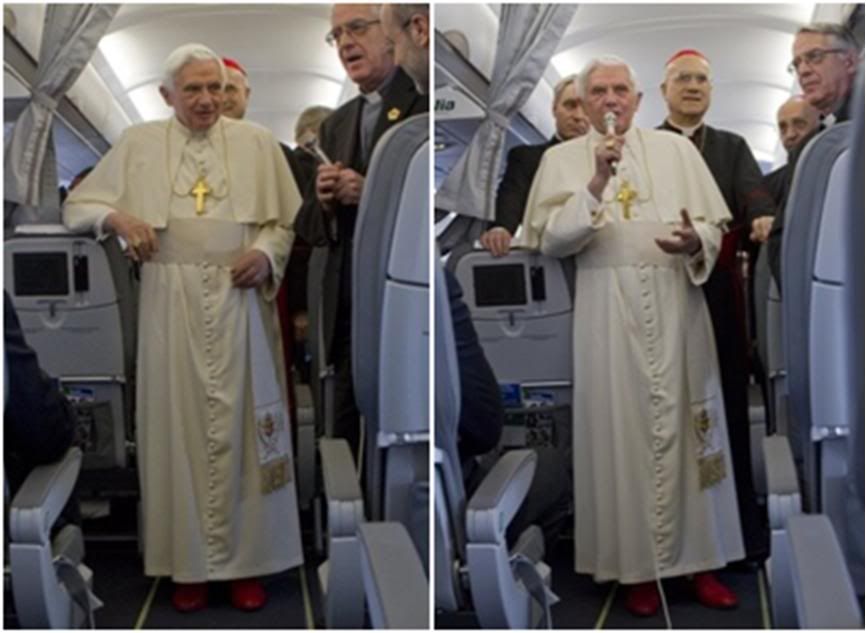
LUQA, MALTA - Pope Benedict XVI alluded to the sexual abuse crisis only briefly and indirectly during his short flight from Rome to Malta this afternoon, with a reference to how the church is “wounded by our sins,” but its gospel remains “the true force that purifies and heals.”
Benedict XVI is visiting Malta April 17-18, marking the 1,950th anniversary of St. Paul’s famous shipwreck on the small Mediterranean island described in the Acts of the Apostles. Like many parts of the Catholic world, Malta has recently been rocked by a local sex abuse scandal, and Benedict arrives facing questions about his own handling of sex abuse cases both in Germany and in the Vatican.
In another apparent reference to the crisis, the pope also picked up on the shipwreck theme, saying that Paul’s experience is a reminder that shipwrecks can be part of "God's project" and lead to “a new beginning in our life.”
Benedict also raised the issue of immigration, which is a core social concern in Malta, which shoulders a major share of the European burden for welcoming African immigrants.
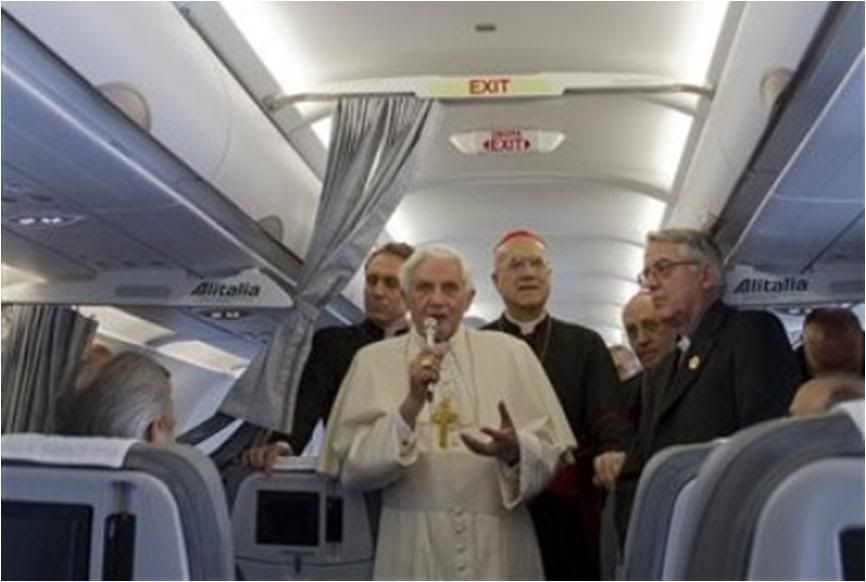
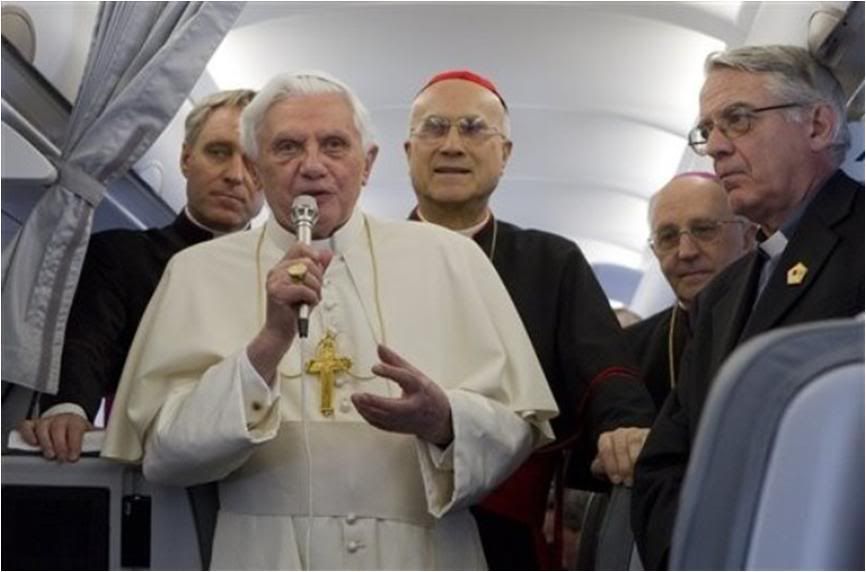
Vatican spokesperson Fr. Federico Lombardi had asked journalists to submit questions in advance of the trip for Benedict XVI, and said that the pope’s brief remarks this afternoon represented his “synthetic” response. Benedict spoke for roughly four minutes.
The following is a rush transcript of Pope Benedict’s remarks on the plane to Malta, which were delivered in Italian.
Lombardi:
Thank you Holy Father. We are very grateful to have you with us at the beginning of this trip. This way we can offer you good wishes for the two anniversaries in these days, that of yesterday, your birthday, and that of next Monday.
The Holy Father received the questions that some of you presented and which express the expectations that many have at the beginning of the trip. He has prepared a brief reflection on the basis of your expectations. We will not follow the process of other trips, with questions and answers and questions and answers. The Holy Father will give us his synthetic remarks. Thank you, Holy Father, and have a good trip.
Pope Benedict XVI:
Dear friends, good evening. Best wishes for a good trip, without this dark cloud that’s hanging over parts of Europe. [A reference to the clouds of volcanic ash that delayed or cancelled scores of flights in Europe today.]
So, why this trip to Malta? There are many reasons. First, St. Paul. The Pauline Year for the universal church has ended, but Malta is celebrating 1,950 years since the shipwreck, and this occasion once presents us with the figure of the Apostle to the Gentiles and his message which is still authentic and important for today.
I think one can synthesize the essential point in words he himself used at the end of the letter to the Galatians: ‘Faith expressed in charity.’ This is something important also today, that faith, a relationship with God, transforms itself into charity.
I also think the memory of the shipwreck says something to us. For Malta, the opportunity to have the faith was born with the shipwreck. We can also think about how the shipwrecks of life can be part of God’s project for us, and be useful for a new beginning in our life.
The second reason is that it makes me happy to be in the midst of a lively Church like the one in Malta, with a deep sense of tradition still today, full of faith, in the middle of our world and responding to the challenges of our times.
I know that Malta loves Christ, and loves his church which is his body, even if this body is wounded by our sins - it still loves this Church and its Gospel, which is the true force that purifies and heals.
The third point is that Malta is a place where waves of refugees arrive from Africa and knock on the doors of Europe. This is a great problem of our time, and naturally it can’t be resolved just by the island of Malta.
All of us have to respond to this challenge, first of all so that people can live a dignified life in their own land, and on the other hand so that these refugees can also find space for a dignified life here.
It means responding to a great challenge of our time, and Malta reminds us of these problems. It also reminds us, as you know, of the force of charity, which allows us to respond well to these challenges. Thank you.
Lombardi:
Thank you, Holiness, and have a good trip. We’ll accompany you with our work and our information.
[Modificato da TERESA BENEDETTA 17/04/2010 22:49] |
| |
 17/04/2010 21:51 17/04/2010 21:51 |
|
| | | OFFLINE | | Post: 19.958
Post: 2.599 | Registrato il: 28/08/2005
Registrato il: 20/01/2009 | Administratore | Utente Veteran | |
|

 THE POPE IN MALTA:
THE POPE IN MALTA:
AIRPORT WELCOME
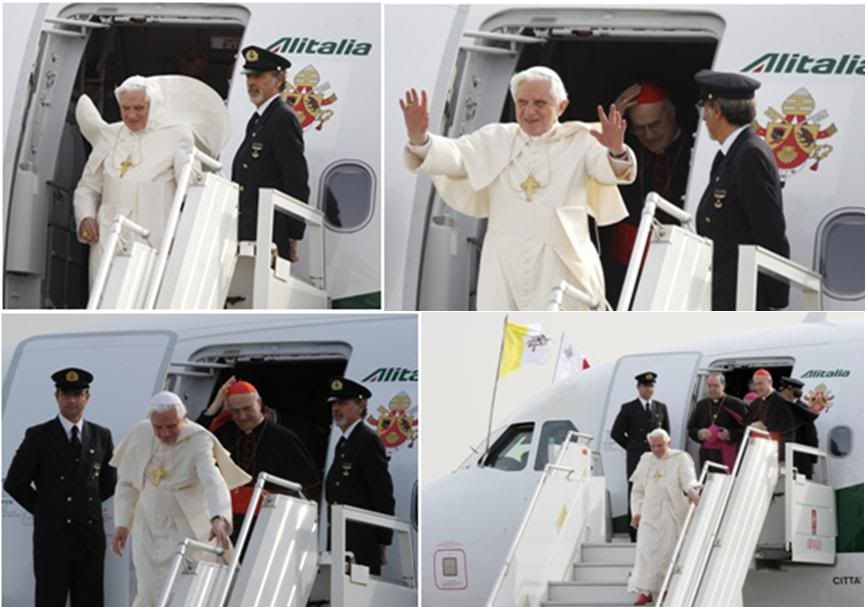
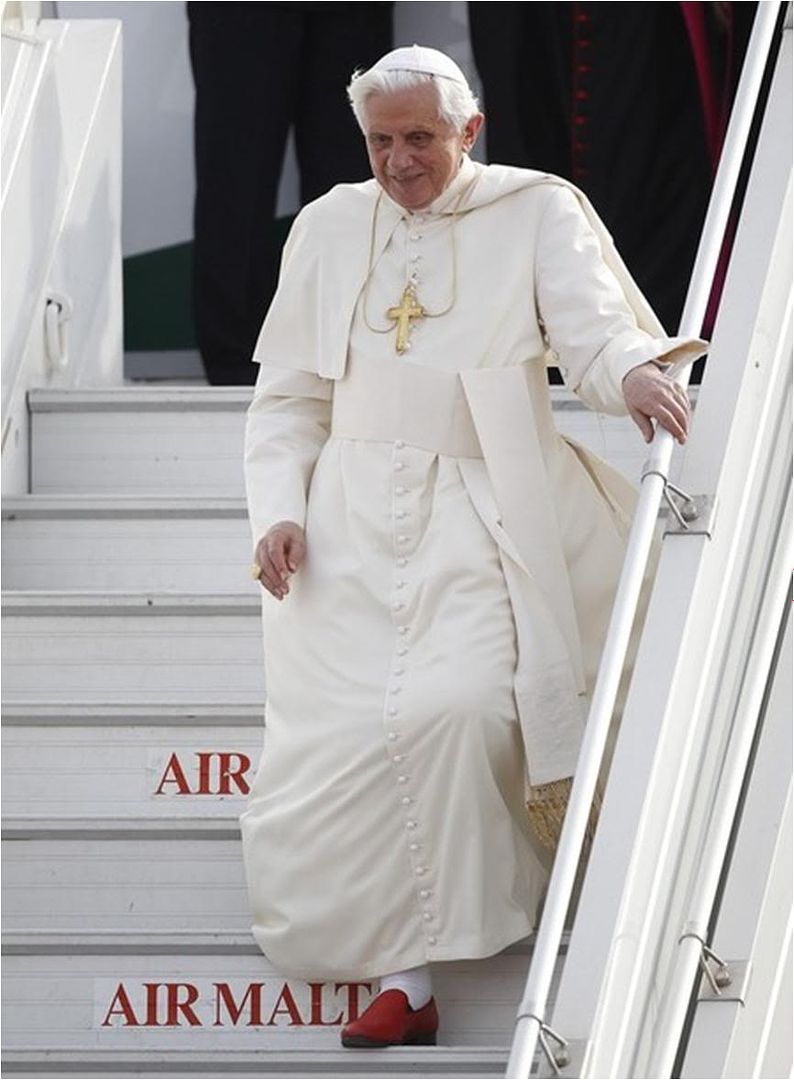
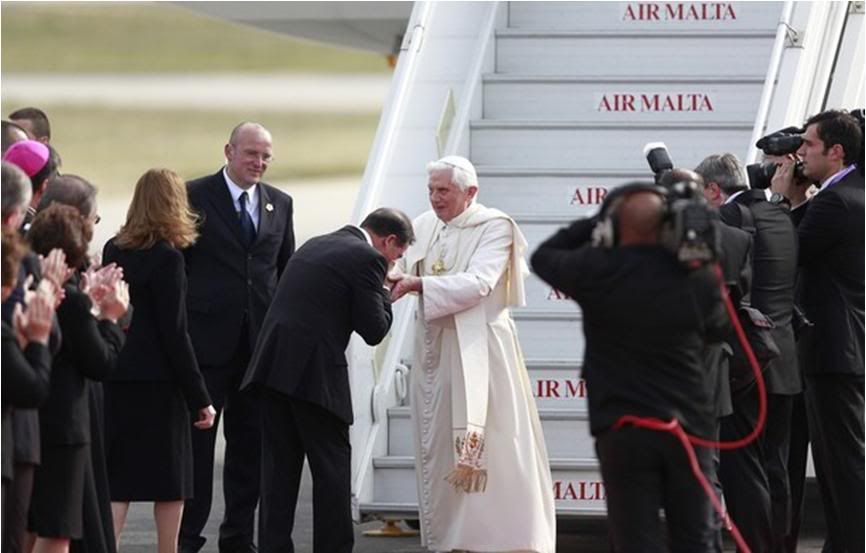
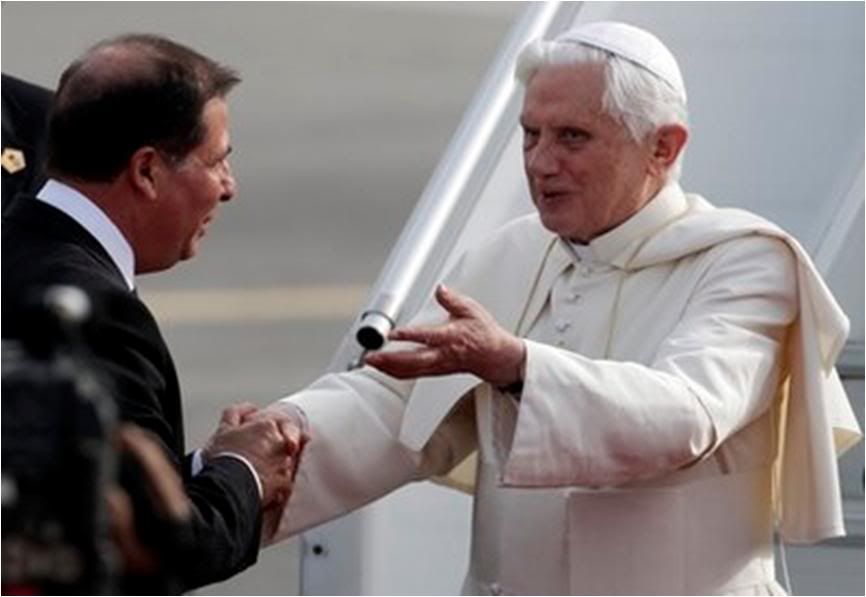
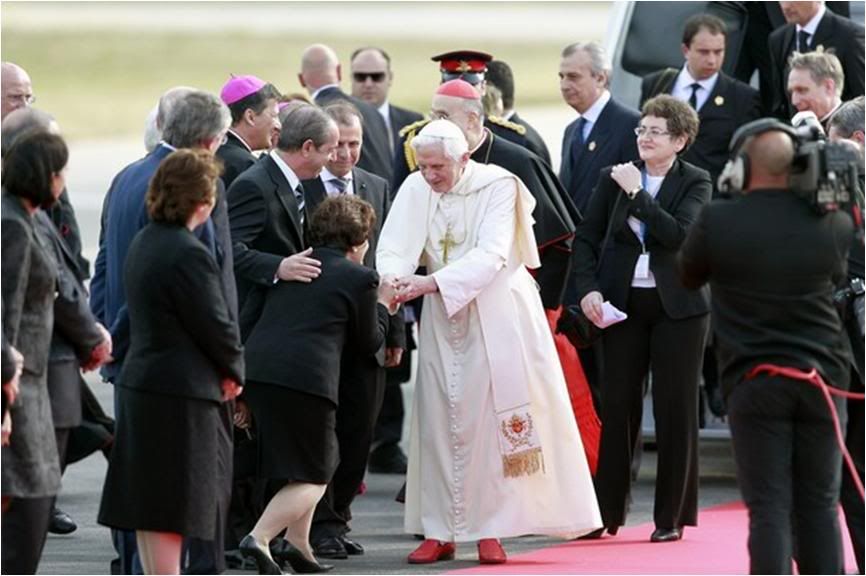
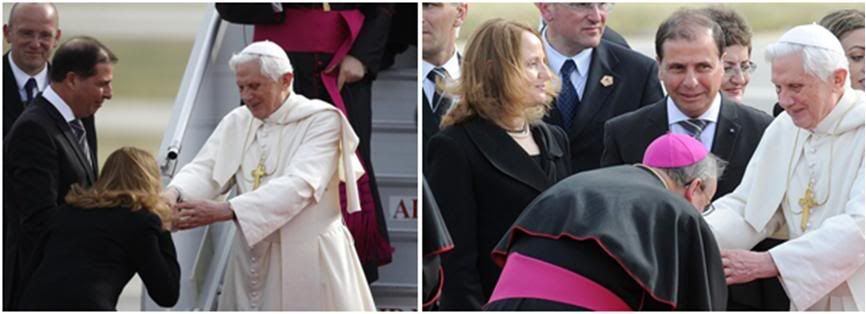
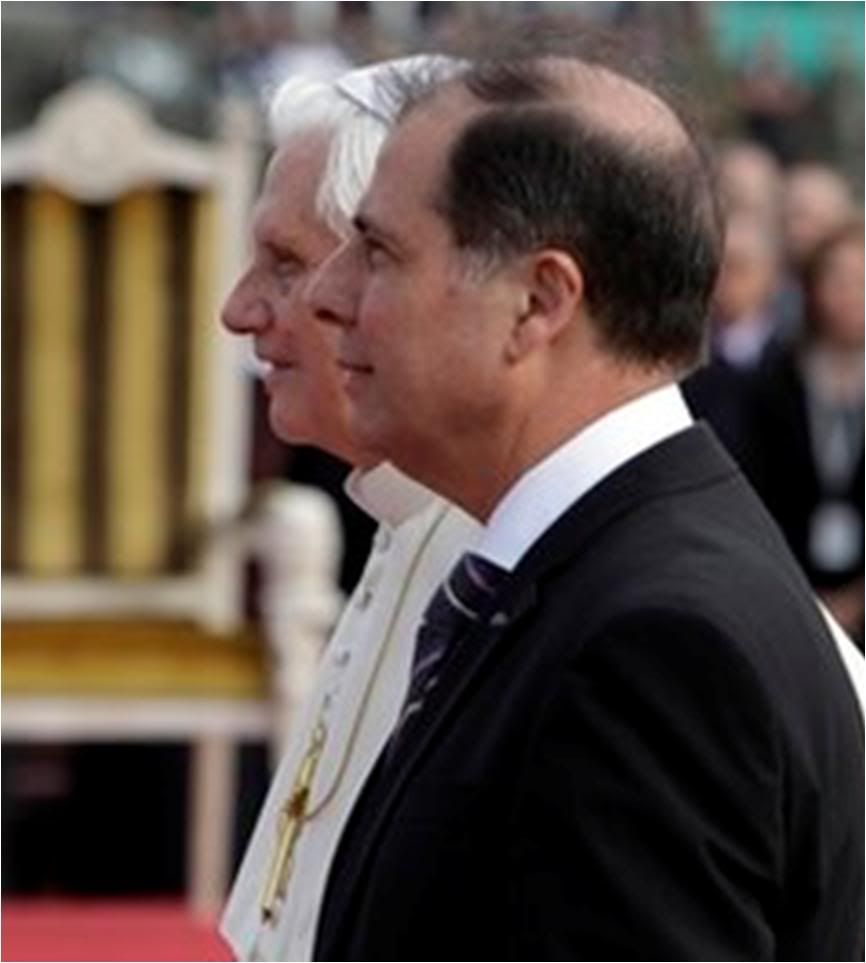
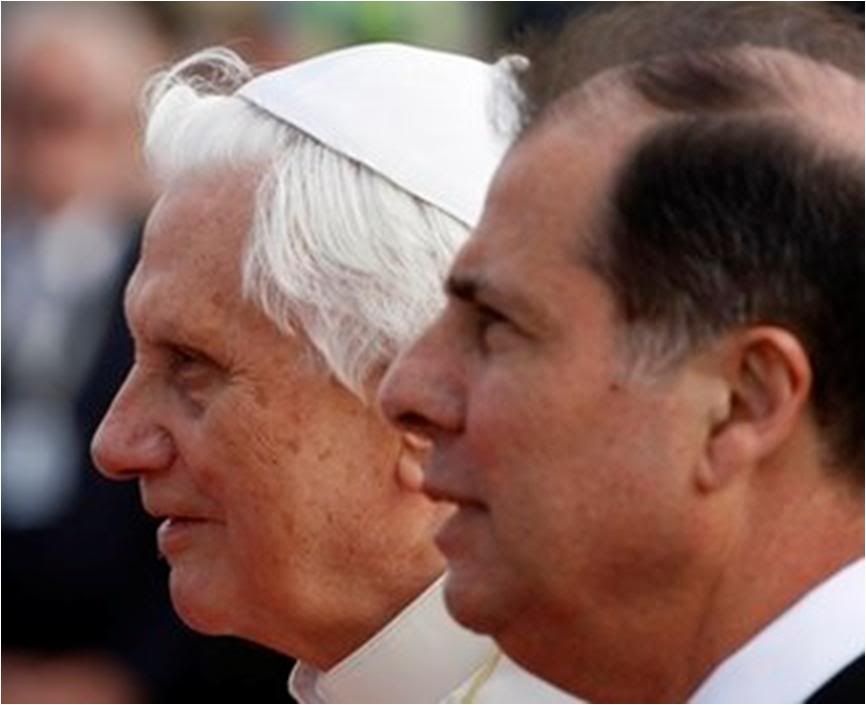
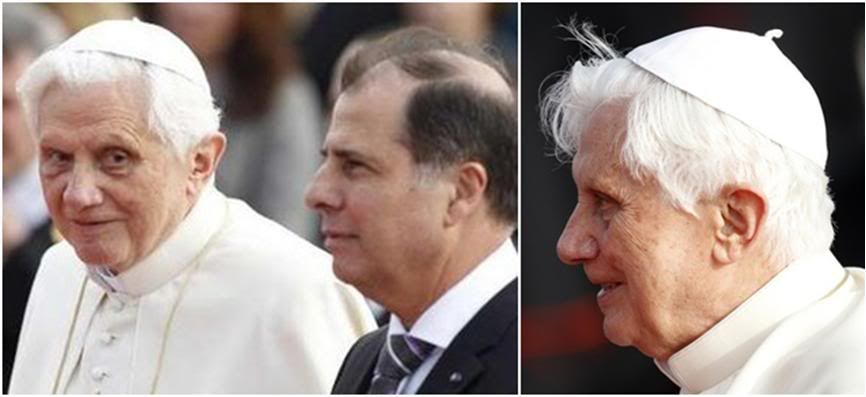
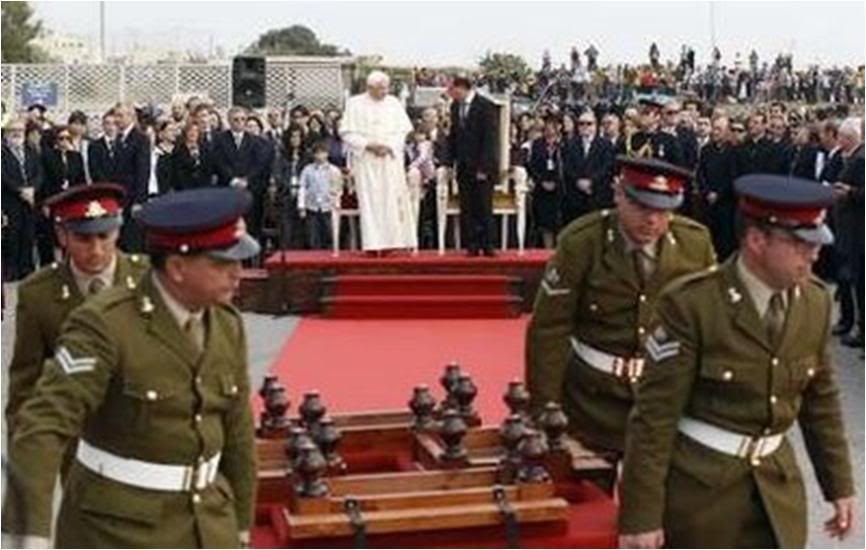
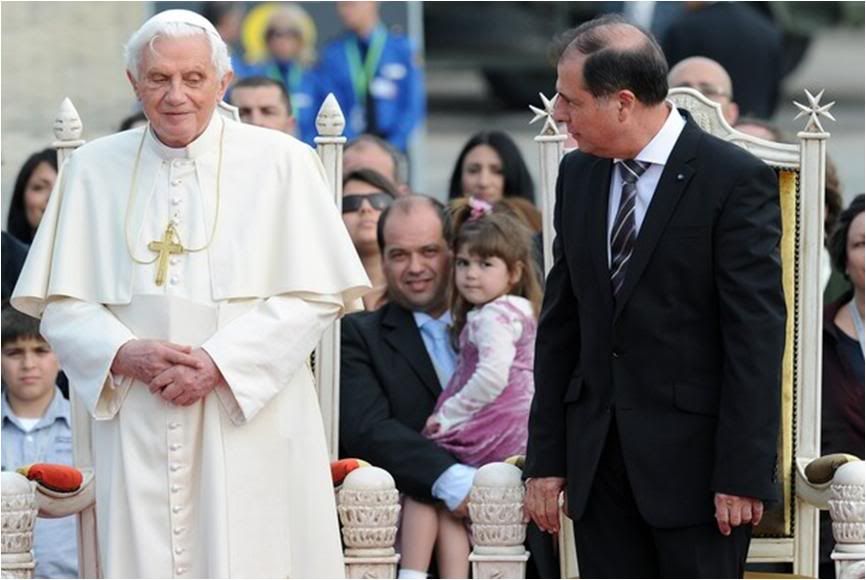

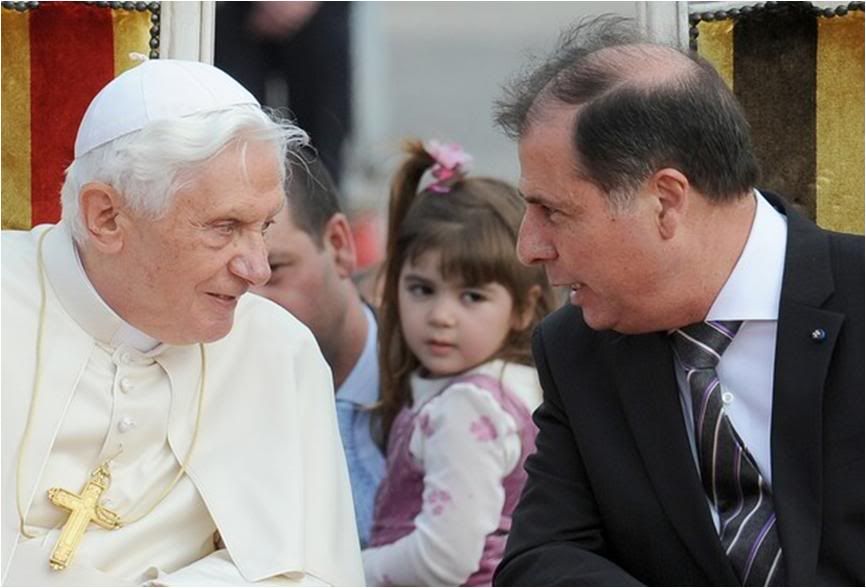
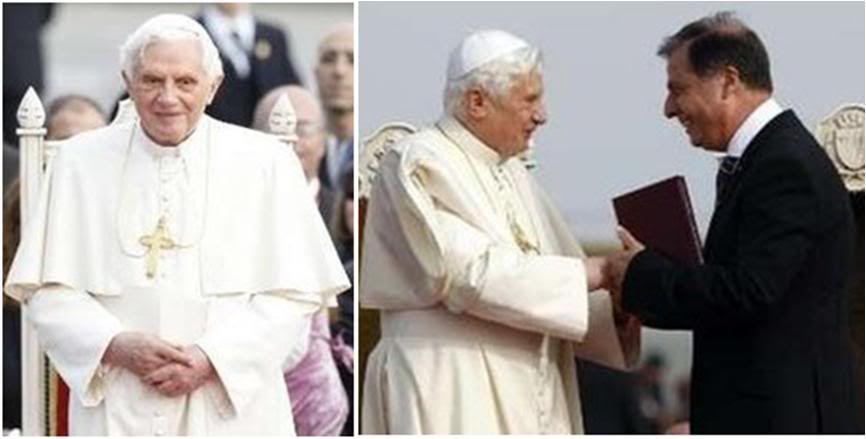
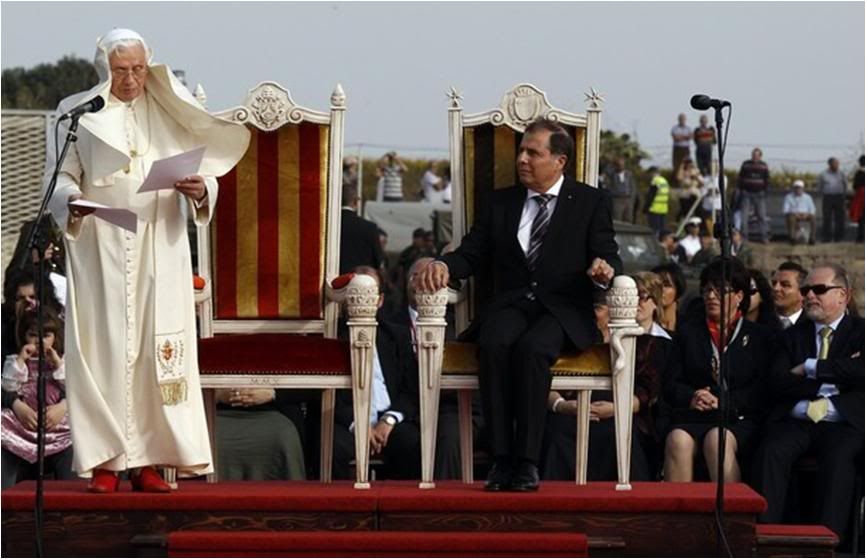
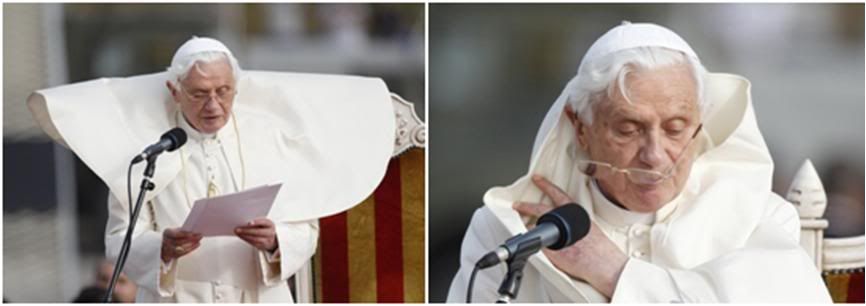 Here is the full text of the Holy Father's arrival statement delivered in English except for three sentences in Maltese:
Here is the full text of the Holy Father's arrival statement delivered in English except for three sentences in Maltese:
Mr President,
Dear Brother Bishops,
Distinguished Authorities,
Ladies and Gentlemen,
Jien kuntent ħafna li ninsab fostkom![1]
It gives me great joy to be here in Malta with you today. I come among you as a pilgrim to worship the Lord and to praise him for the wonders he has worked here. I come also as the Successor of Saint Peter to confirm you in the faith (cf. Lk 22:32) and to join you in prayer to the one living and true God, in the company of all the Saints, including the great Apostle of Malta, Saint Paul. Though my visit to your country is short, I pray that it will bear much fruit.
I am grateful, Mr President, for the kind words with which you have greeted me in your own name and on behalf of the Maltese people. I thank you for your invitation and for the hard work that you and the Government have done in order to prepare for my visit. I thank the Prime Minister, the civil and military authorities, the members of the Diplomatic Corps and everyone present, for honouring this occasion by your presence and for your cordial welcome.
I greet in a special way Archbishop Paul Cremona, Bishop Mario Grech and Auxiliary Bishop Annetto Depasquale, as well as the other Bishops present. In greeting you, I wish to express my affection for the priests, deacons, men and women Religious and all the lay faithful entrusted to your pastoral care.
The occasion of my visit to these islands is the nineteen hundred and fiftieth anniversary of Saint Paul’s shipwreck off the island of Malta. Saint Luke describes this event in the Acts of the Apostles, and it is from his account that you have chosen the theme of this visit: “Jeħtieg iżda li naslu fi gżira”[2] (Acts 27:26).
Some might consider Saint Paul’s arrival in Malta by means of a humanly unforeseen event to be a mere accident of history. The eyes of faith, however, enable us to recognize here the workings of divine Providence.
Malta, in fact, has been at the crossroads of many of the great events and cultural exchanges in European and Mediterranean history, right up to our own times. These islands have played a key role in the political, religious and cultural development of Europe, the Near East, and North Africa.
To these shores, then, in the mysterious designs of God, the Gospel was brought by Saint Paul and the early followers of Christ. Their missionary work has borne much fruit over the centuries, contributing in innumerable ways to shaping Malta’s rich and noble culture.
On account of their geographical position, these islands have been of great strategic importance on more than one occasion, even in recent times: indeed, the George Cross upon your national flag proudly testifies to your people’s great courage during the dark days of the last world war.
Likewise, the fortifications that feature so prominently in the island’s architecture speak of earlier struggles, when Malta contributed so much to the defence of Christianity by land and by sea. You continue to play a valuable role in the ongoing debates on European identity, culture and policy.
At the same time, I am pleased to note your Government’s commitment to humanitarian projects further afield, especially in Africa. It is greatly to be hoped that this will serve to promote the welfare of those less fortunate than yourselves, as an expression of genuine Christian charity.
Indeed, Malta has much to contribute to questions as diverse as tolerance, reciprocity, immigration, and other issues crucial to the future of this continent.
Your Nation should continue to stand up for the indissolubility of marriage as a natural institution as well as a sacramental one, and for the true nature of the family, just as it does for the sacredness of human life from conception to natural death and for the proper respect owed to religious freedom in ways that bring authentic integral development to individuals and society.
Malta also has close links to the near East, not only in cultural and religious terms, but even linguistically. Allow me to encourage you to put this ensemble of skills and strengths to ever greater use so as to serve as a bridge of understanding between the peoples, cultures and religions which surround the Mediterranean.
Much has still to be done to build relationships of genuine trust and fruitful dialogue, and Malta is well placed to hold out the hand of friendship to her neighbours to north and south, to east and west.
The Maltese people, enlightened for almost two millennia by the teachings of the Gospel and continually fortified by their Christian roots, are rightly proud of the indispensable role that the Catholic faith has played in their nation’s development.
The beauty of our faith is expressed in various and complementary ways here, not least in the lives of holiness which have led Maltese to give of themselves for the good of others.
Among these we must include Dun Ġorġ Preca, whom I was pleased to canonize just three years ago (3 June, 2007). I invite all of you to invoke his intercession for the spiritual fruitfulness of this, my first pastoral visit among you.
I look forward to praying with you during my time in Malta and I wish, as a father and as a brother, to assure you of my affection for you and my eagerness to share this time with you in faith and friendship. With these thoughts, I entrust all of you to the protection of Our Lady of Ta’ Pinu and your father in the faith, the great Apostle Paul.
Il-Mulej ibierek lill-poplu kollu ta’ Malta u ta’ Għawdex![3]
[1] I am delighted to be here with you!
[2] “But we are to be stranded on some island” (Acts 27:26).
[3] God bless all the people of Malta and Gozo!
From the airport, the Pope proceeded by Popemobile to the Presidential Palace in Valletta for a courtesy visit with President Abela.
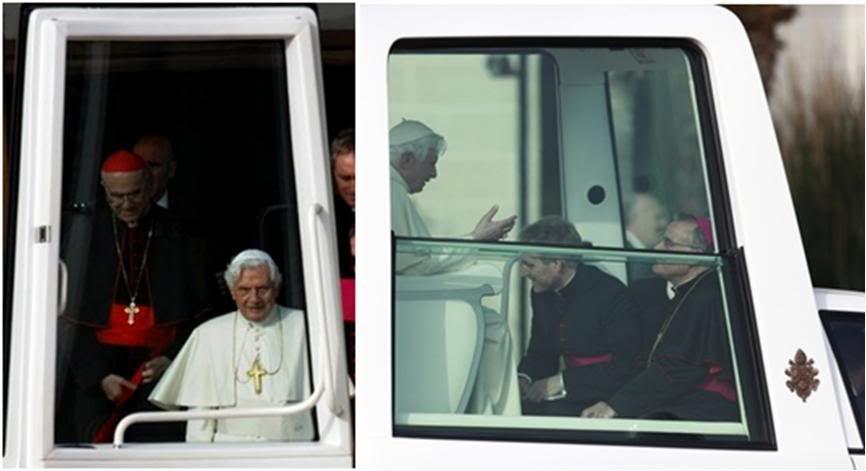
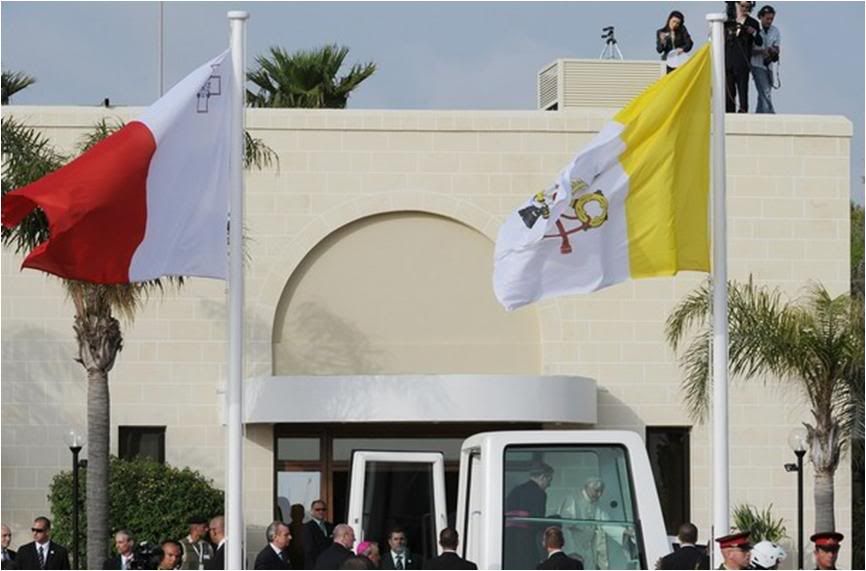
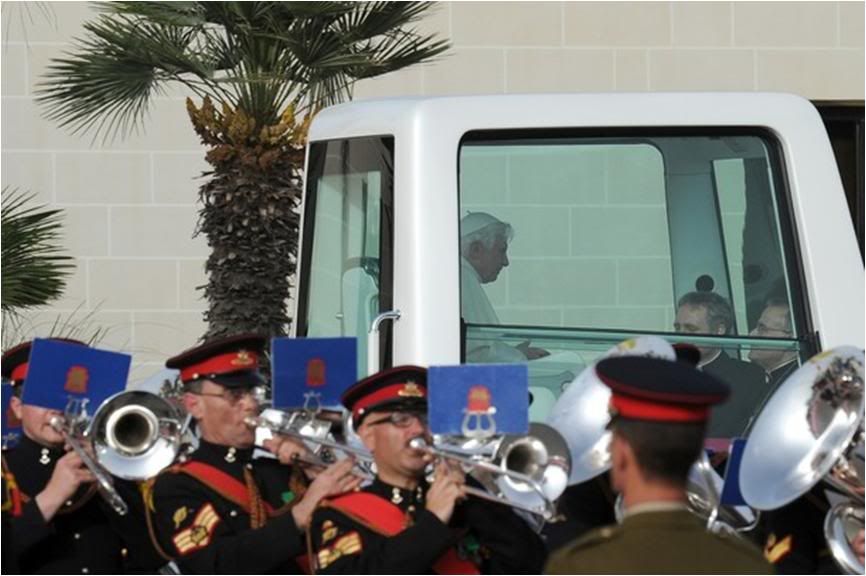
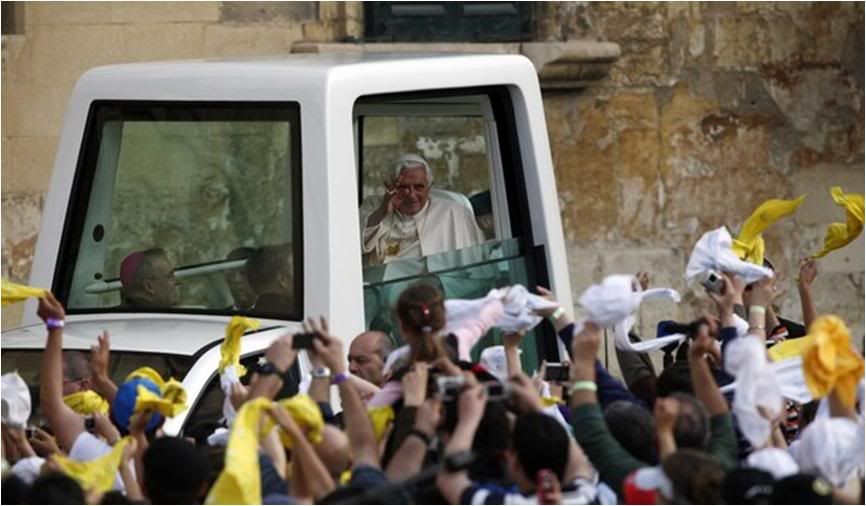
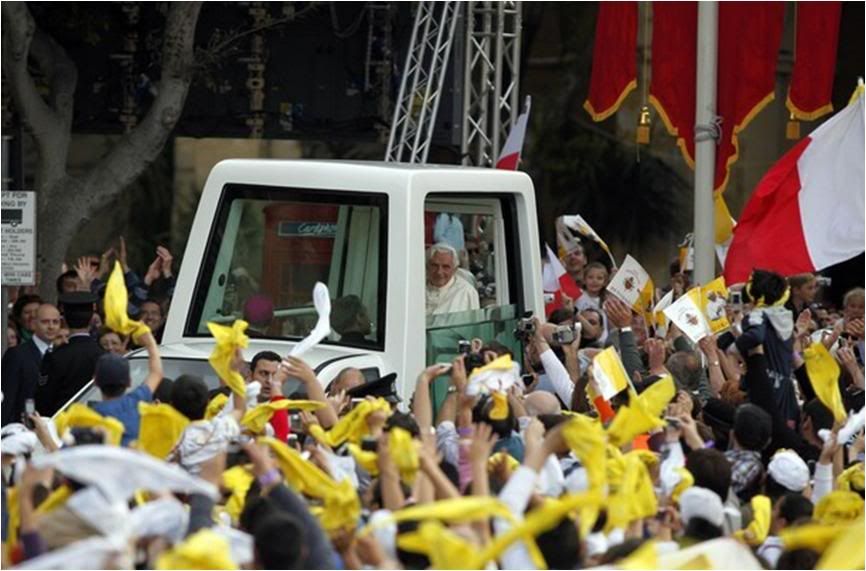
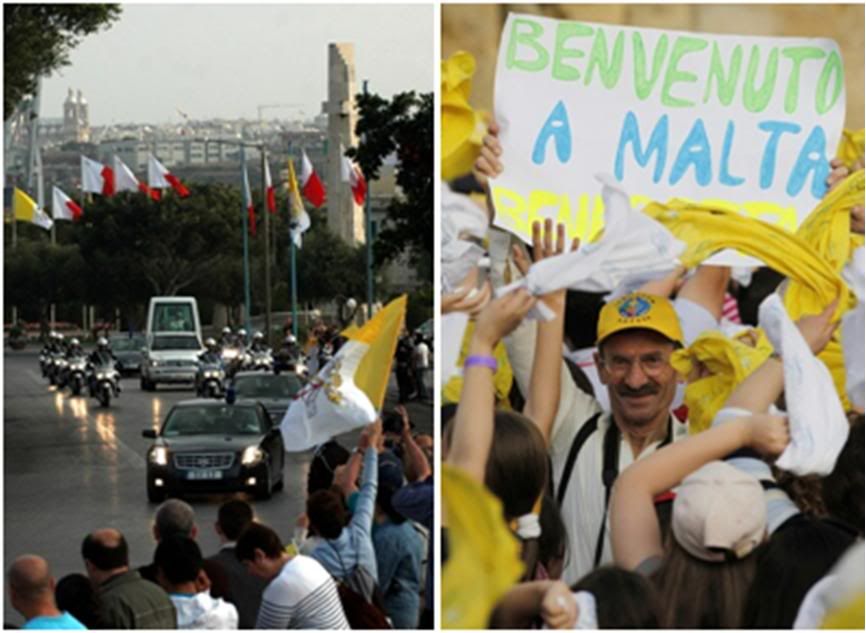
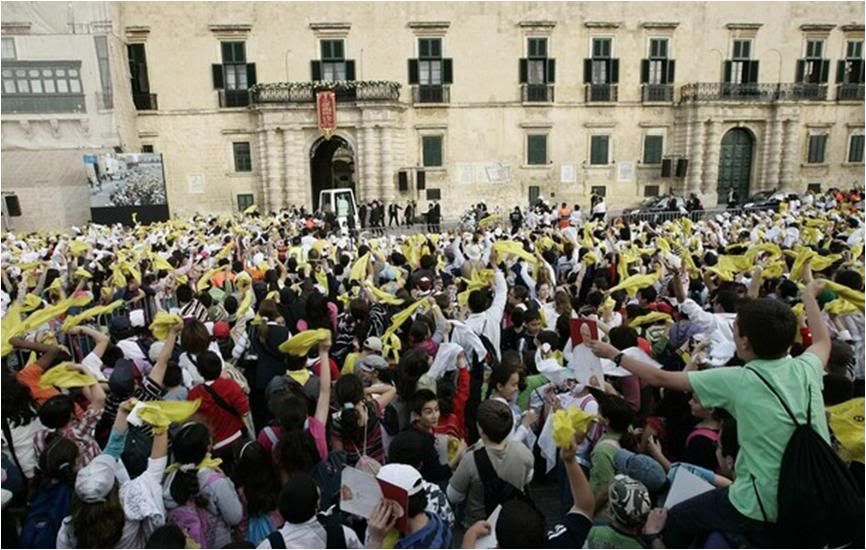
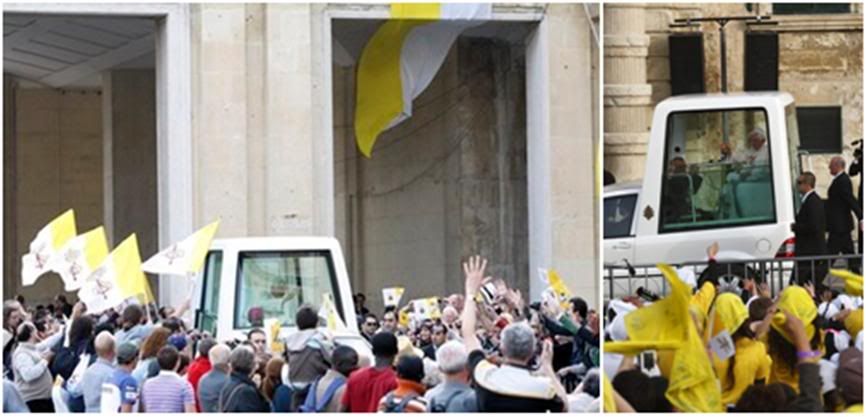
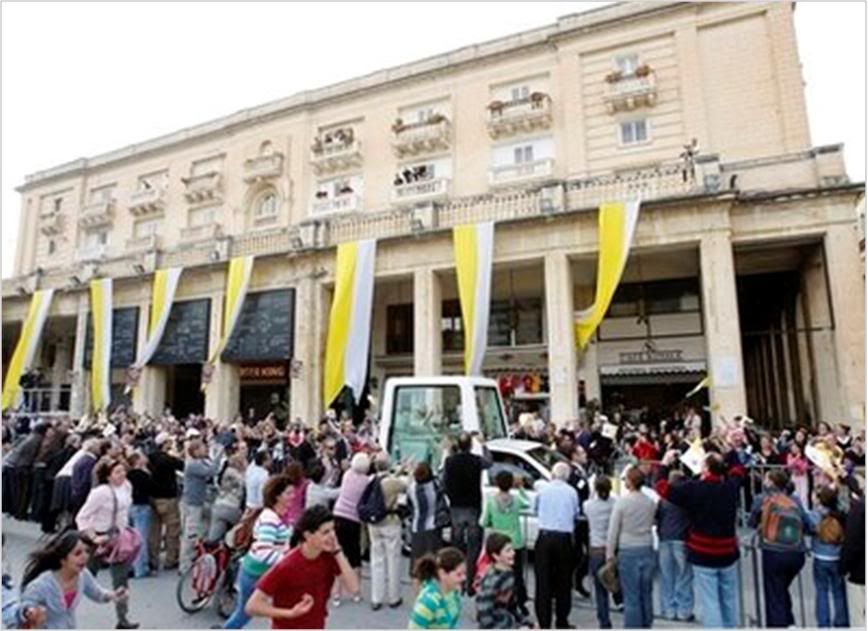
[Modificato da TERESA BENEDETTA 18/04/2010 00:10] |
| |
 17/04/2010 23:16 17/04/2010 23:16 |
|
| | | OFFLINE | | Post: 19.959
Post: 2.600 | Registrato il: 28/08/2005
Registrato il: 20/01/2009 | Administratore | Utente Veteran | |
|
 I hate to interject this messy note, but Cardinal Dario Castrillon Hoyos should probably have kept quiet when asked about this issue today... Because look at how AP is reporting it!
'Cardinal: Late Pope backed priest-shielding'
I hate to interject this messy note, but Cardinal Dario Castrillon Hoyos should probably have kept quiet when asked about this issue today... Because look at how AP is reporting it!
'Cardinal: Late Pope backed priest-shielding'

MADRID, April 17 (AP) - Spanish media are quoting a retired Vatican cardinal as saying the late Pope John Paul II backed his letter congratulating a French bishop for risking jail for shielding a priest convicted of raping minors.
Web sites of La Verdad and other Spanish newspapers reported Saturday that Cardinal Dario Castrillon Hoyos, 80, told an audience at a Catholic university in Murcia, Spain, on Friday that he consulted with John Paul and showed him the letter. He claimed the Pontiff authorized him to send the letter to bishops worldwide. {I have no time to check out the Spanish sites now, but something is not right. Castrillon was Prefect of the Congregation for the Clergy at the time - I am not sure he had any standing to send letters to 'bishops worldwide', who are overseen by a separate Congregation, as opposed to a personal letter from him to an individual bishop.]
La Verdad said the audience at Universidad Catolica de Murcia applauded the cardinal's remarks.
The 2001 letter praised Bishop Pierre Pican, who received a three-month suspended prison sentence for concealing knowledge about the clergyman, the Rev. Rene Bissey, the media said. The priest himself was sentenced to 18 years for sexually abusing 11 minors.
Asked about the Spanish media reports on Saturday, Vatican spokesman the Rev. Federico Lombardi told reporters in Malta, where Pope Benedict XVI is visiting, that he would not comment on the retired Vatican cardinal's statement.
Lombardi said he would only repeat what he had said earlier, that before he became Pope Benedict, Archbishop Joseph Ratzinger had overseen the office that the Vatican was using to consolidate control of all clergy sex abuse cases.
[One would have thought someone in the Vatican could have done Cardinal Castrillon the courtesy of reaching him at the time Lombardi issued a statement that was clearly at the very least a public reproach to the cardinal - or, as the MSM put it, 'threw Castrillon under the bus'. When you think someone is straying, you reach out to them right away, not isolate them. If someone had taken the courtesy to call Castrillon, they might have helped him devise a better answer than to point the finger at a dead man who can no longer speak for himself!]
 Earlier today, news about the death of a cardinal...
Pope remembers Czech cardinal
Earlier today, news about the death of a cardinal...
Pope remembers Czech cardinal
with great emotion

Rome, Italy, Apr 17, 2010 (CNA/EWTN News) - Jesuit Cardinal Tomas Spidlik of the Czech Republic died on Friday evening in Rome at the age of 90. The prelate, who was remembered by the Holy Father affectionately on Saturday, leaves a legacy of publications and work to promoting unity between eastern and western Christians.
In his long life, the cardinal was a professor, theologian, writer and academic, who was also involved in radio. According to a biography from the Centro Aletti, a John Paul II inaugurated center founded within the Pontifical Oriental Institute to promote Christianity in Eastern Europe, Cardinal Spidlik had an extraordinary ability to engage an audience and made great steps to developing eastern Christian spirituality.
The "Centro," of which he formed a part, describes him as "one of the greatest experts of the spirituality of eastern Christianity today."
In a telegram to Superior General of the Jesuits on Saturday, Pope Benedict XVI expressed the "strong emotion" he felt upon learning of the cardinal's "pious departure."
It was "with profound gratitude," the Holy Father wrote, that he recalled the "solid faith, paternal affability and the intense cultural and ecclesial industriousness" of the late cardinal, especially regarding his great knowledge of eastern Christian spirituality.
Cardinal Spidlik was also remembered for his work in promoting cooperation between Christians and leaders from the East and West by Vatican Radio on Saturday morning. Their report underlined his work for a spiritually united Europe, the "two lungs" that John Paul II described as essential to the vitality of the Church.
The Holy See's radio station was particularly close to him, and he to it, as he had spent a half-century working with their Czech transmissions.
Just recently the Holy Father thanked the The cardinal for his legacy.
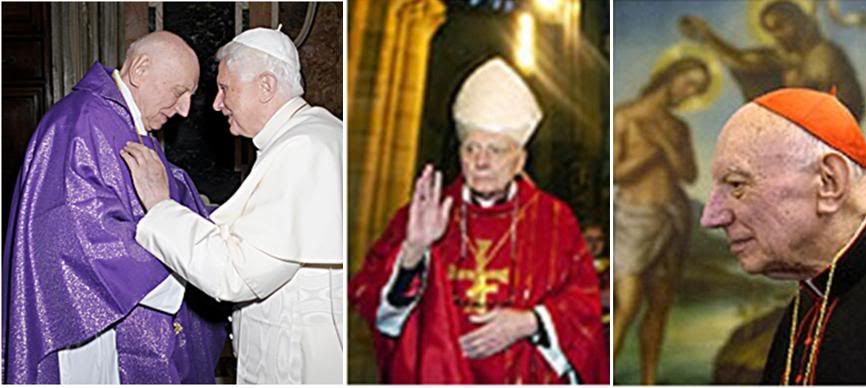
Exactly four months ago today, Pope Benedict XVI expressed his appreciation to Cardinal Spidlik personally during a Mass at the Redemptoris Mater chapel to celebrate his 90th birthday. In his homily, the Pope said that the cardinal's "long life and his singular walk of faith are testimony of how God guides whomever entrusts himself to Him."
Remembering the "rich" thought of the cardinal, the Pope praised the "ardor and deep conviction" with which he announced the centrality of the Triune God and man's communion with him through freedom and love.
He added that Cardinal Spidlik possessed a "vivacious and... original theological vision" which was able to bring eastern and western Christians together, “reciprocally exchanging their gifts."
The funeral ceremony for the cardinal will be held next Tuesday at St. Peter's Basilica. Dean of the College of Cardinals, Cardinal Angelo Sodano, will preside over the Mass together with other cardinals. Following the Eucharistic celebration, Pope Benedict XVI will make an address and officiate at the Ultima Commendatio and the Valedictio.
According to L'Osservatore Romano, Cardinal Spidlik leaves behind a bibliography of over 600 articles and 140 volumes.
One of the outstanding personalities of the Church in the Czech Republic today is Cardinal Thomas Spidlik, botn in Brno 90 years ago. A Jesuit, he was forced to work in the quarries under both the Nazis and the Communists. He became a priest at age 30 despite difficulties of all kinds.
A world-famous theologian who became known for his books on the spirituality of thE Oriental Churches, he lived and worked at the Centro Aletti in Rome with Fr. Marko Ivan Rupnik (artist of the mosaics in the Redemptoris Mater chapel and in the Padre Pio shrine in San Giovanni Rotondo).
For almost 50 years, he worked with Vatican Radio, delivering a meditation every Friday. John Paul II MAde him a cardinal in 2003, when he was 83, in recognition of his achievements as a theologian [like the late Avery Cardinal Dulles].
 More information about Cardinal Spidlik and his work can be found in:
www.sacredheart.edu/pages/24695_the_cardinal_spidlik_center_for_ecumenical_understan...
More information about Cardinal Spidlik and his work can be found in:
www.sacredheart.edu/pages/24695_the_cardinal_spidlik_center_for_ecumenical_understan...
[Modificato da TERESA BENEDETTA 18/04/2010 10:58] |
| |
 18/04/2010 00:38 18/04/2010 00:38 |
|
| | | OFFLINE | | Post: 19.960
Post: 2.601 | Registrato il: 28/08/2005
Registrato il: 20/01/2009 | Administratore | Utente Veteran | |
|

 THE POPE IN MALTA:
THE POPE IN MALTA:
VISIT WITH PRESIDENT ABELA
The courtesy visit with President Abela and his wife at the Presidential Palace (former Palace of the Grand Masters) in Valletta turned out to be one of those unexpected big moments.
Organizers had filled the large square in front of the palace with thousands of schoolchildren waving flags and singing Happy Birthday to the Pope when he arrived.
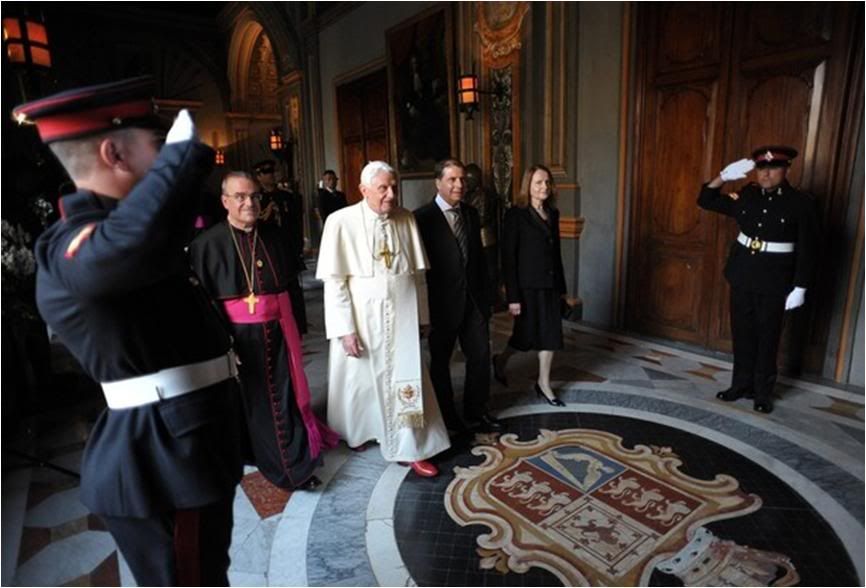
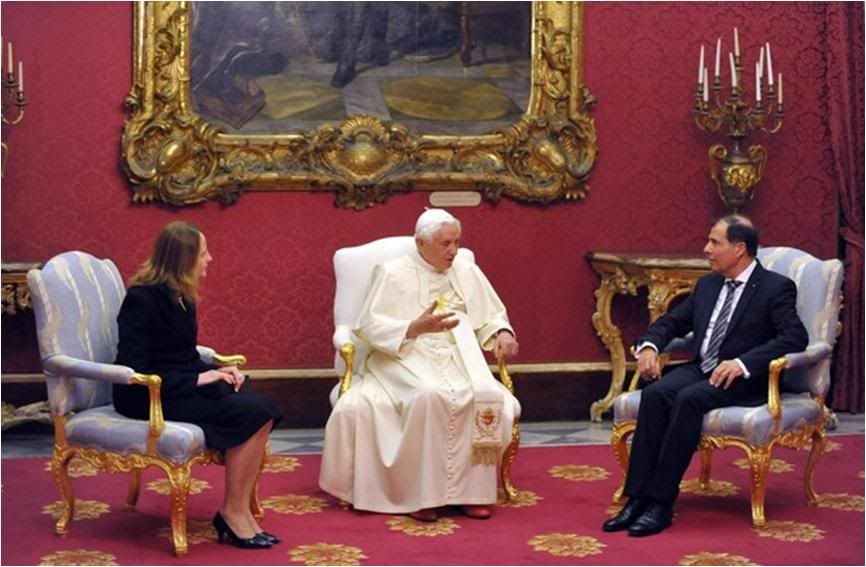
Best of all, the balcony of the presidential palace overlooking the square gave everyone a chance to see the Pope.
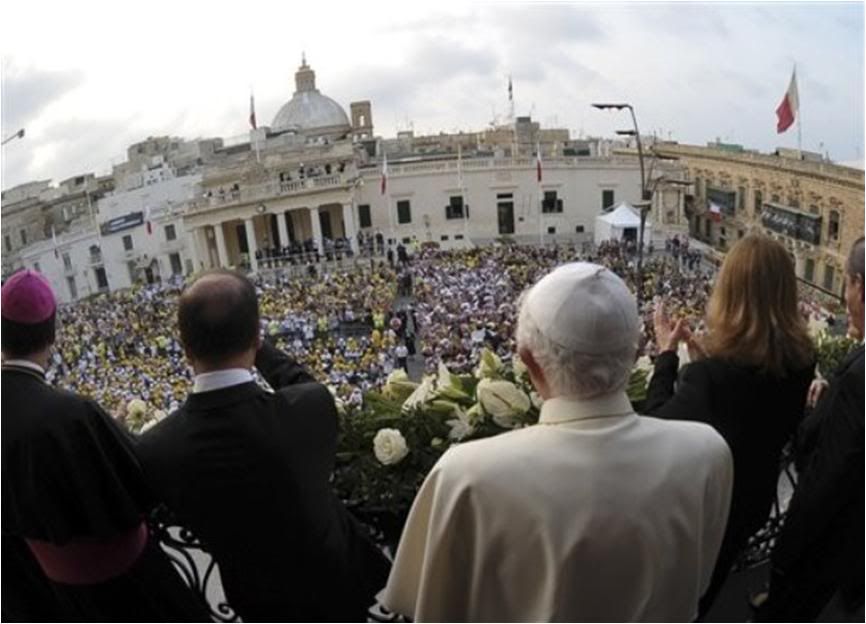
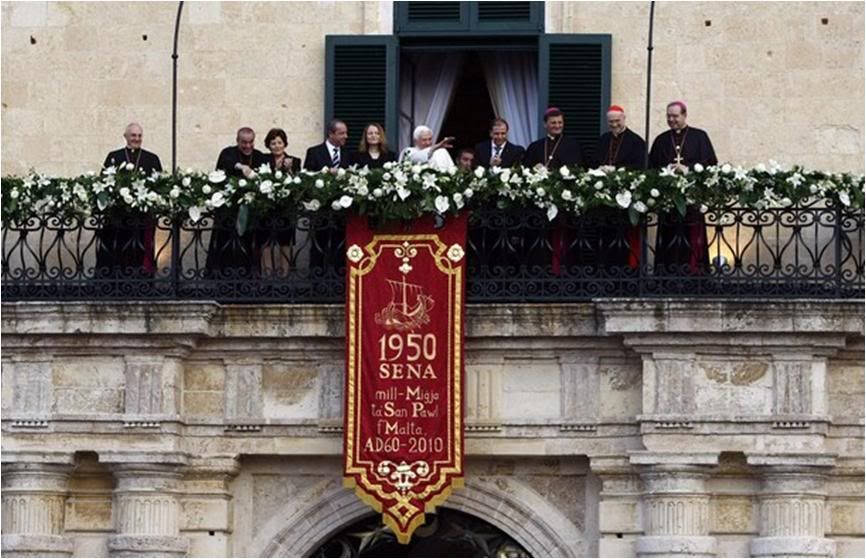
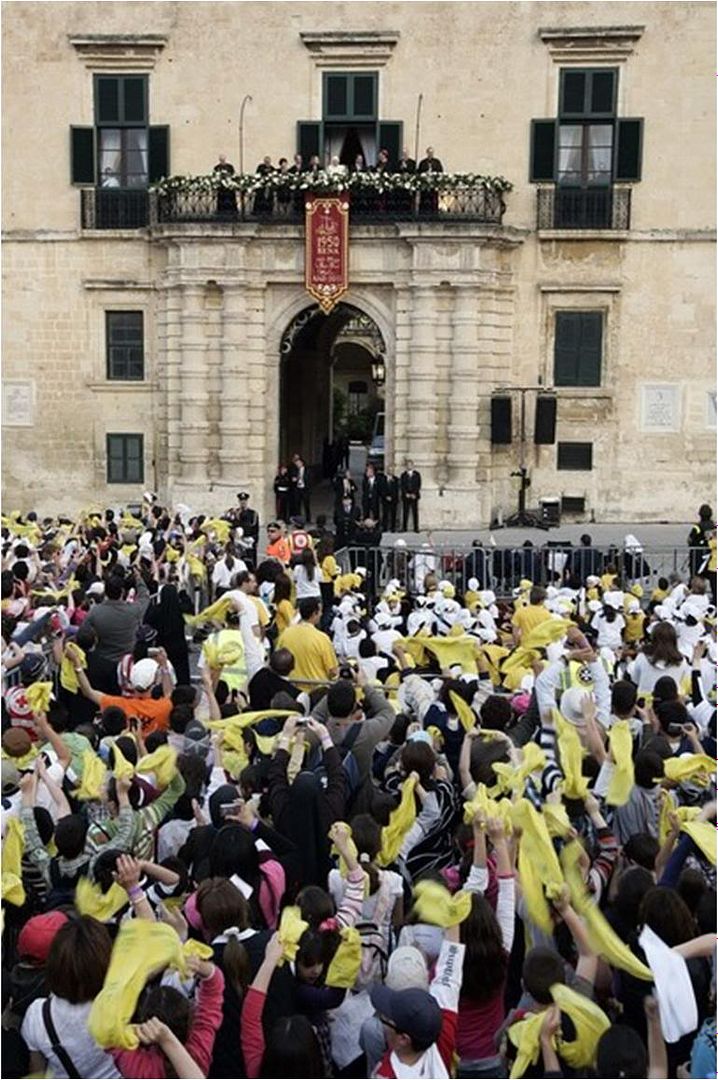
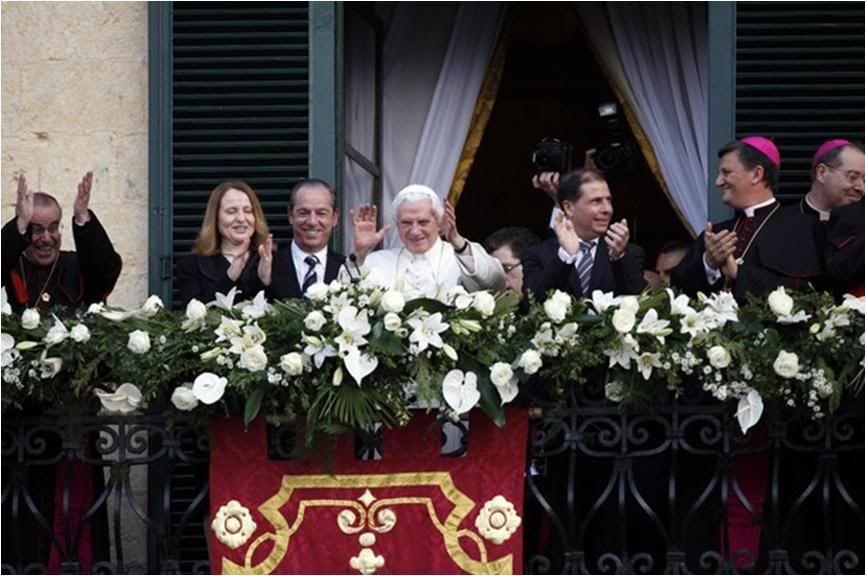
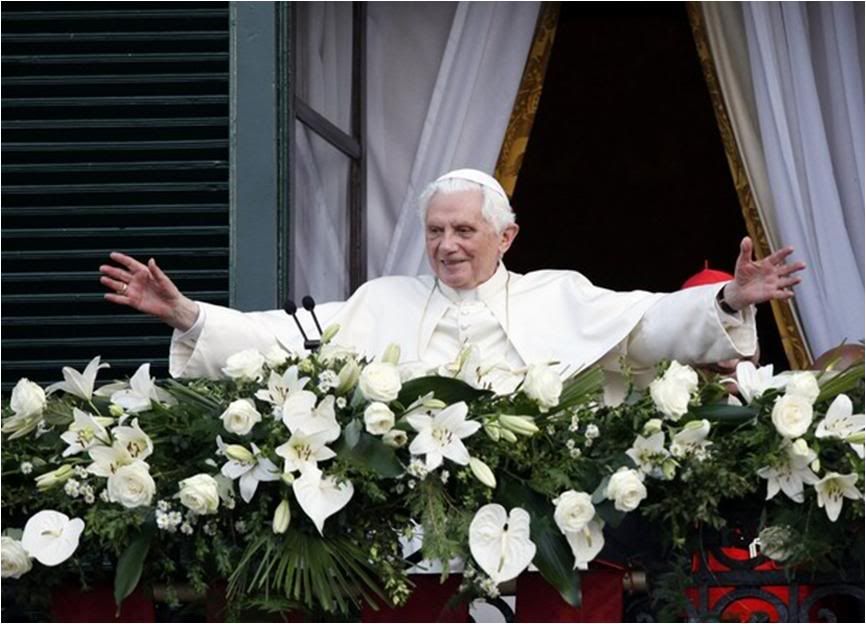
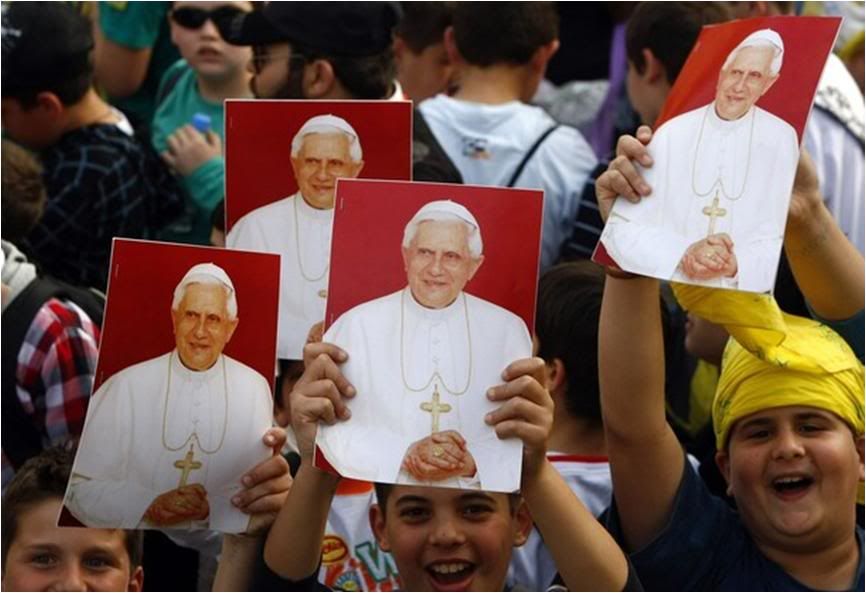
On leaving the palace, the Pope walked over to the front row of the schoolchildren's ranks to greet handicapped children before mounting the Popemobile to proceed to Rabat.
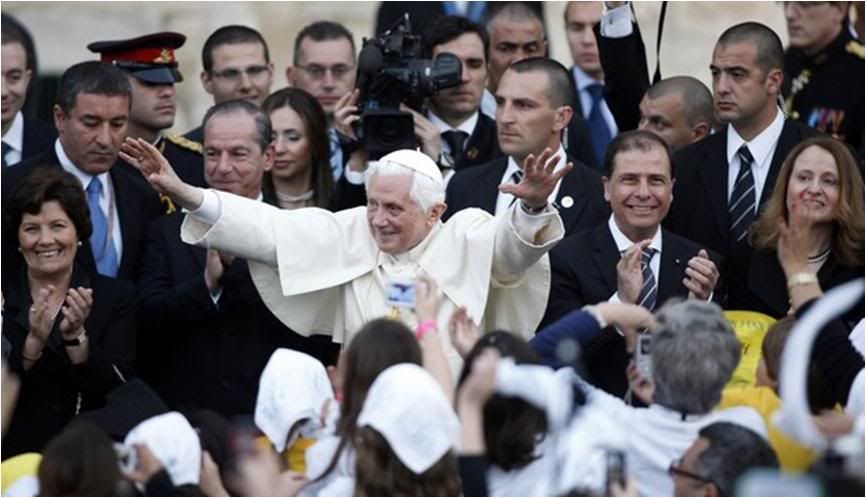
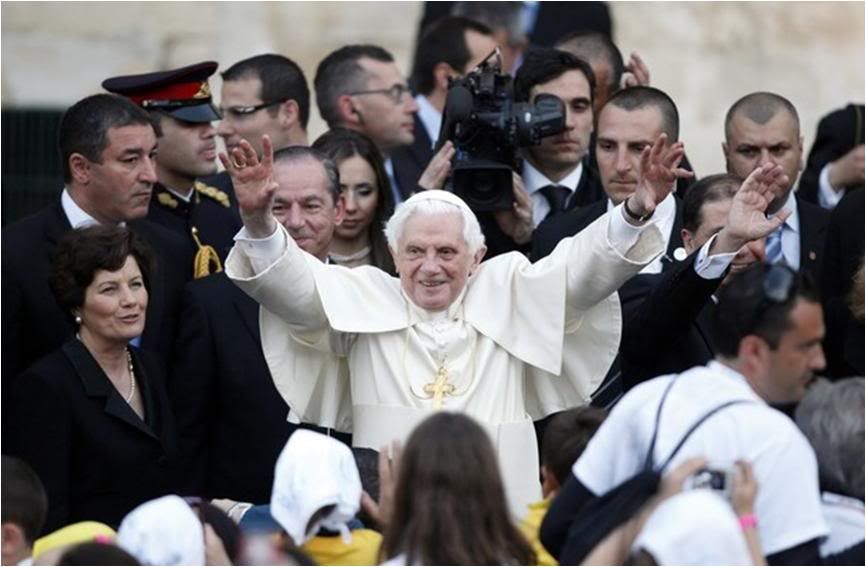 More than 100,000 turned up
More than 100,000 turned up
Saturday to greet the Pope
along the Popemobile routes
Translated from

Malta gave Pope Benedict XVI a welcome that was much greater than expected, according to Vatican press director Fr. Fderico Lombardi, in a briefing after the Pope's first few hours on the island.
Lombardi said more than 100,000 persons turned up along the routes taken by the Popemobile since the Pope's arrival. [Previously, trip organnizers had said that the Popemobile routes would take the Pope through 45 parishes in 15 communities in and around La Valletta, the capital, during his 27-hour visit.]
"The Pope is obviously very happy at the warmth that everyone showed him," Lombardi said.
A touching moment was unscheduled. Upon leaving the presidential palace, the Pope walked over to six terminally ill children whom their parents had brought to the square facing the palace. The Pope caressed them and gave them his blessing.
However, Fr. Lombardi would not confirm whether another unscheduled event will take place Sunday, namely, a meeting with the 10 abuse victims who had publicly asked for such a meeting last week.
"If it happpens," Fr. Lomardi said, "it will be reported only after it takes place".
Lombardi would not comment on a statement made in Spain by Cardinal Dario Castrillon Hoyos that the letter he wrote to a French bishop in 1992 to congratulate him on not denouncing a sex offender priest to teh Poilce, ahd been approved by John Paul II.
[Modificato da TERESA BENEDETTA 19/04/2010 02:56] |
| |
 18/04/2010 02:08 18/04/2010 02:08 |
|
| | | OFFLINE | | Post: 19.961
Post: 2.602 | Registrato il: 28/08/2005
Registrato il: 20/01/2009 | Administratore | Utente Veteran | |
|

 THE POPE IN MALTA:
THE POPE IN MALTA:
AT ST. PAUL'S GROTTO
Crowds waited patiently since early afternoon to welcome the Pope near the Church of st, Oaul in Rabat, built over the cave where the Apostle Paul lived during his unplanned sojourn in Malta following that historic shipwreck 1950 years ago.
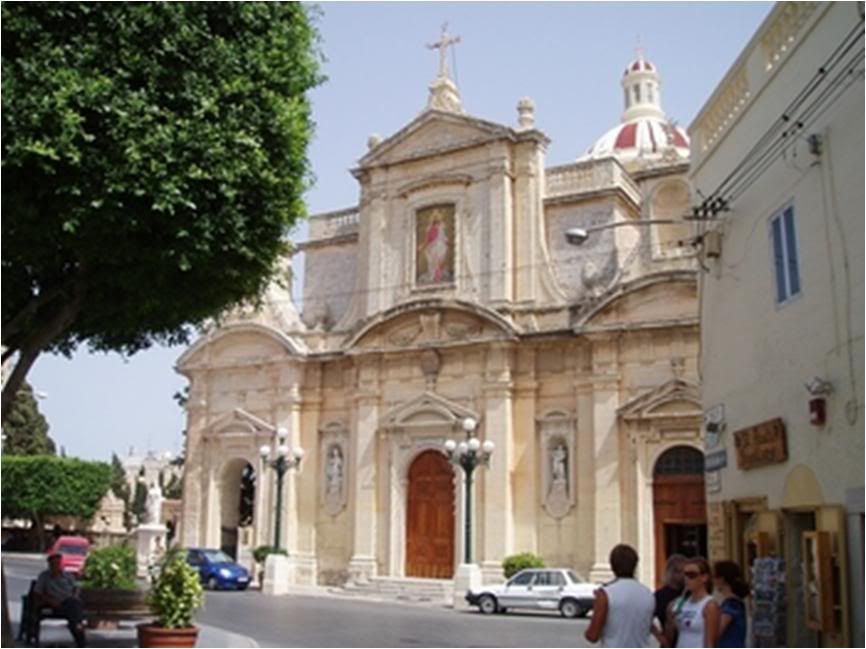
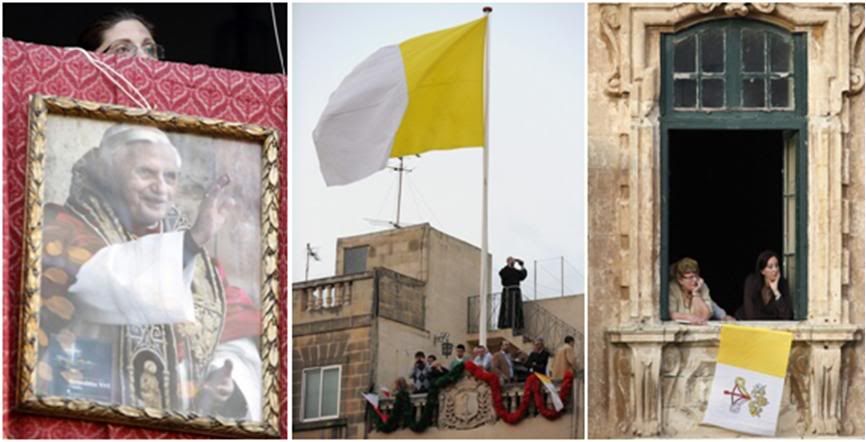

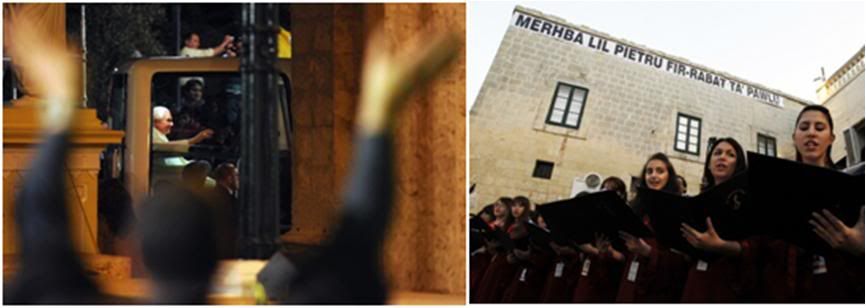
Night had fallen by the time the Pope reached the Church where he prayed briefly at the main altar before descending to the grotto for more prayer.
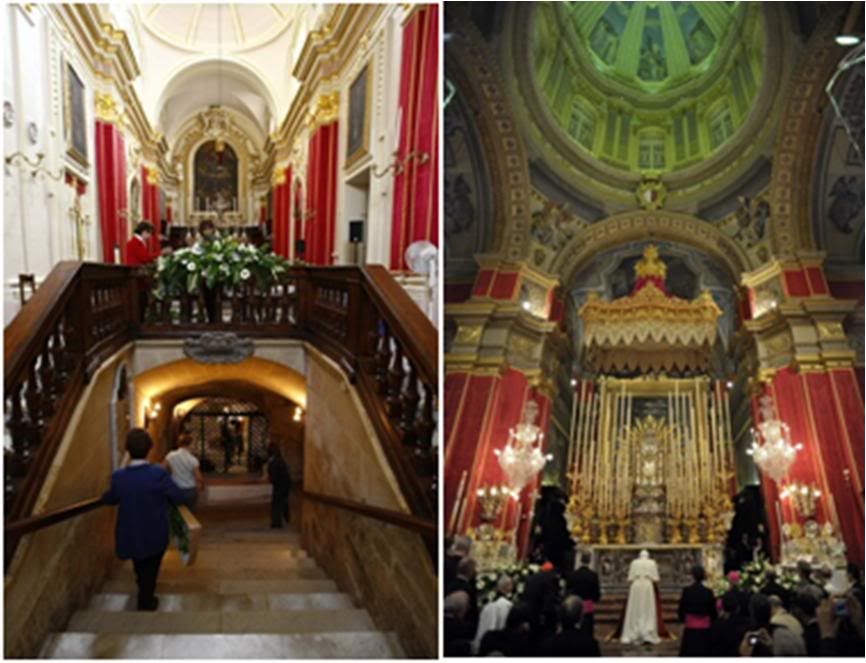 Inset in the photo below shows the grottto without the TV lighting set up for the Pope's visit when church women were preparing it yesterday for the Pope's visit.
Inset in the photo below shows the grottto without the TV lighting set up for the Pope's visit when church women were preparing it yesterday for the Pope's visit.
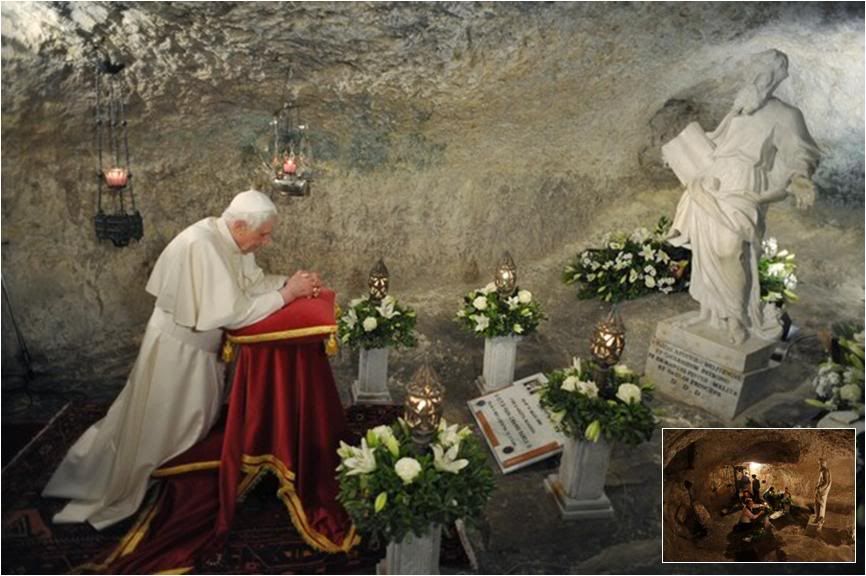
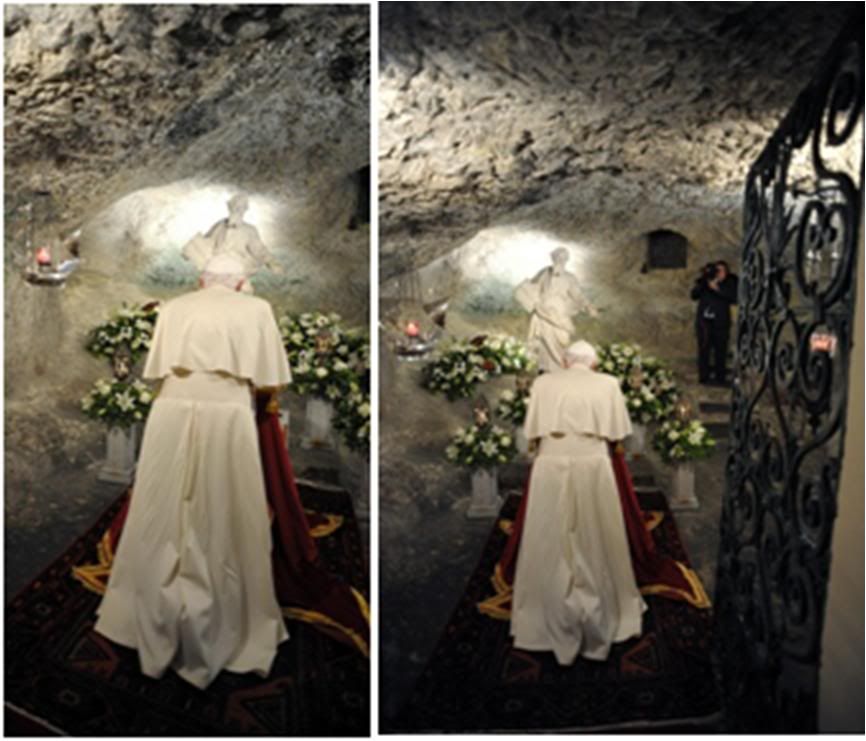
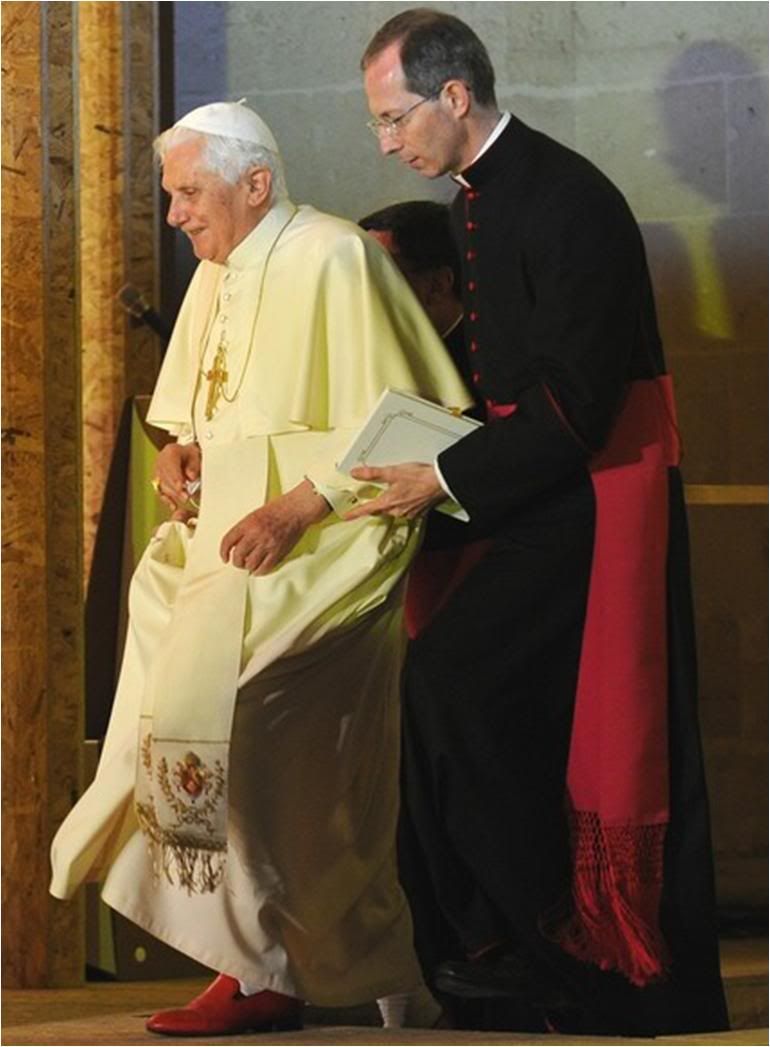
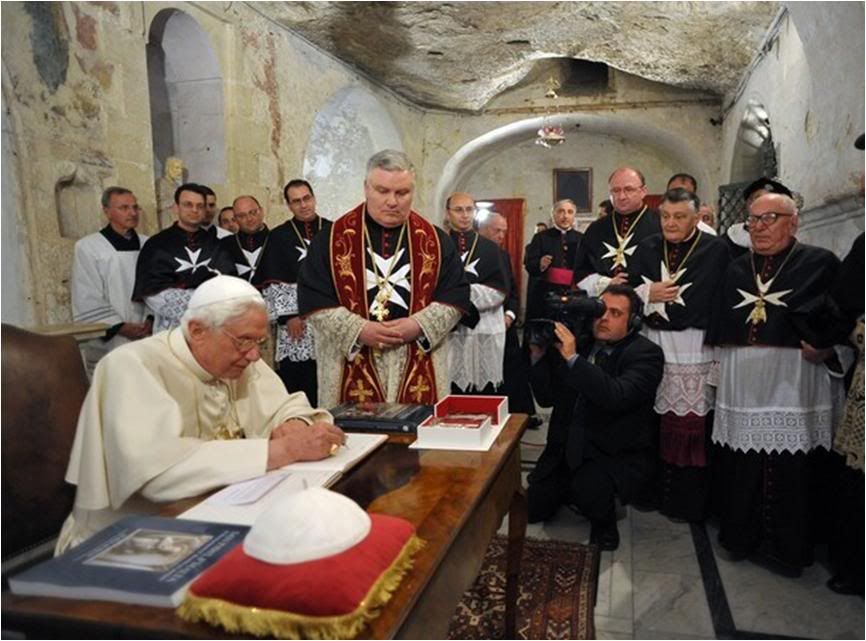
After his private prayer, the Pope also led prayers in the grotto for Maltese missionaries and members of the church's Collegiate chapter. Later, after signing the guest book of the church, the Pope and his party emerged from the church for the public part of the event, which opened with welcome remarks by Archbishop Cremona.
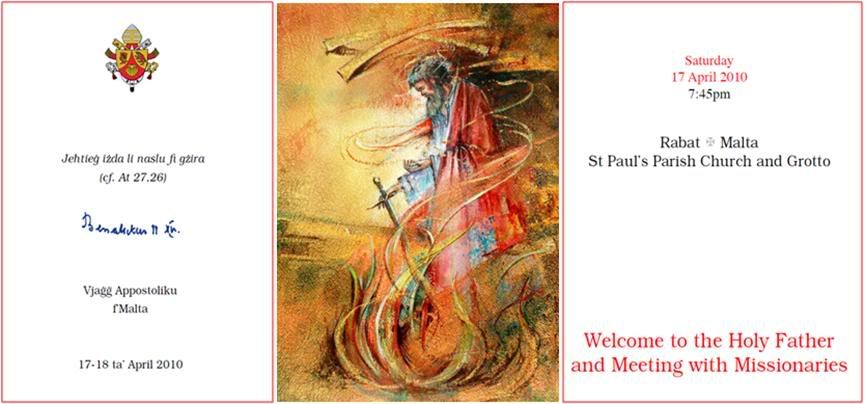
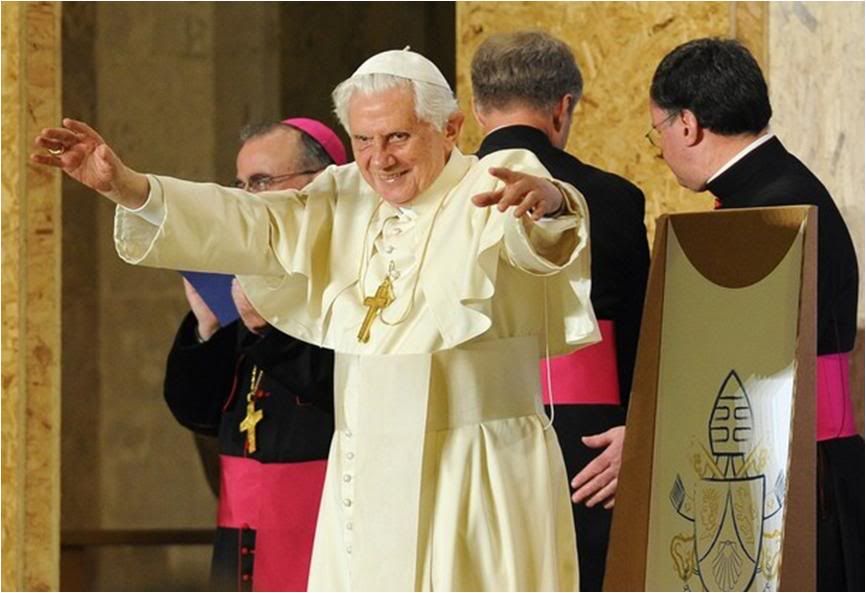
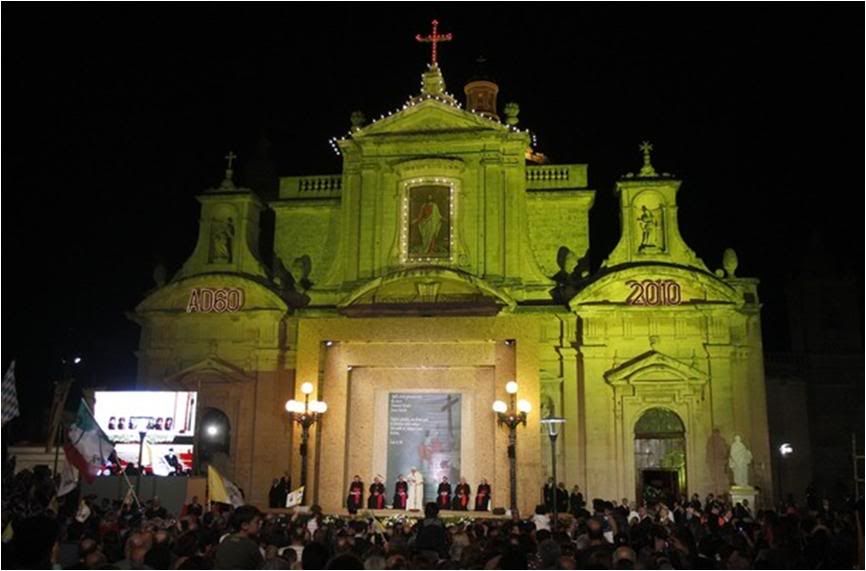
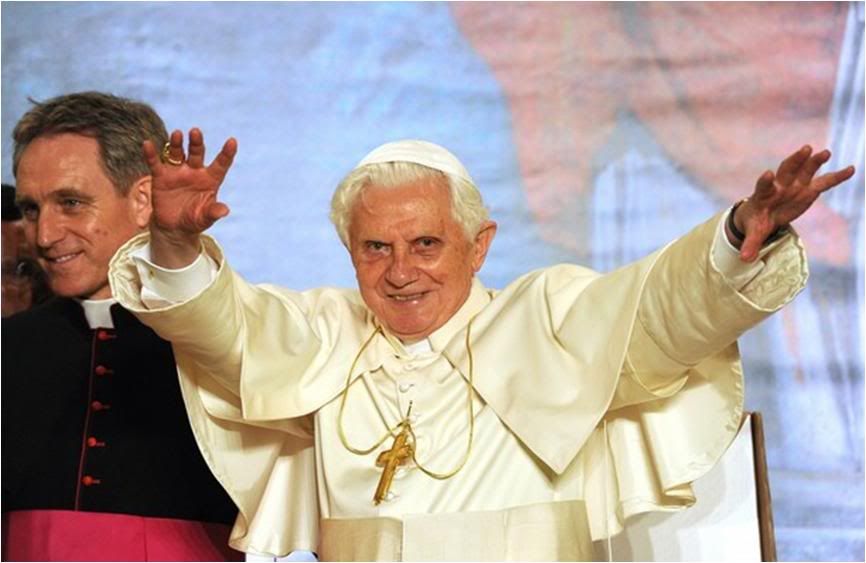
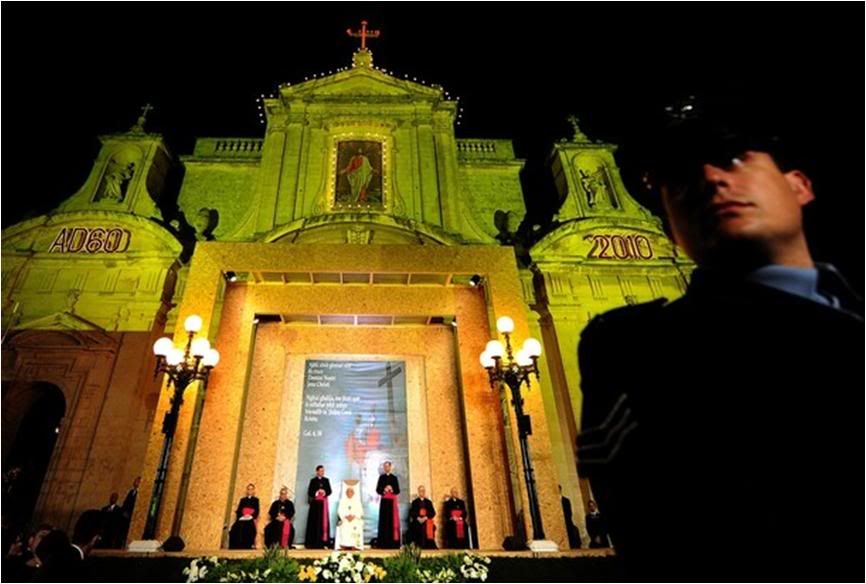 Here is the full text of the Holy Father's discourse, delivered in English:
Here is the full text of the Holy Father's discourse, delivered in English:
Dear Archbishop Cremona,
Dear Brothers and Sisters,
My pilgrimage to Malta has begun with a moment of silent prayer at the Grotto of Saint Paul, who first brought the faith to these islands.
I have come in the footsteps of those countless pilgrims down the centuries who have prayed in this holy place, entrusting themselves, their families and the welfare of this nation to the intercession of the Apostle of the Gentiles.
I rejoice to be at last in your midst and I greet all of you with great affection in the Lord!
Paul’s shipwreck and his three-month stay in Malta left an indelible mark upon the history of your country. His words to his companions prior to his arrival in Malta are recorded for us in the Acts of the Apostles and have been a special theme in your preparation for my visit.
Those words – “Jeħtieg iżda li naslu fi gżira” – in their original context are a summons to courage in the face of the unknown and to unfailing confidence in God’s mysterious providence. The castaways were, in fact, warmly welcomed by the Maltese people, following the lead given by Saint Publius.
In God’s plan, Saint Paul thus became your father in the Christian faith. Thanks to his presence among you, the Gospel of Jesus Christ took deep root and bore fruit not only in the lives of individuals, families and communities, but also in the formation of Malta’s national identity and its vibrant and distinctive culture.
Paul’s apostolic labours also bore a rich harvest in the generations of preachers who followed in his footsteps, and particularly in the great number of priests and religious who imitated his missionary zeal by leaving Malta in order to bring the Gospel to distant shores.
I am happy to have had the opportunity to meet so many of them today in this Church of Saint Paul, and to encourage them in their challenging and often heroic vocation.
Dear missionaries: I thank all of you, in the name of the whole Church, for your witness to the Risen Lord and for your lives spent in the service of others. Your presence and activity in so many countries of the world brings honour to your country and testifies to an evangelical impulse deeply embedded in the Church in Malta.
Let us ask the Lord to raise up many more men and women to carry forward the noble mission of proclaiming the Gospel and working for the advancement of Christ’s Kingdom in every land and people!
Saint Paul’s arrival in Malta was not planned. As we know, he was travelling to Rome when a violent storm arose and his ship ran aground on this island. Sailors can map a journey, but God, in his wisdom and providence, charts a course of his own.
Paul, who dramatically encountered the Risen Lord while on the road to Damascus, knew this well. The course of his life was suddenly changed; henceforth, for him, to live was Christ (cf. Phil 1:21); his every thought and action was directed to proclaiming the mystery of the Cross and its message of God’s reconciling love.
That same word, the word of the Gospel, still has the power to break into our lives and to change their course. Today the same Gospel which Paul preached continues to summon the people of these islands to conversion, new life and a future of hope.
Standing in your midst as the Successor of the Apostle Peter, I invite you to hear God’s word afresh, as your ancestors did, and to let it challenge your ways of thinking and the way you live your lives.
From this holy place where the apostolic preaching first spread throughout these islands, I call upon each of you to take up the exciting challenge of the new evangelization.
Live out your faith ever more fully with the members of your families, with your friends, in your neighbourhoods, in the workplace and in the whole fabric of Maltese society.
In a particular way I urge parents, teachers and catechists to speak of your own living encounter with the Risen Jesus to others, especially the young people who are Malta’s future. “Faith is strengthened when it is given to others!” (cf. Redemptoris Missio,2).
Believe that your moments of faith assure an encounter with God, who in his mighty power touches human hearts. In this way, you will introduce the young to the beauty and richness of the Catholic faith, and offer them a sound catechesis, inviting them to ever more active participation in the sacramental life of the Church.
The world needs this witness! In the face of so many threats to the sacredness of human life, and to the dignity of marriage and the family, do not our contemporaries need to be constantly reminded of the grandeur of our dignity as God’s children and the sublime vocation we have received in Christ?
Does not society need to reappropriate and defend those fundamental moral truths which remain the foundation of authentic freedom and genuine progress?
Just now, as I stood before this Grotto, I reflected on the great spiritual gift (cf. Rom 1:11) which Paul gave to Malta, and I prayed that you might keep unblemished the heritage bequeathed to you by the great Apostle.
May the Lord confirm you and your families in the faith which works through love (cf. Gal 5:6), and make you joyful witnesses to the hope which never disappoints (cf. Rom 5:5). Christ is risen! He is truly risen! Alleluia!
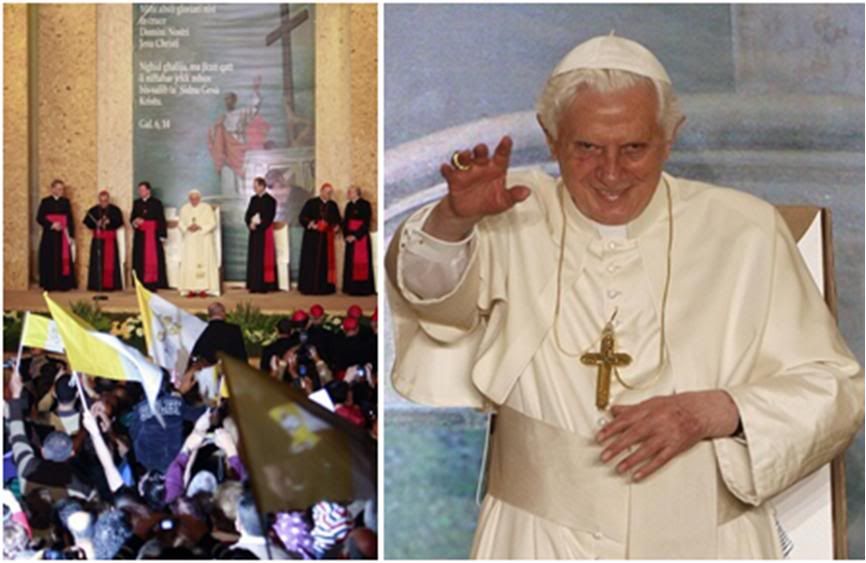
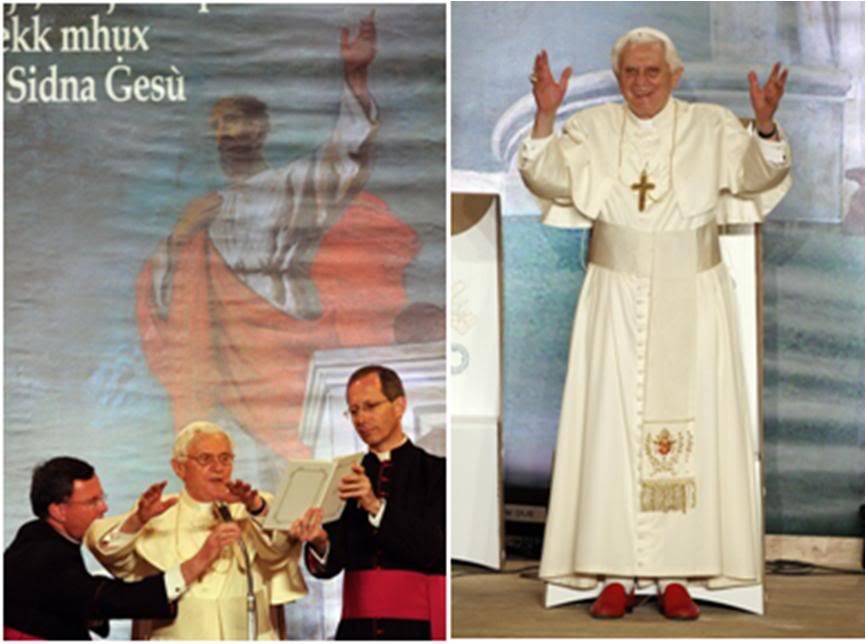
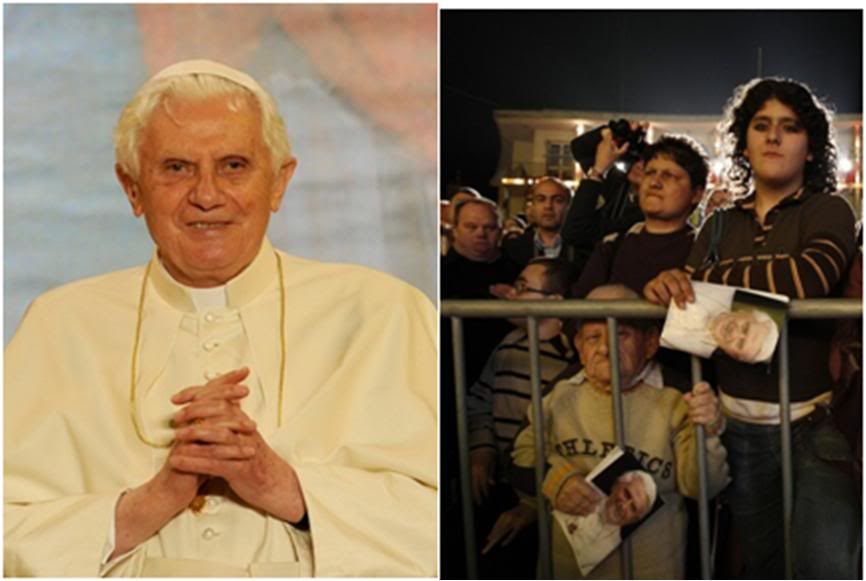
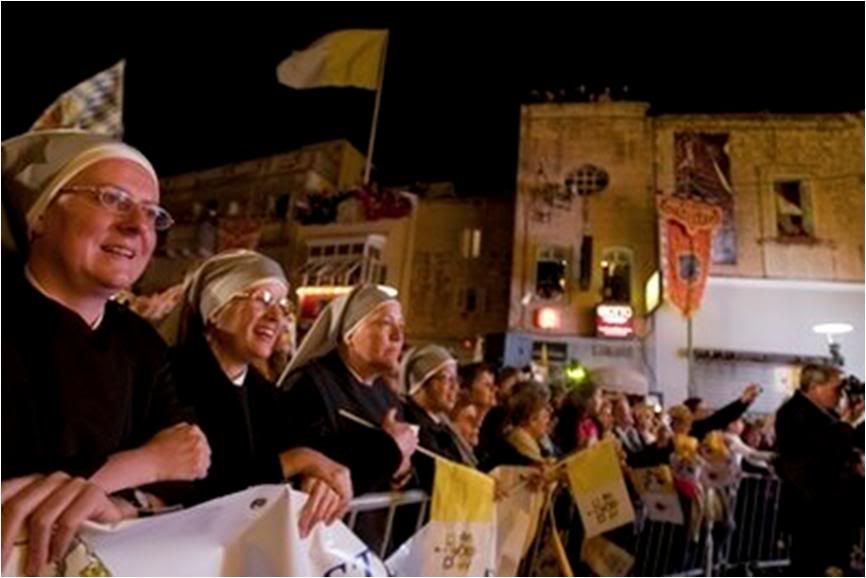
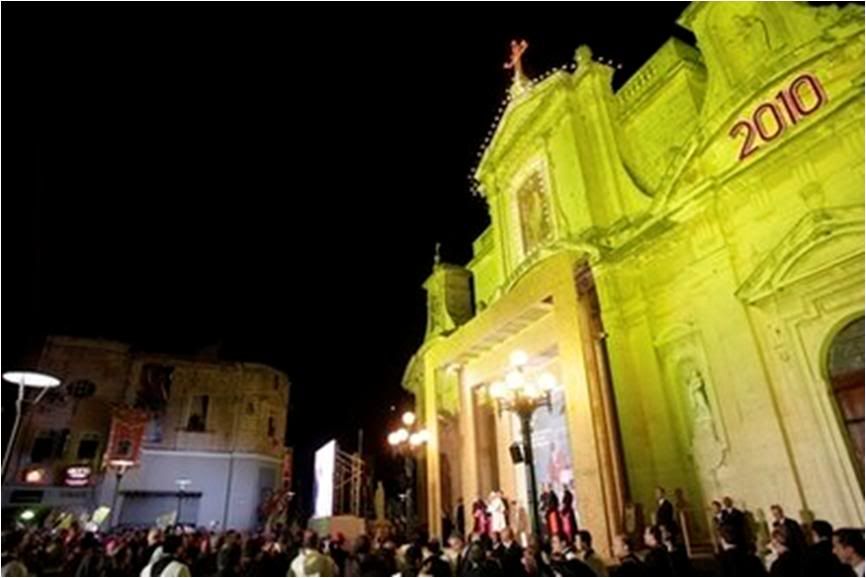
The Holy Father is spending the night at the Apostolic Nunciature located not far from the Church of St. Paul in Rabat.
[Modificato da TERESA BENEDETTA 18/04/2010 10:33] |
| |
 18/04/2010 11:41 18/04/2010 11:41 |
|
| | | OFFLINE | | Post: 19.962
Post: 2.603 | Registrato il: 28/08/2005
Registrato il: 20/01/2009 | Administratore | Utente Veteran | |
|

 While I continue to admire John Allen for his diligence as a journalist, I am increasingly frustrated by his concessions to - if not complete identification with - the worst stereotypes of the MSM, as with this 'analysis' of the Malta visit to date. In the process, he does not seem to realize how absurd some of his assumptions are!
Vatican strategy in Malta:
While I continue to admire John Allen for his diligence as a journalist, I am increasingly frustrated by his concessions to - if not complete identification with - the worst stereotypes of the MSM, as with this 'analysis' of the Malta visit to date. In the process, he does not seem to realize how absurd some of his assumptions are!
Vatican strategy in Malta:
'Let Benedict be Benedict'

April 18, 2010
Valletta, Malta - To the extent that the Vatican has a discernible public relations strategy for Pope Benedict XVI's weekend visit to the island nation of Malta, it might be expressed in a simple formula: "Let Benedict be Benedict."[Well, DUH! It's not a question of strategy at all - it's just a matter of fact! How can it be otherwise? Managing Benedict XVI (or any Pope for that matter) in terms of 'public relations' is a contradiction in terms.]
Rather than allowing the global media to set the agenda [Since when has Benedict XVI allowed the media to set his agenda, anyway???], which in practice would have meant a near-exclusive focus on the sexual abuse crisis, the Pontiff has instead concentrated on his core themes: Europe’s Christian roots, the struggle to defend human life and the family, a welcoming stance towards immigrants, and the important of not succumbing to secular values and relativism.
At least on the ground in this nation of 400,000, where 94 percent of the population is Catholic, the strategy appears to be working. [ What strategy???? The Pope has always been himself - never tried to be anyone or anything other than who he is, with all the extraordinary endowments God gave him as well as his share of human failings].
Crowds for the pope have been large and lively, and the Times of Malta led its day one wrap-up coverage by referring to the “enthusiastic welcome” the Pope received. [Did anyone seriously expect anything else? When the Vicar of Christ comes to visit, it is always a landmark event in the life of the faithful!]
The Vatican spokesperson, Jesuit Fr. Federico Lombardi, told reporters yesterday evening that the popular response to the Pope has exceeded expectations. [You, too, Fr. Lombardi! Why is there such skepticism and under-estimation about the esteem - in the past, it was veneration, no less - that the simple faithful have for the Pope?] To date, there’s been no hint of the protests over the Pope's handling of the sexual abuse crisis that some media coverage had predicted.
Despite the strong popular response, it’s not clear that Benedict’s “be himself” strategy will succeed entirely in changing the subject. [DUH! As if the media will change their focus at all! Allen's whole approach is Exhibit #1 itself - the premise that because of the media's single-issue fixation should detract from the apostolic visit in any way. It did not in the USA, despite all the pre-visit doom-and-gloom - though going by recent polls, the US public at large appears to take their cue from the media.]
Aboard the papal plane en route to Malta, Benedict offered what his spokesperson, Jesuit Fr. Federico Lombardi, described as a “discreet reference” to the sexual abuse crisis, referring to how the body of the Church is “wounded because of our sins.”
Beyond that, Benedict so far has not mentioned the crisis in any of his public remarks, and spokespersons have yet to confirm whether he will or won’t meet victims before he leaves for Rome later today. [Allen knows very well there would never be a pre-event announcement! if it happens, it happens!] (That’s if the Pope is able to leave; the clouds of volcanic ash currently disrupting air traffic across Europe have left this evening’s return flight a bit uncertain.) [Check the Rome airport sites on line, Mr. Allen. Thew news is good today!]
Malta has recently been rocked by its own local version of the broader crisis, with ten men coming forward to claim that they were abused by four priests during the 1980s and 1990s at St. Joseph orphanage in Santa Venera. One of the alleged victims is a convicted murder who killed a man with a hammer in 1991 and then cut his body to pieces with a broken bottle, and who has linked that horrific crime to abuse he suffered at the orphanage.
Some of those ten men have requested a meeting with Pope Benedict to close what they called a “hurtful chapter.” Though that meeting remains uncertain, the victims have announced that Maltese Monsignor Charles Scicluna, the promoter of justice in the Vatican’s Congregation for the Doctrine of the Faith, has agreed to receive them in Rome in June.
Interestingly, the most explicit commentary on the crisis during the pope’s trip so far has come not from the pontiff but from Malta’s president, George Abela, who welcomed Benedict yesterday at Luqa airport.
Abela, a Catholic attorney with a background in canon law, said it’s wrong to use the actions of a few to condemn the church as a whole, but he also called for church and state to work together towards more “transparent” and “effective” procedures to end abuse, “so that just will not only be done but seen to be done.”
Perhaps it says something that a politician, always more sensitive to public opinion, felt obliged to tackle the sex abuse issue head on, while the pope appeared more willing to follow his own lead.
Most of Benedict’s public commentary so far has begun and ended with the memory of St. Paul, whose famous shipwreck on Malta, as described in the Acts of the Apostles, this year marks its 1,950th anniversary. Benedict has repeatedly invoked the memory of that shipwreck as an example of how apparent misfortune can be used for God’s purposes.
This morning, the Pope will celebrate an open-air Mass and then hold a large meeting with Maltese youth this afternoon before returning to Rome – assuming, of course, that the papal plane is allowed to take off.
If Benedict has refused to allow the sexual abuse crisis to cloud his trip to Malta, however, perhaps he’ll also be able to skirt the physical clouds of ash that threaten to scuttle his return. [There he goes again, straining and stretching his metaphors for effect. You're very good at metaphors, John - just make sure they fit! Does he really think the Pope's return trip to Rome will be cancelled? I just checked Rome Fiumicino airport's site this morning (BTW, Rome's airports were never closed) - and it reports that Dutch and German test flights at appear to be promising even for air flights north of the Alps.]
MSM is, of course, unrepentant and unrelenting...Look at the spin given to this story....
Pope plans to meet
with Malta abuse victims
By Nick Squires in Valletta

April 18, 2010
Pope Benedict XVI has bowed to international pressure and will on Sunday meet a group of Maltese men who claim they were sexually abused by Catholic priests while growing up in a Church-run orphanage.
Sources in Malta's capital, Valletta, said that the Pope would meet the men around lunchtime, after celebrating Mass in front of tens of thousands of Maltese faithful.
The pontiff, who turned 83 on Friday, could meet as many as eight of the victims, orphans who are now in their thirties.
That would be the largest group of sex abuse victims he has met during his five-year papacy – in 2008 he met five American victims during his visit to the US and a few months later he met another five victims in Australia.
An encounter with the Maltese victims would be a way for the Vatican to dampen down some of the anger over the paedophile sex abuse scandals which have emerged around the world in the last few months.
Their stories of abuse have been extensively reported in the Maltese and international press and the Vatican has been under huge pressure to arrange an encounter, at which the Pope will be expected to apologise on behalf of the Catholic Church.
Asked last night about the likelihood of such a meeting, Father Federico Lombardi, the Vatican spokesman, would only say that it would not be announced in advance and would be held in private.
The group of 10 men allege that they were systematically molested and sexually abused by Catholic priests at the St Joseph Home orphanage in the 1980s.
Court proceedings have started against three priests, but the victims complain that the process is moving "at a snail's pace". A fourth accused priest has fled to Italy.
Did anyone really doubt that if he found the time, the Pope would meet with the victims? Especially since they are a small group who are easy to assemble since they have been working for this meeting! He didn't need 'international pressure' for this. There was very little 'pressure' before he came to the United States, although there was speculation - then he surprised everyone by meeting with some victims Cardinal O'Malley brought to Washington from the Boston area. In Sydney, he made time before leaving the city to say early morning Mass for the victims and meet with them. No one has to tell Benedict XVI what he needs to do - he is what the Spanish call 'cumplido' - someone who always does the right and proper thing, big or small.
[Modificato da TERESA BENEDETTA 18/04/2010 13:59] |
| |
 18/04/2010 13:57 18/04/2010 13:57 |
|
| | | OFFLINE | | Post: 19.963
Post: 2.604 | Registrato il: 28/08/2005
Registrato il: 20/01/2009 | Administratore | Utente Veteran | |
|
 April 18, Third Sunday of Easter
April 18, Third Sunday of Easter
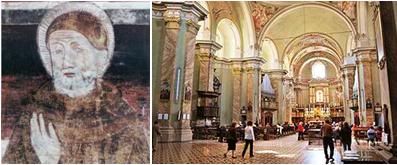 BLESSED JACOPO DA LODI [James of Oldo] (Italy, 1364-1404)
BLESSED JACOPO DA LODI [James of Oldo] (Italy, 1364-1404)
Widower, Franciscan priest
He was a well-to-do citizen of Lodi near Milan who married well and had two daughterS.
He lost both children during a plague, and after that, he and his wife became lay
Franciscans dedicated to helping the poor and the sick. When his wife died, he became
a priest and continued his apostolate with the poor and the sick. Soon after he died,
at least 12 miracles were officially attributed to him, and his body was found incorrupt
when exhumed decades later. He is buried in the Church of Santa Maria Maddalena in Lodi,
his hometown. He was beatified in 1933.
Readings for today's Mass:
www.usccb.org/nab/readings/041810.shtml
OR today.
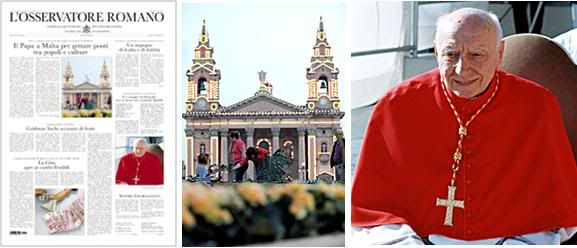 The Pope in Malta to build bridges between peoples and cultures
The Pope in Malta to build bridges between peoples and cultures
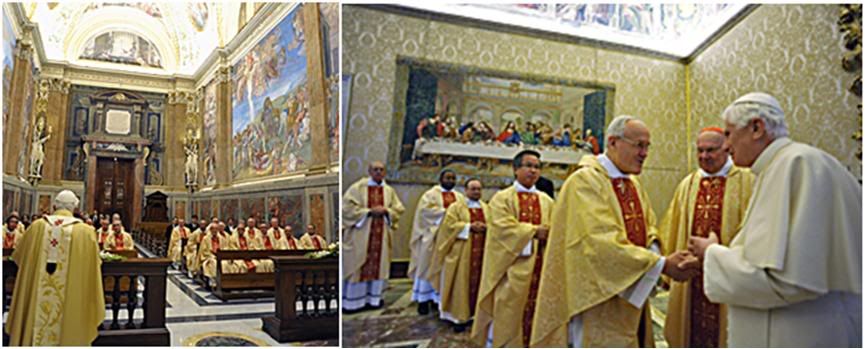 Since the Pope left Rome yesterday after today's issue of OR went to press, the Malta news in this issue consists of backgrounders. The issue contains the full text of the extemporaneous homily by Benedict XVI to members of the Pontifical Biblical Commission last Wednesday at the Pauline Chapel (photos). Other Page 1 stories: An interview with Cardinal bertone about his recent trip to Chile; the Pope's condolence on the death of Cardinal Spidlik (with a very good article inside about the late Czech theologian), and in international news: China announces it will adopt a flexible exchange rate; and the US Securities and Exchange Commission accuses Goldman Sachs of fraud for allegedly failing to provide its investors with crucial information about subprime derivatives that they were marketing.
THE POPE'S DAY
Since the Pope left Rome yesterday after today's issue of OR went to press, the Malta news in this issue consists of backgrounders. The issue contains the full text of the extemporaneous homily by Benedict XVI to members of the Pontifical Biblical Commission last Wednesday at the Pauline Chapel (photos). Other Page 1 stories: An interview with Cardinal bertone about his recent trip to Chile; the Pope's condolence on the death of Cardinal Spidlik (with a very good article inside about the late Czech theologian), and in international news: China announces it will adopt a flexible exchange rate; and the US Securities and Exchange Commission accuses Goldman Sachs of fraud for allegedly failing to provide its investors with crucial information about subprime derivatives that they were marketing.
THE POPE'S DAY
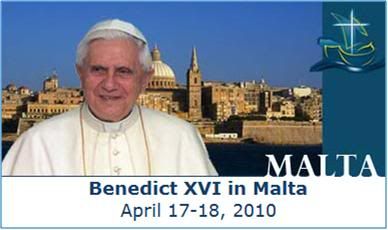 Sunday, April 18
Sunday, April 18
FLORIANA
10.00 HOLY MASS
Piazzale dei Granai (Granaries Square)
- Homily
REGINA COELI
- Remarks by the Holy Father
RABAT
13.00 Lunch with the Bishops of Malta
Apostolic Nunciature
16.00 Leave Apostolic Nunciature for Kalkara
The Pope will be greeting the public in the streets
on the way to Kalkara.
KALKARA
16.45 Leave by boat from the harbor of Kalkara
for the Grand Harbor of La Valletta
LA VALLETTA
17.15 MEETING WITH YOUTH
Waterfront wharf of La Valletta
- Speech by the Holy Father
The Pope will be greeting the public in the streets
on the way to the airport in Luqa.
LUQA
18.40 DEPARTURE CEREMONY
Malta International Airport, Luqa
- Speech by the Holy Father
19.10 Departure for Rome
ROME
20.45 Arrival at Ciampino airport
Rome and Malta are in the same time zone.
|
| |
 18/04/2010 15:14 18/04/2010 15:14 |
|
| | | OFFLINE | | Post: 19.964
Post: 2.605 | Registrato il: 28/08/2005
Registrato il: 20/01/2009 | Administratore | Utente Veteran | |
|

 THE POPE IN MALTA:
THE POPE IN MALTA:
MASS AT 'THE GRANARIES'
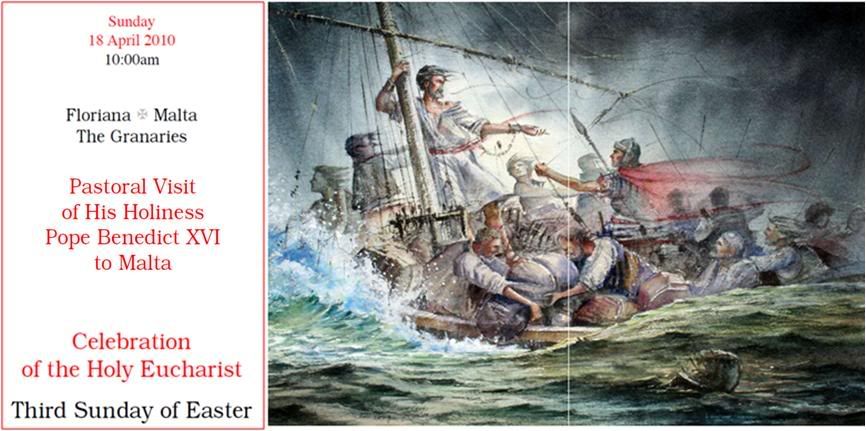
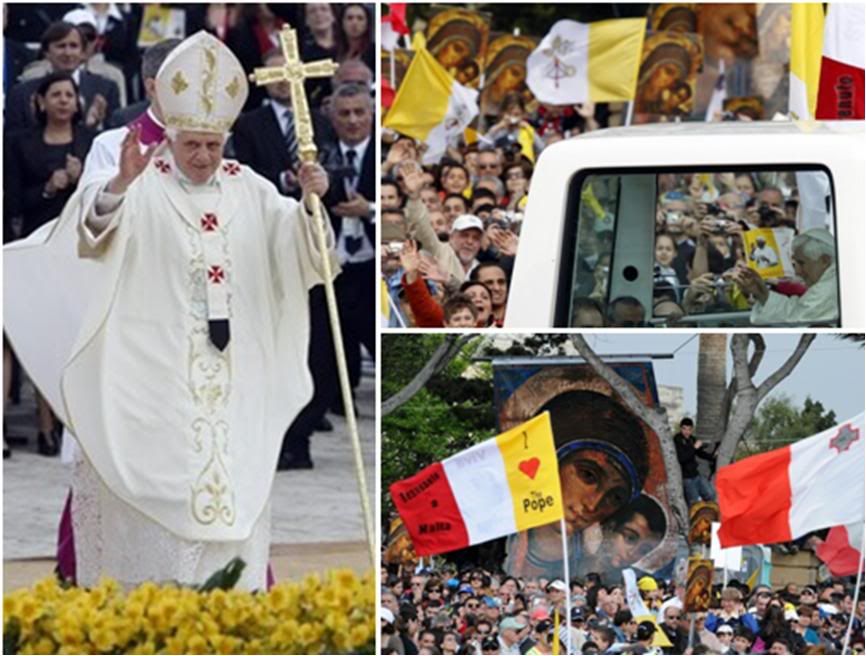 Pope Benedict to the Maltese:
Pope Benedict to the Maltese:
'Without God, we can do nothing'

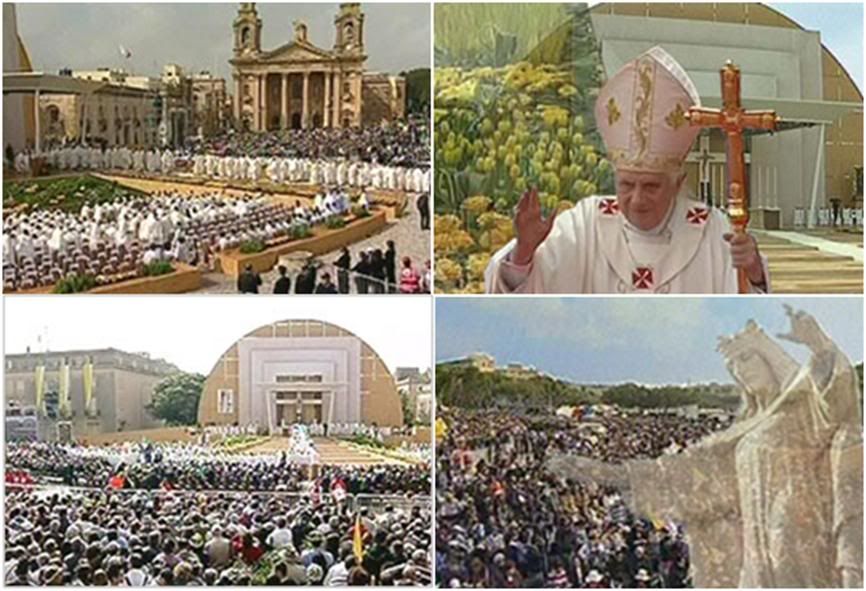
VALLETTA, Malta, April 18 (RV) - Granaries Square, is high on a hill, between the Maltese capital Valetta and neighbouring Floriana. On Sunday, light rain carried by strong winds failed to dampen the high spirits of the Maltese people.
They began arriving on the hill top before dawn, the elderly and the young, entire families, grandparents, parents and children. Young people climbed from the waterfront of Valetta port, to keep the crowds company in song as they waited for morning to come.
They waited patiently until shortly before 10 am local time, when an enormous cheer greeted the sight of the white Popemobile as it emerged from beneath the sandstone arches of the capital Valetta, winding its way through the tens of thousands, who had transformed the cities' streets into a carpet of yellow and white.
It came to a halt before the Church of St Publius, dedicated to the man who became the island nation’s first bishop. There Pope Benedict XVI vested in white and gold, and as the choir entoned Tu es Petrus, 700 concelebrating priests solemnly processed to the altar, announcing the beginning of Mass.
Beneath the simple white cross that adorned the wooden altar, the Archbishop of Malta, Paul Cremona, welcomed the Pope: “Today we are searching especially for a new evangelisation”.
He said the Church had a mission of love to witness to its faith and the values inherent in it, especially the sanctity of life from the moment of conception; the dignity of every person and the importance of a stable family based on marriage.
Archbishop Cremona went on: “We know that in the light of these changing conditions we cannot just cling to the model of the Church to which we have been accustomed for decades... We have to return to the Church as it unfolds in the Acts of the Apostles: a Church which centres around the listening to and the sharing of the Word and the Eucharist... A Church humble enough to recognise the failures and sins in its members but strong enough to count on the presence of the Holy Spirit; a Church which does not seek privileges, but merely strives just to deliver the Good News of the Lord”.
In his homily Pope Benedict noted that “no visitor to Malta could fail to be impressed” by the people’s devotion. He spoke of the first Christian visitor to touch their shores, the Apostle to the Gentiles Paul, in the year 60 AD.
Many have since disembarked, he continued, praising Malta’s discernment in knowing how to draw upon the best of what they have to offer: “I urge you to continue to do so. Not everything that today’s world proposes is worthy of acceptance by the people of Malta. Many voices try to persuade us to put aside our faith in God and his Church, and to choose for ourselves the values and beliefs by which to live. They tell us we have no need of God or the Church”.
Reflecting on the First Reading taken from the Acts of the Apostles, the reading known as the Gospel of Malta, that recounts the Shipwreck of St Paul, Pope Benedict urged the faithful of Malta to follow Paul’s example and place their trust in the Lord:
“It is tempting to think that today’s advanced technology can answer all our needs and save us from all the perils and dangers that beset us. But it is not so”.
At every moment of our lives we depend entirely on God, said Pope Benedict only he can protect us from harm, only he can guide us through the storms of life.
[The article goes on to excerpt a couple more passages from the Pope's homily, which is reproduced inf ull below.]
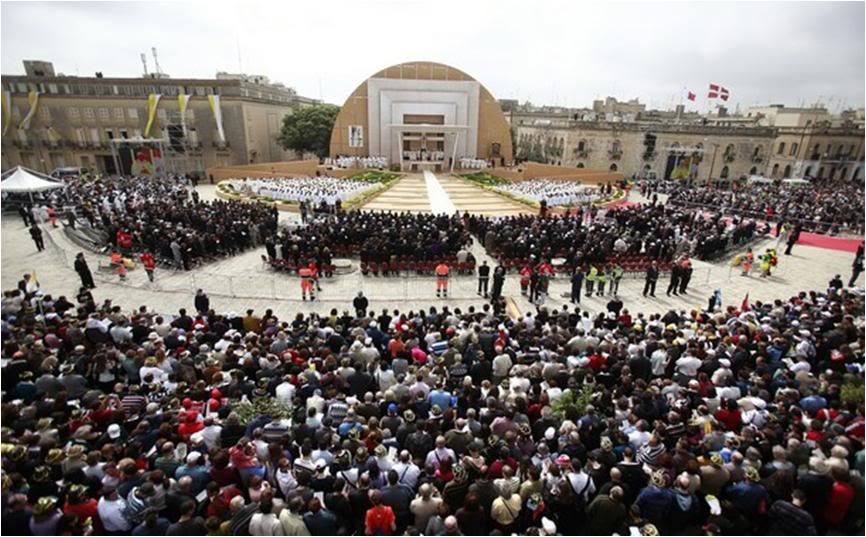
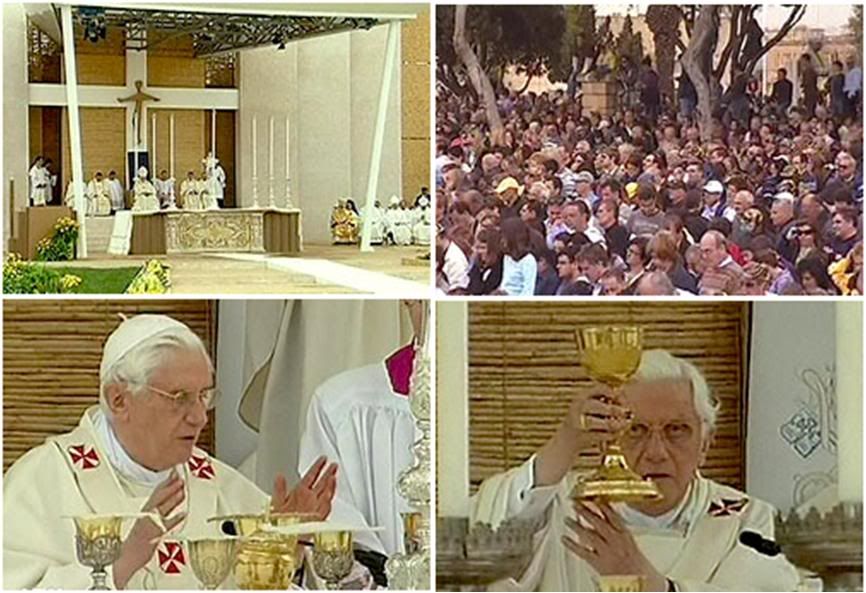 Here is the full text of the Holy Father's beautiful homily this morning which embodies his message to the people of Malta whom he came to confirm in the faith:
Here is the full text of the Holy Father's beautiful homily this morning which embodies his message to the people of Malta whom he came to confirm in the faith:
Dear Brothers and Sisters in Jesus Christ,
Maħbubin uliedi,
I am very glad to be here with all of you today before the beautiful church of Saint Publius to celebrate the great mystery of God’s love made manifest in the Holy Eucharist.
At this time, the joy of the Easter season fills our hearts because we are celebrating Christ’s victory, the victory of life over sin and death. It is a joy which transforms our lives and fills us with hope in the fulfilment of God’s promises. Christ is risen, alleluia!
I greet the President of the Republic and Mrs Abela, the civil authorities of this beloved Nation, and all the people of Malta and Gozo.
I thank Archbishop Cremona for his gracious words, and I also greet Bishop Grech and Bishop Depasquale, Archbishop Mercieca, Bishop Cauchi and the other bishops and priests present, as well as all the Christian faithful of the Church in Malta and Gozo.
Since my arrival yesterday evening I have experienced the same kind of warm welcome which your ancestors gave the Apostle Paul in the year sixty.
Many travellers have disembarked here in the course of your history. The richness and variety of Maltese culture is a sign that your people have profited greatly from the exchange of gifts and hospitality with seafaring visitors. And it is a sign that you have known how to exercise discernment in drawing upon the best of what they had to offer.
I urge you to continue to do so. Not everything that today’s world proposes is worthy of acceptance by the people of Malta. Many voices try to persuade us to put aside our faith in God and his Church, and to choose for ourselves the values and beliefs by which to live. They tell us we have no need of God or the Church.
If we are tempted to believe them, we should recall the incident in today’s Gospel, when the disciples, all of them experienced fishermen, toiled all night but failed to catch a single fish.
Then, when Jesus appeared on the shore, he directed them to a catch so great that they could scarcely haul it in. Left to themselves, their efforts were fruitless; when Jesus stood alongside them, they netted a huge quantity of fish.
My dear brothers and sisters, if we place our trust in the Lord and follow his teachings, we will always reap immense rewards.
Our first reading at Mass today is one that I know you love to hear, the account of Paul’s shipwreck on the coast of Malta, and his warm reception by the people of these islands.
Notice how the crew of the ship, in order to survive, were forced to throw overboard the cargo, the ship’s tackle, even the wheat which was their only sustenance. Paul urged them to place their trust in God alone, while the ship was tossed to and fro upon the waves. We too must place our trust in him alone.
It is tempting to think that today’s advanced technology can answer all our needs and save us from all the perils and dangers that beset us. But it is not so. At every moment of our lives we depend entirely on God, in whom we live and move and have our being.
Only he can protect us from harm, only he can guide us through the storms of life, only he can bring us to a safe haven, as he did for Paul and his companions adrift off the coast of Malta. They did as Paul urged them to do, and so it was “that they all escaped safely to the land” (Acts 27:44).
More than any of the cargo we might carry with us – in terms of our human accomplishments, our possessions, our technology – it is our relationship with the Lord that provides the key to our happiness and our human fulfilment. And he calls us to a relationship of love.
Notice the question that he put three times to Peter on the shore of the lake: “Simon, son of John, do you love me?” On the basis of Peter’s affirmative response, Jesus assigns him a task – the task of feeding his flock.
Here we see the basis of all pastoral ministry in the Church. It is our love for the Lord that must inform every aspect of our preaching and teaching, our celebration of the sacraments, and our care for the people of God.
It is our love for the Lord that moves us to love those whom he loves, and to accept gladly the task of communicating his love to those we serve.
During our Lord’s Passion, Peter denied him three times. Now, after the Resurrection, Jesus invites him three times to avow his love, in this way offering him healing and forgiveness and at the same time entrusting him with his mission.
The miraculous catch of fish underlined the apostles’ dependence on God for the success of their earthly projects. The dialogue between Peter and Jesus underlined the need for divine mercy in order to heal their spiritual wounds, the wounds of sin.
In every area of our lives we need the help of God’s grace. With him, we can do all things: without him we can do nothing.
We know from Saint Mark’s Gospel the signs that accompany those who put their faith in Jesus: they will pick up serpents and be unharmed, they will lay their hands on the sick, who will recover (cf. Mk 16:18).
These signs were immediately recognized by your forebears when Paul came among them. A viper attached itself to his hand, but he simply shook it off into the fire, and suffered no harm. He was taken to see the father of Publius, the protos of the island, and after praying and laying hands on him, Paul healed him of his fever.
Of all the gifts brought to these shores in the course of your people’s history, the gift brought by Paul was the greatest of all, and it is much to your credit that it was immediately accepted and treasured.
Għożżu l-fidi u l-valuri li takom l-Appostlu Missierkom San Pawl. Continue to explore the richness and depth of Paul’s gift to you and be sure to hand it on not only to your children, but to all those you encounter today.
No visitor to Malta could fail to be impressed by the devotion of your people, the vibrant faith manifested in your feast-day celebrations, the beauty of your churches and shrines. But that gift needs to be shared with others, it needs to be articulated.
As Moses taught the people of Israel, the words of the Lord “shall be upon your heart, and you shall teach them diligently to your children, and shall talk of them when you sit in your house, and when you walk by the way, and when you lie down and when you rise” (Deut 6:6-7).
This was well understood by Malta’s first canonized Saint, Dun Ġorġ Preca. His tireless work of catechesis, inspiring young and old with a love for Christian doctrine and a deep devotion to the Incarnate Word of God, set an example that I urge you to maintain.
Remember that the exchange of goods between these islands and the world outside is a two-way process. What you receive, evaluate with care, and what you have that is of value, be sure to share with others.
I would like to address a particular word to the priests present here, in this year devoted to a celebration of the great gift of the priesthood.
Dun Ġorġ was a priest of remarkable humility, goodness, meekness and generosity, deeply devoted to prayer and with a passion for communicating the truths of the Gospel. Let him serve as a model and an inspiration for you, as you strive to fulfil the mission you have received to feed the Lord’s flock.
Remember, too, the question that the Risen Lord put three times to Peter: “Do you love me?” That is the question he asks each of you. Do you love him? Do you wish to serve him through the gift of your whole lives? Do you long to bring others to know and love him?
With Peter, have the courage to answer, “Yes, Lord, you know I love you,” and accept with grateful hearts the beautiful task that he has assigned you. The mission entrusted to priests is truly a service to joy, to God’s joy which longs to break into the world (cf. Homily, 24 April 2005).
As I look around me now at the great crowds gathered here in Floriana for our celebration of the Eucharist, I am reminded of the scene described in our second reading today, in which myriads of myriads and thousands of thousands united their voices in one great song of praise: “To the One seated on the throne and to the Lamb, be all praise, honour, glory and power, for ever and ever” (Rev 5:13).
Continue to sing that song, in praise of the risen Lord and in thanksgiving for his manifold gifts. In the words of Saint Paul, Apostle of Malta, I conclude my words to you this morning: “L-imħabba tiegħi tkun magħkom ilkoll fi Kristu Ġesù” (1 Cor 16:24).
Ikun imfaħħar Ġesù Kristu!
A GOLDEN ROSE FOR
THE MADONNA OF TA'PINU
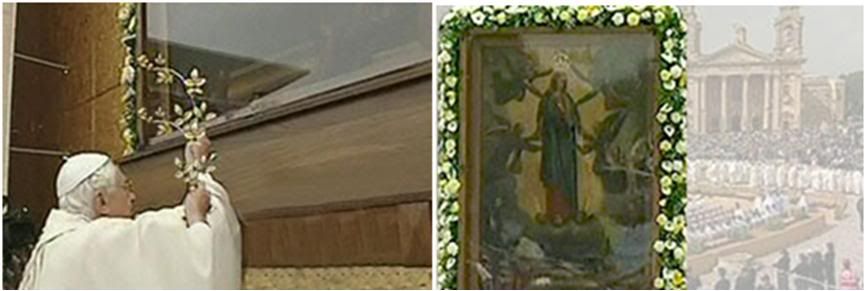
Before the Regina caeli prayers after the Mass, the Holy Father offered a Golden Rose to the image of the Madonna of Ta'Pinu, whose basilica is located in the village of Gharb on Malta's other large island, Gozo.
The image was brought to Valletta specially to preside over the Mass in Floriana, elevated on the right wall of the altar stage with a manteltop beneath it, with a vase on which the Pope deposited the Golden Rose.
Benedict XVI has offered a Golden Rose as the highest papal homage to the Marian shrines he has visited in Italy and abroad that had not previously received the honor before (like Lourdes and Aparecida).
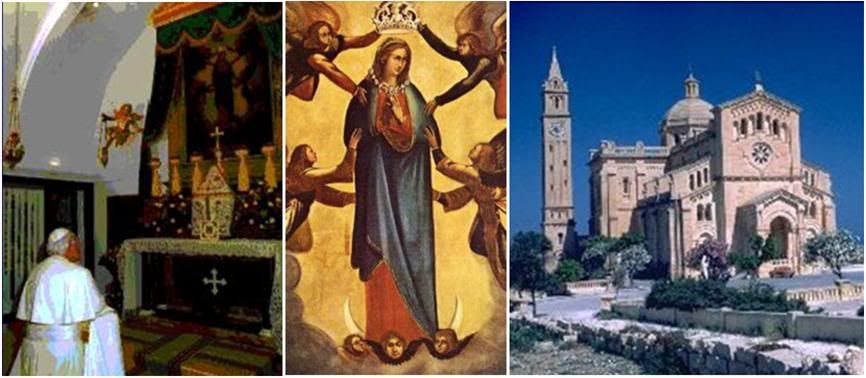 When John Paul II visited the Ta'Pinu shrine in 1990, he had Mary's crown on the image traced out in gold metal.
In 1883, a village woman, Karmela Grima, heard a voice calling her from the Ta'Pinu chapel in Gharb that had been there since the early 17th century, with an image of the Madonna. The voice asked her to pray and said she would be unable to return for a year. She never told anyone about the encounter but she did fall ill and was unable to leave her bed for a year. In 1885, she told a friend, Francesco Portelli, about her experience. Francesco said he had heard a similar voice asking him to pray in honor of Christ's wounds, while he was carrying the Cross during a Good Friday devotion. Shortly thereafter, his mother was miraculously healed through the intercession of the Madonna of Ta'Pinu. The local bishop questioned both Karmela and Francesco closely, and decided that the voices they heard were of heavenly origin.
When John Paul II visited the Ta'Pinu shrine in 1990, he had Mary's crown on the image traced out in gold metal.
In 1883, a village woman, Karmela Grima, heard a voice calling her from the Ta'Pinu chapel in Gharb that had been there since the early 17th century, with an image of the Madonna. The voice asked her to pray and said she would be unable to return for a year. She never told anyone about the encounter but she did fall ill and was unable to leave her bed for a year. In 1885, she told a friend, Francesco Portelli, about her experience. Francesco said he had heard a similar voice asking him to pray in honor of Christ's wounds, while he was carrying the Cross during a Good Friday devotion. Shortly thereafter, his mother was miraculously healed through the intercession of the Madonna of Ta'Pinu. The local bishop questioned both Karmela and Francesco closely, and decided that the voices they heard were of heavenly origin.
Devotion to Our Lady of Ta'Pinu grew rapidly, and it became the major shrine in Malta. Construction of the actual Romanesque basilica did not begin until 1920.
[Modificato da TERESA BENEDETTA 18/04/2010 18:44] |
| |
 18/04/2010 16:01 18/04/2010 16:01 |
|
| | | OFFLINE | | Post: 19.965
Post: 2.606 | Registrato il: 28/08/2005
Registrato il: 20/01/2009 | Administratore | Utente Veteran | |
|

 Two years ago to the day, in Washington, DC, Pope Benedict XVI met with some abuse victims from the Boston area who were taken to see him by Cardinal Sean O'Malley. God's ways are truly inscrutable...
Pope meets with
Two years ago to the day, in Washington, DC, Pope Benedict XVI met with some abuse victims from the Boston area who were taken to see him by Cardinal Sean O'Malley. God's ways are truly inscrutable...
Pope meets with
abuse victims in Malta

 On Sunday 18 April 2010, in the Apostolic Nunciature in Malta, the Holy Father met a small group of persons who were sexually abused by members of the clergy.
On Sunday 18 April 2010, in the Apostolic Nunciature in Malta, the Holy Father met a small group of persons who were sexually abused by members of the clergy.
He was deeply moved by their stories and expressed his shame and sorrow over what victims and their families have suffered. He prayed with them and assured them that the Church is doing, and will continue to do, all in its power to investigate allegations, to bring to justice those responsible for abuse and to implement effective measures designed to safeguard young people in the future.
In the spirit of his recent Letter to the Catholics of Ireland, he prayed that all the victims of abuse would experience healing and reconciliation, enabling them to move forward with renewed hope.
VALLETTA, Malta, April 18 (AP) — Pope Benedict XVI met with a group of clerical abuse victims Sunday and promised them the Catholic Church would implement "effective measures" to protect young people in the future.
The Vatican said Benedict expressed his "shame and sorrow" at the pain the men and their families suffered and prayed with them during the meeting at the Vatican's embassy in Malta.
It was the first time Benedict had met with abuse victims since the worldwide clerical abuse scandal engulfed the Vatican earlier this year. [It was the first opportunity he's had to do it, for heaven's sake!]
"He prayed with them and assured them that the Church is doing, and will continue to do, all in its power to investigate allegations, to bring to justice those responsible for abuse and to implement effective measures designed to safeguard young people in the future," a Vatican statement said.
Victims' advocacy groups have demanded that the Vatican take concrete steps to protect children and remove abusive priests, saying the Pope's expressions to date of solidarity and shame are meaningless unless actual action is taken.
[It's the local bishop's direct responsibility, not the Pope's, to take 'actual action'.]
Benedict's overnight trip to Malta -- scheduled to commemorate the 1,950th anniversary of St. Paul's shipwreck -- has been overshadowed by expectations that the Pope would make a strong gesture to repair the damage of the scandal. [And who has done everything to make sure the visit itself is 'overshadowed' - by simply reporting the media's wishful thinking????]
Benedict has been accused by victims' groups and their lawyers of being part of systematic practice of coverup by church hierarchy for pedophile priests, in his earlier roles as an archbishop in Germany and later at the helm of the Vatican morals office.
Ten Maltese men came forward earlier this month saying they wanted to meet with the Pope to tell him their stories and to request an apology. They say they were abused by four priests at a Catholic orphanage.
Benedict made no direct reference to the scandals during a Mass Sunday morning. He told Maltese to cling to their faith despite the temptations of modern society.
"Many voices try to persuade us to put aside our faith in God and his Church," he warned.
The media, in this case, particularly AP, are throughly despicable. Like the victims themselves and the Holocaust cultists among the Jews, nothing the Church or the Pope can say or do will ever be enough. In fact, even the patently good things the Church and its conscientious bishops are doing are deliberately nd made out to be bad - like all the three charges they have tried to rig against Benedict XVI so far.
The AP has added the following to its initial report:
Tearful Pope says Church
will better protect the young
by VICTOR SIMPSON

...The Vatican said the group of eight men, in their 30s and 40s, met with Benedict in the chapel of the Vatican embassy.
"Everybody was crying," one of the men, Joseph Magro, 38, told Associated Press Television News after the meeting. "I told him my name was Joseph, and he had tears in his eyes."
He said the men received a call Sunday morning to come to the embassy and that the Pope spent a few minutes with each one of them. He said the overall encounter, which lasted about 35 minutes, was "fantastic."
Lawrence Grech, who led efforts to arrange the encounter, said the Pope told each of the men: "I am very proud of you for having come forward to tell your story."
"It was something big," Grech said.
At the end, they prayed together and the Pope gave his blessing, the Vatican said.
"The climate was intense but very serene," said Vatican spokesman the Rev. Federico Lombardi.
The private meeting was only confirmed after it had occurred — as was the case when Benedict met with abuse victims in the United States and Australia in 2008.
The main U.S. victims group, Survivors Network of Those Abused by Priests, said it was easy for Benedict to make promises about taking action to protect children.
"Not a single adult should feel relieved until strong steps are actually taken, not promised, that will prevent future child sex crimes and cover ups," said Peter Isely, the group's midwest director. [Yeah, yeah, yeah. Alright already!]
The AP, of course, had no choice but to report what the victims said about the meeting, and we are thankful that they did. We can only pray that all open-minded persons who read their simple account will recognize the Holy Father's profound sincerity and goodness.... which are above and beyond any 'PR' considerations.
Vatican Radio has a report on Fr. Lombardi's news conference:
Pope was 'deeply moved',
says Fr. Lombardi

Vatican Press Office Director, Fr Federico Lombardi held a press conference shortly after the Pope’s meeting with the victims. He described the meeting as “intense”, yet “serene”. He said Pope Benedict XVI was ‘deeply moved’ by what each of the victims had to tell him.
Fr Lombardi told journalists that the entire meeting lasted about 35 minutes and was held in the Chapel of the nunciature. The meeting started with prayer and then the Pope received the victims individually. The meeting ended with all present praying together and the Pope then blessed the victims.
There had been intense press speculation regarding this meeting in the weeks leading up to Pope Benedict’s arrival here, yesterday evening. Responding to newsmen, Fr Federico Lombardi S.J, repeated what he had always said, that if the meeting was to take place it would be a private and personal encounter and that is exactly what it was.
The eight men, who are now mostly in their mid-to–late 30’s and 40’s, were abused by priests as children at St Joseph’s orphanage in Malta. They had requested this meeting with Pope Benedict through their bishops, Bishop Mario Grech of Gozo, and Archbishop Paul Cremona. The bishops accompanied them this morning.
After the meeting, Lawrence Grech, spokesman for the group and himself a victim, spoke to the press at the press centre in Valetta. Visibly moved he told journalists that his personal encounter with the Pope had given him great spiritual courage.
Speaking to the Times of Malta he said:”We now have peace in our hearts, even because the Pope found time to meet us. We now look forward to the end of the court case, and closure of this chapter."
It's been a bit frustrating that no single agency has been able to report everything Lawrence Grech said, so I have gone through all the reports I can find in English and Italian, and have found the two best accounts that reports things the other reports don't:
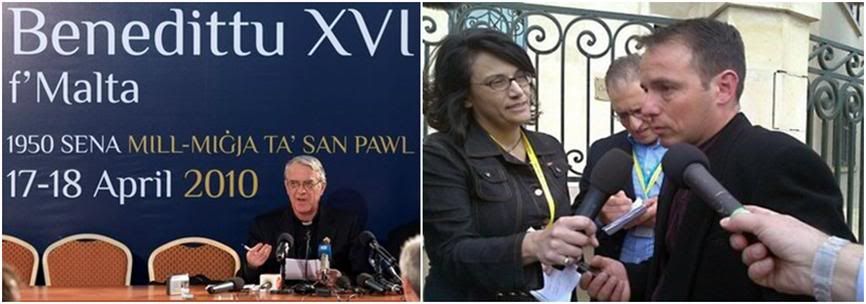 Fr. Lombardi gicves an impromptu news conference - and so does Lawrence Grech, accosted by newsmen.
What Grech said
Fr. Lombardi gicves an impromptu news conference - and so does Lawrence Grech, accosted by newsmen.
What Grech said
about the meeting
Translated from

"I saw the Pope weep with emotion and I feel liberated of a great weight," said Lawrence Grech, one of eight abuse victims the Pope met with at the Apostolic Nunciature in Rabat early this afternoon.
"I did not hope for apologies from the Pope, but I saw in him and the Bishop of Malta the humility of a Church which at that moment represented all the problems of a modern Church."
Grech said the Pope had "laid his hand on the head of each of us who were present when he blessed us. I felt such a great weight lifted from me. For so long, I have not gone to Mass, I had lost my faith, but now I feel I am a convinced Catholic again."
" The meeting with the Pope", he said, " is the greatest gift I have ever received after the birth of my daughter," alth0ugh ne was not able to be at the little girl's third birthday party today because of the meeting with the Pope.
Grech, 35, despite the abuses he suffered as a boy who grew up in an orphanage, is now a small business owner. After ten years spent in Australia, he has a carpet-cleaning business and is the only one among the ten victims who is self-employed.
 reports this reports this:
Grech told AFP he was impressed by Benedict's "humility", adding that the 83-year-old pontiff "was ready to take on the embarrassment (for deeds) done by others. He was very courageous."
The Pope was "the topmost person who could have listened to me and my story," Grech said. "I will continue my battle, not against the Church but against pedophilia."
[Modificato da TERESA BENEDETTA 18/04/2010 23:09] |
| |
 18/04/2010 16:24 18/04/2010 16:24 |
|
| | | OFFLINE | | Post: 19.966
Post: 2.606 | Registrato il: 28/08/2005
Registrato il: 20/01/2009 | Administratore | Utente Veteran | |
|


 Top German bishop
Top German bishop
assures Pope of solidarity

BERLIN, April 18 (AP) — The top bishop in Pope Benedict XVI’s homeland offered the Pope "unreserved solidarity" on Sunday as the Pontiff marks the fifth anniversary of his election amid the worldwide sex abuse scandal. ['Worlwide? Ireland, Germany, Austria, Switzerland, Holland and Malta - even throw in the US and Canada - is 'worldwide'? It's only the MSM that is calling it that because they know if they say it often enough, it sticks!]
Archbishop Robert Zollitsch, the head of the German bishops’ conference, wrote in a congratulatory letter that "even if we are experiencing difficult times at the moment, we must not become fainthearted."
He thanked the {ope for his "encouraging words, which testify to living belief in our Lord," but did not elaborate. [Zollitsch was writing the Pope, not the media, and if the media not 'elaboration' for that statement, the Pope certainly does not!]
The Pope’s native Germany has been among the countries shaken this year by allegations of sexual abuse by clerics. Benedict hasn’t yet spoken directly about the cases in Germany. [Oh yes, he did - directly to Mons. Zollitsch at the Vatican, after which Zollitsch gave a news conference to convey the Pope's sentiments. But all MSM seem to have forgotten that ever took place! Not that, from the way AP reports it, most Germans would care anyway what the Pope said even if he said anything. Yes, 'Wir sind Papst' at a history-making moment, but after that, perhaps Der Spiegel's viciousness typifies the 'contempt' they have!]
Benedict can rely on the German Church’s "full support" in the coming years, Zollitsch wrote. "You can be sure of our unreserved solidarity," he added.
Benedict was elected five years ago Monday to succeed the late Pope John Paul II.
"Pope Benedict is giving us a spiritual papacy that is marked by theological depth," Zollitsch wrote in a separate article for the Vatican’s daily newspaper, L’Osservatore Romano.
"With a fine and sure touch, he points to the modern threats to human life that hide behind, for example, globalization and faith in progress," such as unrestrained capitalism and excesses in biotechnology, the archbishop wrote.
Zollitsch highlighted Benedict’s search for dialogue with other religions and said that he has a deep connection with Jews — "for all the commotion around the Williamson affair."
The Pope drew criticism for his handling of British Bishop Richard Williamson — one of a group of ultraconservative bishops whose excommunications were reversed just as Williamson was shown on Swedish television asserting that historical evidence was against the Nazis having gassed millions of Jews.
Zollitsch didn’t refer directly to the abuse scandal, but wrote that "even if there are dark hours in our Church, every moment is valuable in this papacy, which lives from the full strength of the Lord and so is marked by hope, as the Pope himself has said."
Which reminds me that I still have to translate that OR article by Zollitsch....[Modificato da TERESA BENEDETTA 18/04/2010 18:25] |
| |
 18/04/2010 20:38 18/04/2010 20:38 |
|
| | | OFFLINE | | Post: 19.967
Post: 2.608 | Registrato il: 28/08/2005
Registrato il: 20/01/2009 | Administratore | Utente Veteran | |
|

 THE POPE IN MALTA:
THE POPE IN MALTA:
MEEETING THE YOUTH
The meeting held on the waterfront of the Grand Harbour in Valletta was preceded by a three-mile boat trip from Kalkara across the bay, in which the Holy Father was accompanied by a group of youths representing their colleagues.
It was similar to the boat ride down the Rhine that he took to disembark in Cologne for the 2005 World Youth Day, and for the 'boatacade' that took him to Sydney Harbor for WYD 2008.
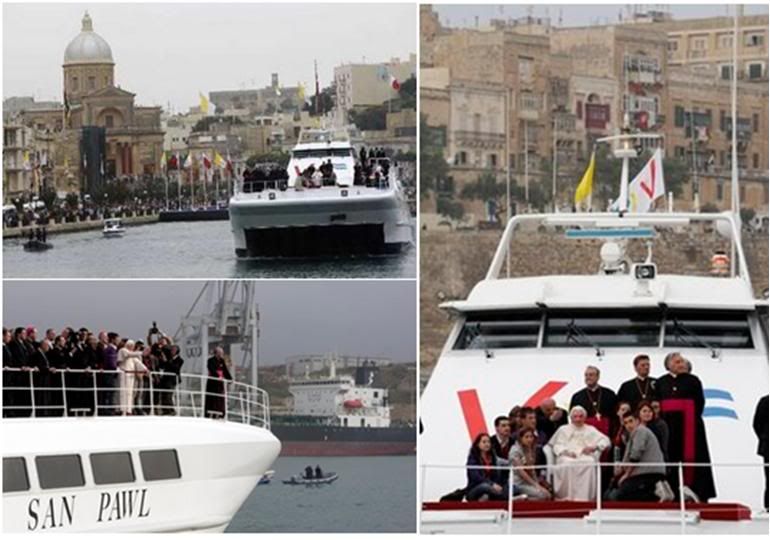
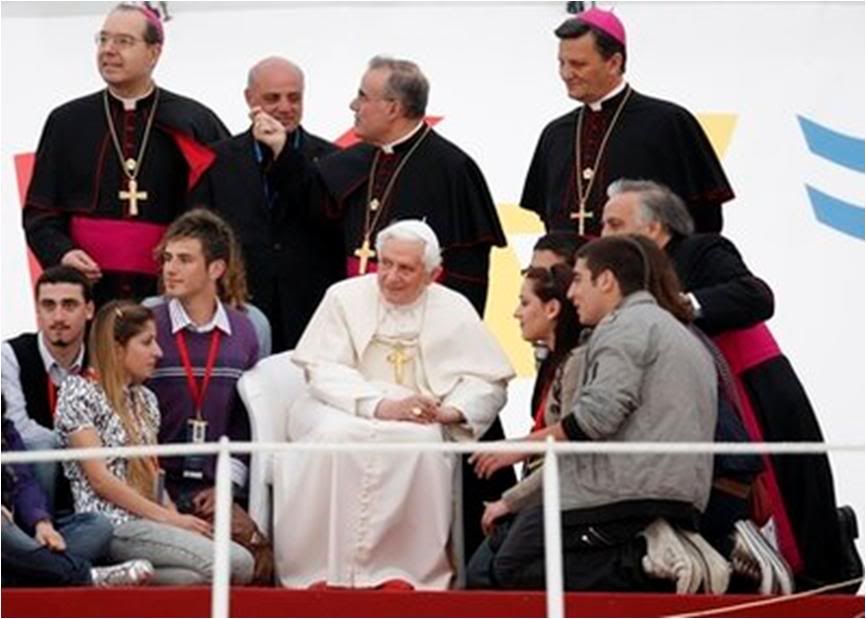 Flotilla escorts Pope's boat
Flotilla escorts Pope's boat
across Grand Harbour

A flotilla of nearly 100 small boats escorted Pope Benedict as he crossed Grand Harbour on a catamaran this afternoon.
Fog horns blared and historic cannons were fired by re-enactors at the Upper Barrakka as the catamaran made its way slowly from Kalkara to the Valletta Waterfront.
The scene was reminiscent, although smaller and more orderly, than the welcome given to Pope John Paul II in 1989 when he sailed into Grand Harbour after returning from Gozo.
Pope Benedict spent most of the trip sitting on a white chair in front of the bridge, chatting to a group of 10 young people who sat on the deck around him.
Earlier, he had been given a rousing welcome by the people of Kalkara, who waved papal flags as two bands played.
The catamaran followed an AFM patrol boat out of Kalkara Creek, with regatta boats on either side.
They were joined by a large number of other boats as they rounded Fort St Angelo, forming a long trail on the fairway as the catamaran headed for the waterfront.
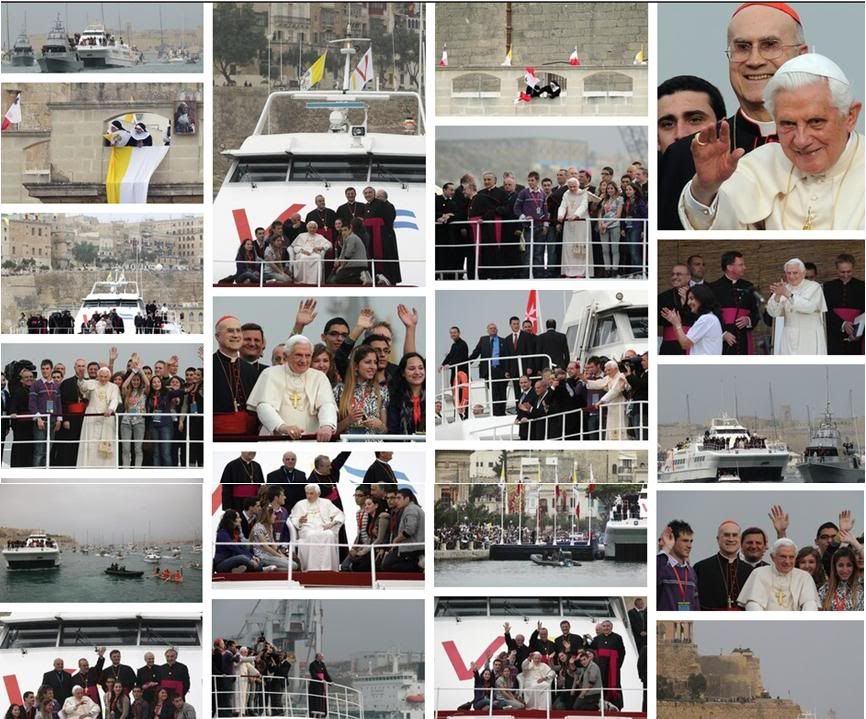
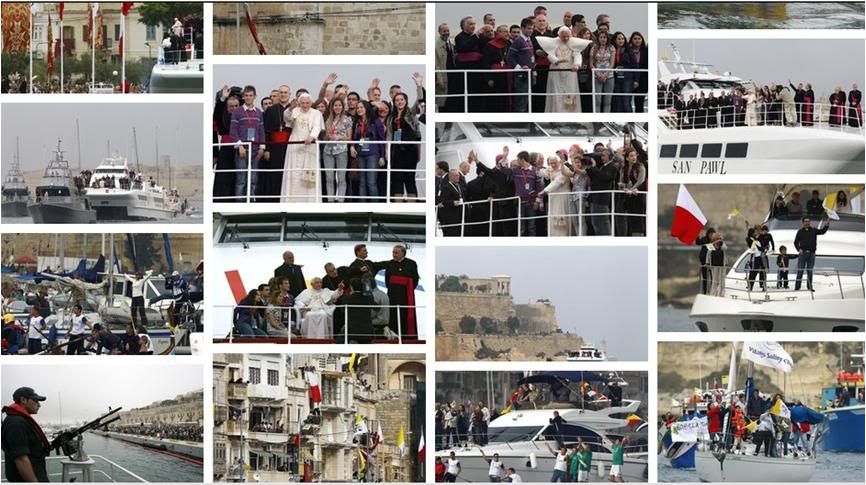
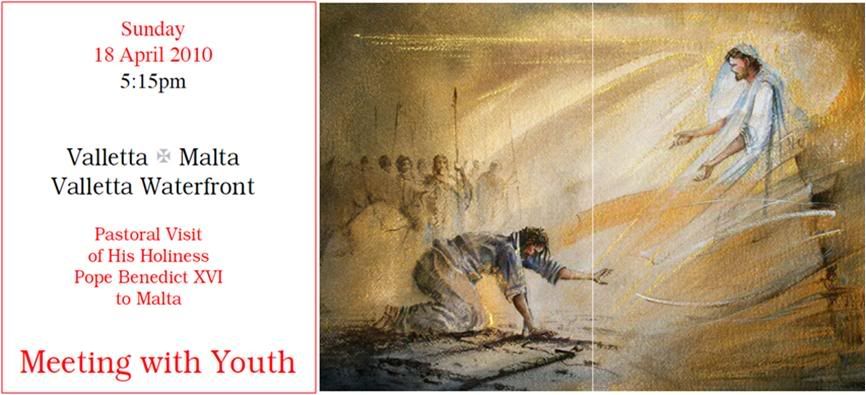 Enthusiastic welcome for the Pope
Enthusiastic welcome for the Pope

Pope Benedict was given an enthusiastic welcome when he arrived at Valletta Waterfront this afternoon for a meeting with youths.
Some 10,000 young people cheered the Pope as he arrived at the waterfront after a catamaran crossing from Kalkara which was reminiscent, but smaller, than the welcome given to Pope John Paul 21 years ago.
The Pope, 83, looked tired but happy as he walked on the waterfront while the youths clapped and sang religious songs.
Youths started gathering on the waterfront at 2 p.m. Gates were closed at about 5 p.m. for safety reasons, but they were later reopened to allow more people in, and all areas were full by the time the Pontiff arrived.
Once the singing was over, the youths chanted "Benedetto, Benedetto" as they waved Vatican and Maltese flags.
After opening prayers led by the Holy Father, Mons. Mario Grech, Archbishop of Gozo, delivered a greeting to the Holy Father, followed by testimonials from six young persons (including a married couple) who spoke of how they seek to live the faith and the probllems they encounter in doing this.
The Church rejects no one,
Pope tells Malta's young

18 Apr 10 (RV) - On Sunday evening, Pope Benedict XVI challenged Maltese youth to counter the current secularist culture in Europe by holding out a “hand of friendship to members of all faiths and none”.
He also urged them to be proud that their country “both defends the unborn and promotes stable family life by saying no to abortion and divorce”.
Pope Benedict was answering the questions put to him by a young man representing those who feel marginalised by the Church, a committed Church member, a couple preparing for marriage and a young man preparing for the priesthood.
A flotilla of nearly 100 small regatta boats had earlier escorted Pope Benedict on the crossing from Kalkara to the Waterfront of Valetta’s Grand Harbour where tens of thousands of young people had been waiting since midday.
Their songs and chants were drowned out by the blaring fog horns of ships and the blasts of cannons fired from the hill tip town as the catamaran on which Pope Benedict was travelling arrived at the Waterfront.
There he told them “In the context of European society, Gospel values are once again becoming counter-cultural, just as they were at the time of Saint Paul... You may well encounter opposition to the Gospel message. To all of you who wish to follow Christ, I say, do not be afraid!”
A young man representing those who feel in some way alienated from the Church had earlier told Pope Benedict that “one of our deepest wounds stems from the fact that it seems almost as if we are less readily accepted and treated with dignity by the Christian community than we are by all other members of society.”
“We too wish to give our contribution to the Catholic community” he added.
“God rejects no one. And the Church rejects no one”, was the Popes reply. “God loves every one of us with a depth and intensity that we can hardly begin to imagine”.
Here is the full text of the Pope's address:
Żgħażagħ Maltin u Għawdxin, jien kuntent ħafna li ninsab maghkom,
What a joy it is for me to be with you today on your native soil! On this significant anniversary, we thank God for sending the Apostle Paul to these islands, which were thus among the first to receive the Good News of Our Lord Jesus Christ.
I warmly greet Archbishop Cremona, as well as Bishop Grech whom I thank for his kind words, and all the bishops, priests and religious who are here.
Most especially, I greet you, young people of Malta and Gozo, and I thank you for speaking to me of the matters that concern you most deeply. I appreciate your desire to seek and find the truth, and to know what you must do to attain the fullness of life.
Saint Paul, as a young man, had an experience that changed him for ever. As you know, he was once an enemy of the Church, and did all he could to destroy it. While he was travelling to Damascus, intending to hunt down any Christians he could find there, the Lord appeared to him in a vision. A blinding light shone around him and he heard a voice saying, “Why do you persecute me? … I am Jesus, whom you are persecuting” (Acts 9:4-5).
Paul was completely overcome by this encounter with the Lord, and his whole life was transformed. He became a disciple, and went on to be a great apostle and missionary. Here in Malta, you have particular reason to give thanks for Paul’s missionary labours, which spread the Gospel throughout the Mediterranean.
Every personal encounter with Jesus is an overwhelming experience of love. Previously, as Paul himself admits, he had “persecuted the church of God violently and tried to destroy it” (Gal 1:13). But the hatred and anger expressed in those words was completely swept away by the power of Christ’s love. For the rest of his life, Paul had a burning desire to carry the news of that love to the ends of the earth.
Maybe some of you will say to me, Saint Paul is often severe in his writings. How can I say that he was spreading a message of love? My answer is this. God loves every one of us with a depth and intensity that we can hardly begin to imagine. And he knows us intimately, he knows all our strengths and all our faults.
Because he loves us so much, he wants to purify us of our faults and build up our virtues so that we can have life in abundance. When he challenges us because something in our lives is displeasing to him, he is not rejecting us, but he is asking us to change and become more perfect. That is what he asked of Saint Paul on the road to Damascus.
God rejects no one. And the Church rejects no one. Yet in his great love, God challenges all of us to change and to become more perfect.
Saint John tells us that perfect love casts out fear (cf. 1 Jn 4:18). And so I say to all of you, “Do not be afraid!”
How many times we hear those words in the Scriptures! They are addressed by the angel to Mary at the Annunciation, by Jesus to Peter when calling him to be a disciple, and by the angel to Paul on the eve of his shipwreck.
To all of you who wish to follow Christ, as married couples, as parents, as priests, as religious, as lay faithful bringing the message of the Gospel to the world, I say, do not be afraid!
You may well encounter opposition to the Gospel message. Today’s culture, like every culture, promotes ideas and values that are sometimes at variance with those lived and preached by our Lord Jesus Christ.
Often they are presented with great persuasive power, reinforced by the media and by social pressure from groups hostile to the Christian faith. It is easy, when we are young and impressionable, to be swayed by our peers to accept ideas and values that we know are not what the Lord truly wants for us.
That is why I say to you: do not be afraid, but rejoice in his love for you; trust him, answer his call to discipleship, and find nourishment and spiritual healing in the sacraments of the Church.
Here in Malta, you live in a society that is steeped in Christian faith and values. You should be proud that your country both defends the unborn and promotes stable family life by saying no to abortion and divorce.
I urge you to maintain this courageous witness to the sanctity of life and the centrality of marriage and family life for a healthy society.
In Malta and Gozo, families know how to value and care for their elderly and infirm members, and they welcome children as gifts from God. Other nations can learn from your Christian example.
In the context of European society, Gospel values are once again becoming counter-cultural, just as they were at the time of Saint Paul.
In this Year for Priests, I ask you to be open to the possibility that the Lord may be calling some of you to give yourselves totally to the service of his people in the priesthood or the consecrated life.
Your country has given many fine priests and religious to the Church. Be inspired by their example, and recognize the profound joy that comes from dedicating one’s life to spreading the message of God’s love for all people, without exception.
I have spoken already of the need to care for the very young, and for the elderly and infirm. Yet a Christian is called to bring the healing message of the Gospel to everyone. God loves every single person in this world, indeed he loves everyone who has ever lived throughout the history of the world.
In the death and Resurrection of Jesus, which is made present whenever we celebrate the Mass, he offers life in abundance to all those people. As Christians we are called to manifest God’s all-inclusive love.
So we should seek out the poor, the vulnerable, the marginalized; we should have a special care for those who are in distress, those suffering from depression or anxiety; we should care for the disabled, and do all we can to promote their dignity and quality of life; we should be attentive to the needs of immigrants and asylum seekers in our midst; we should extend the hand of friendship to members of all faiths and none.
That is the noble vocation of love and service that we have all received. Let it inspire you to dedicate your lives to following Christ. La tibżgħux tkunu ħbieb intimi ta’ Kristu.
Dear young people, as I take my leave of you, I want you to know that I am close to you and I remember you and your families and friends in my prayers.
“Selluli għaż-żgħażagħ Maltin u Għawdxin kollha.”
[Modificato da TERESA BENEDETTA 18/04/2010 22:00] |
| |
 18/04/2010 20:57 18/04/2010 20:57 |
|
| | | OFFLINE | | Post: 19.968
Post: 2.609 | Registrato il: 28/08/2005
Registrato il: 20/01/2009 | Administratore | Utente Veteran | |
|

 Pope ends Malta visit
Pope ends Malta visit

April 18, 2010
Pope Benedict's 27-hour visit to Malta came to an end this evening after it made the international headlines when the Pontiff looked the child abuse issue in the eye by holding an unscheduled meeting with its victims.
The meeting, at the Apostolic Nunciature, was a historic first [???] for the Pontiff and appeared aimed at reinforcing the Pope's expressions of regret, especially in his letter to the Irish bishops a few weeks ago. ['Appeared aimed at nothing' except for what it was - a sincere desire to reach out to individuals who have been immeasurably harmed!]
The Holy See described the Pope's meeting with the victims as deeply moving. The victims themselves praised the Pope for his courage in meeting them and said the 35-minute encounter had given them peace in their hearts.
Earlier in the day, a crowd of some 50,000 people gathered in a drizzle for Papal Mass on the granaries in Floriana. [Media reports earlier said it was hoped at least 10,000 would come - that they did not think it would have the crowd of 30,000 that John Paul II drew in Floriana on his last visit.]
The sun came out shortly before the Pope arrived at the historic square, where, in his homily he urged the Maltese people to preserve their faith and values:
""No visitor to Malta could fail to be impressed by the devotion of your people, the vibrant faith manifested in your feast-day celebrations, the beauty of your churches and shrines. But that gift needs to be shared with others, it needs to be articulated," he said.
The Pope was received with enthusiasm wherever he went. People turned up in their hundreds particularly at Paola and Kalkara.
At the latter, the Pope boarded a catamaran for his crossing of Grand Harbour, accompanied by a flotilla of almost 100 small boats.
The Valletta Waterfront was heaving with some 10,000 young people who had been singing for some four hours before the Pontiff arrived.
The Pope told them that other nations could learn from Malta's Christian example.
"Here in Malta, you live in a society that is steeped in Christian faith and values. You should be proud that your country both defends the unborn and promotes stable family life by saying no to abortion and divorce. I urge you to maintain this courageous witness to the sanctity of life and the centrality of marriage and family life for a healthy society.
"In Malta and Gozo, families know how to value and care for their elderly and infirm members, and they welcome children as gifts from God. Other nations can learn from your Christian example."
The Pope's reference to other countries needing to follow Malta's example appeared to echo the call made 20 years ago in Malta by Pope John Paul II, who said that Europe needed Malta's faithful witness.
The Pope summed up his message to Malta in four lines in an address at the airport before departure.
"Be an example, at home and abroad, of dynamic Christian living. Be proud of your Christian vocation. Cherish your religious and cultural heritage. Look to the future with hope, with profound respect for God's creation, with reverence for human life, and with high esteem for marriage and the integrity of the family. Kunu wlied denji ta' San Pawl."
He also again referred to illegal immigration.
"I am aware of the difficulties that welcoming a large number of people may cause, difficulties which cannot be solved by any country of first arrival on its own. At the same time, I am confident that, on the strength of its Christian roots and its long and proud history of welcoming strangers, Malta will endeavour, with the support of other states and international organisations, to come to the aid of those who arrive here and to ensure that their rights be respected."
The two-day visit was a mixture of celebration and spirituality. The high point of celebration was undoubtedly the huge welcome which some 5,000 cheering children gave His Holiness at the Palace Square, Valletta, yesterday. The children sang Happy Birthday to the Pontiff in four languages as he waved from the Palace balcony, and he praised them for their enthusiasm.
The cacophony of the Palace Square was later replaced by the silent stillness of St Paul's Grotto, where the Pope prayed, alone and in silence, before a statue of St Paul in Malta's most important shrine.
The organisation of the visit went without a hitch, the only real worry having been that a cloud of volcanic ash drifting over Europe could have hindered the Pope's departure from Rome, or his return.
As it were, the Pope arrived in Malta with the Church under a cloud, and he must have left here satisfied that his visit had gone a long way to lifting it.
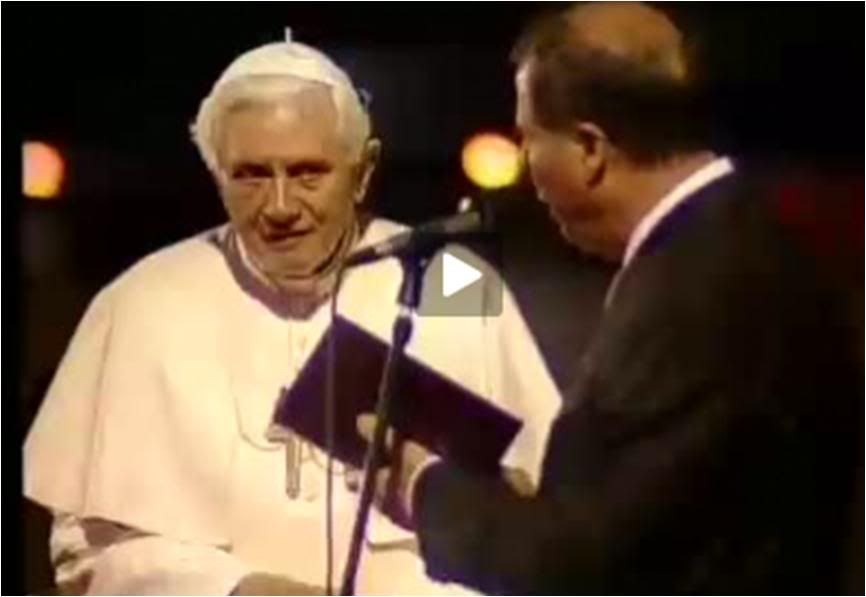
In his remarks to the Pope at the airport tonight, President George Abela thanked Pope Benedict for finding the time to personally meet Maltese victims of alleged child abuse.
“We were all moved today to learn that you personally met victims who allege abuse who requested to see you and that they found comfort in your words that I am sure will relieve some of the pain they have suffered for many years.
“Your sensitivity to their plight fills us with joy and I wish to thank you for finding the time to personally address this delicate issue.”
The President told Pope Benedict that his spirit would stay on “to continue nourishing our faith for a long time to come”.
Dr Abela said:
“Your blessings have fortified our faith, your gentle manners and kind words have warmed our hearts, your fatherly concern for our youth has endeared you to them, your inspired teaching has helped us all to understand better the beauty of Christian charity.
“Your presence among us and your travelling through our parishes, as the vicar of Christ and successor of Peter, will continue to enrich our lives and hopefully make us better Christians and better citizens.”
Dr Abela said he was confident Maltese Catholics would continue to openly and eloquently profess their faith and the Christian values of charity and solidarity and endeavour to share these gifts with others, in Malta and abroad.
The Pope’s visit, the President said, gave the people renewed strengthened to face the future more securely.
President Abela hoped His Holiness would take with him happy memories of his visit to the Island of St Paul and its inhabitants, their faith and hospitality recorded in the Holy Scripture.
“We, therefore, express our profound gratitude to you, ask for your blessing and wish you a safe journey to the Eternal City.
“Berikna u l-vjagg it-tajjeb.”
THE HOLY FATHER'S FAREWELL TO MALTA
Vatican Radio has released the text of the Holy Father's farewell address:
Mr President,
Your Excellencies,
Ladies and Gentlemen,
The time has come for me to bid farewell to Malta. I thank God for the opportunity to meet so many of you and to visit this beautiful island. I thank the President for his gracious words and I thank all of you who have given me such a warm and generous welcome.
My journey has given me a deeper appreciation of how the Gospel preached by Saint Paul has shaped the spiritual identity of the Maltese people.
As I leave you, let me encourage you once more to cultivate a deep awareness of your identity and to embrace the responsibilities that flow from it, especially by promoting the Gospel values that will grant you a clear vision of human dignity and the common origin and destiny of mankind.
Be an example, at home and abroad, of dynamic Christian living. Be proud of your Christian vocation. Cherish your religious and cultural heritage. Look to the future with hope, with profound respect for God’s creation, with reverence for human life, and with high esteem for marriage and the integrity of the family! Kunu wlied denji ta’ San Pawl!
On account of its geographical position in the heart of the Mediterranean, many immigrants arrive on Malta’s shores, some fleeing from situations of violence and persecution, others in search of better conditions of life.
I am aware of the difficulties that welcoming a large number of people may cause, difficulties which cannot be solved by any country of first arrival on its own.
At the same time, I am also confident that, on the strength of its Christian roots and its long and proud history of welcoming strangers, Malta will endeavour, with the support of other States and international organizations, to come to the aid of those who arrive here and to ensure that their rights be respected.
These noble goals depend on an unwavering dedication to the challenging task of dialogue and cooperation within the international and European communities, key forums in which Malta bears witness to the Christian values that have helped to shape her identity.
Unity, solidarity and mutual respect stand at the basis of your social and political life. Inspired by your Catholic faith, they are the compass that will guide you in the search for authentic and integral development.
The treasure of the Church’s social teaching will inspire and guide these efforts. Never allow your true identity to be compromised by indifferentism or relativism.
May you always remain faithful to the teaching of Saint Paul, who exhorts you to “be watchful, stand firm in your faith, be courageous, be strong. Let all that you do be done in love” (1 Cor 16:13-14). Grazzi ħafna, il-Bambin iberikkom!
Here is a nice quick essay from the English service of Vatican Radio. Too bad the producer did not sign his name. But bless him...
Pope leaves Malta -
An island of faith

(18 Apr 10 - RV) Two images remain burned in the mind of many those of us who accompanied Pope Benedict XVI to Malta. The face of Lawrence Grech, a victim of abuse by clergy as a child, in the aftermath of his personal encounter with the Pope in the Chapel of the Apostolic Nunciature in Rabat - The rosary gifted him by Pope Benedict hung around his neck, and his words, “peace... closure... courage".
The second is the face of Pope Benedict, an 83-year-old man, at the helm of a Church that of late has had to face the worst of storms.
And in the worst of storms the Pastor of the Universal Church came to Malta. The same Mediterranean Island where 1950 years ago Paul ran aground and first gave Christian hope to the Maltese people. A faith that down through the centuries remains undiminished.
In Acts the Saint himself writes of the people’s hospitality. From Pope Benedict’s arrival at Luqa international airport Saturday evening they stood four deep on the pavements to greet him. In Valetta the children filled the air with their song, in St Paul’s Grotto, the living Church of Malta presented Pope Benedict with their many missionaries - descendants of the great evangeliser.
Twice the Pope appealed to them not to abandon their faith, not to allow the winds of secularism that blow from the continent distract them.
At Mass in Granary Square in Floriana, he said: “No visitor to Malta could fail to be impressed by the devotion of your people, the vibrant faith manifested in your feast-day celebrations, the beauty of your churches and shrines. But that gift needs to be shared with others, it needs to be articulated”.
To the 10,000 young people who had sung themselves hoarse waiting for their Pope as he crossed Grand Harbour, to the sound of ship horn and cannon, he told them not to give in to peer pressure in a Europe where Gospel values are counter-culture.
“You should be proud that your country both defends the unborn and promotes stable family life by saying no to abortion and divorce. I urge you to maintain this courageous witness to the sanctity of life and the centrality of marriage and family life for a healthy society”.
At Luqa airport Sunday evening the Pope gave the entire nation a mandate:
“Be an example, at home and abroad, of dynamic Christian living. Be proud of your Christian vocation. Cherish your religious and cultural heritage. Look to the future with hope, with profound respect for God's creation, with reverence for human life, and with high esteem for marriage and the integrity of the family. Kunu wlied denji ta' San Pawl."
But one memory will remain with me in particular, Fr. John Cassar, a Jesuit Priest and the refugee’s mural on the walls of his office that spoke of war and of violence, sea journeys and detention,but also a window of blue Maltese sky, and the promise of hope.
As he took his leave Pope Benedict’s parting words were of Charity:
“I am aware of the difficulties that welcoming a large number of people may cause, difficulties which cannot be solved by any country of first arrival on its own. At the same time, I am confident that, on the strength of its Christian roots and its long and proud history of welcoming strangers, Malta will endeavour, with the support of other states and international organisations, to come to the aid of those who arrive here and to ensure that their rights be respected”.
And so, mission accomplished!
DEO GRATIAS!
BENEDICTUS QUI VENIT IN NOMINE DOMINI!
TOMORROW, THE FIRST 'LUSTRUM'...




[Modificato da TERESA BENEDETTA 18/04/2010 22:59] |
| |
 19/04/2010 01:52 19/04/2010 01:52 |
|
| | | OFFLINE | | Post: 19.969
Post: 2.610 | Registrato il: 28/08/2005
Registrato il: 20/01/2009 | Administratore | Utente Veteran | |
|
 THE HOLY FATHER'S EXTEMPORANEOUS HOMILY
THE HOLY FATHER'S EXTEMPORANEOUS HOMILY
TO THE PONTIFICAL BIBLICAL COMMISSION
April 15, 2010
This is a translation from the text of the homily published in the 4/18/10 issue of L'Osservatore Romano.
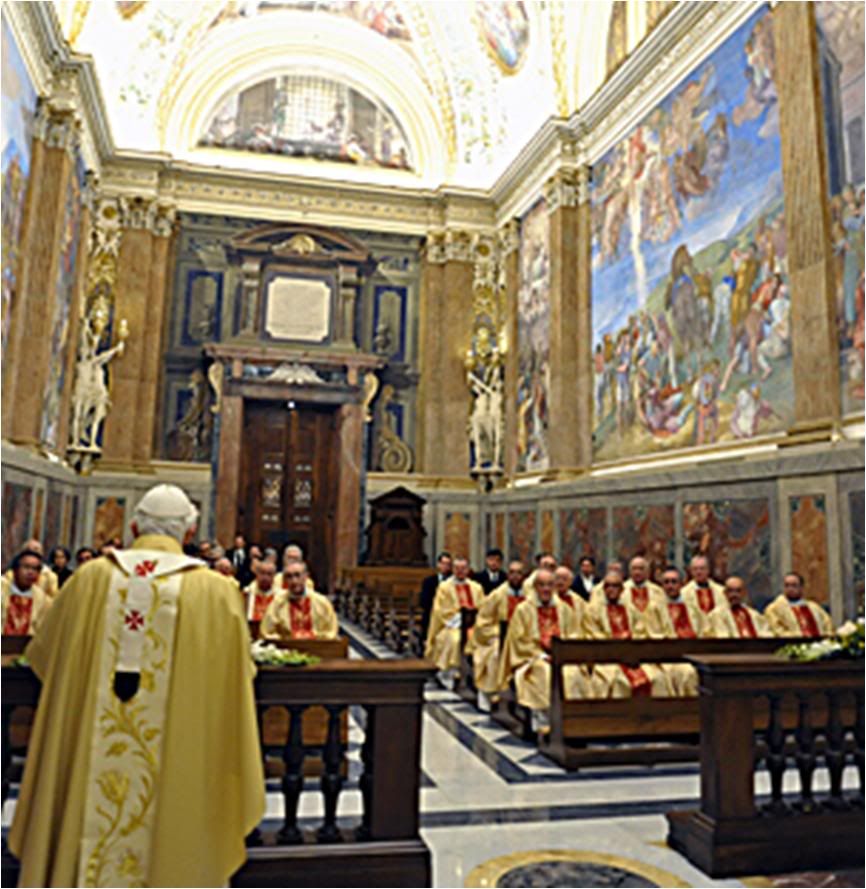
Dear brothers and sisters,
I did not have time to prepare a true homily. i would simply like to invite each of you to a personal meditation by underscoring some passages from today's liturgy that concern the prayerful dialog between us and the Word of God.
The sentence that I wish to propose for common meditation is this great affirmation by St. Peter: "We must obey God rather than men" (Acts 6,29).
St. Peter says this when facing the supreme [Jewish] religious institution, whom normally one had to obey, but God is above this institution, and God had given them [the Apostles] a new order: they should obey God. Obedience to God is freedom. Obedience to God gives them the freedom to oppose an institution.
Here, the exegetes call our attention to the fact that St. Peter's reply to the Sanhedrin is almost identical word for word to Socrates's reply to the judges of the Athens tribunal.
The tribunal had offered him freedom, liberation, provided he would not continue to 'seek God'. But the search for God was for him a superior mandate that came from God himself. A freedom bought by renouncing the journey towards God would no longer be freedom.
Therefore, [Socrates thought] he had to obey not his judges - he should not buy his life by losing himself, but he should obey God. Obedience to God has primacy.
Here, it is important to underscore that the main point is obedience, and that it is obedience which confers freedom. Modernity speaks of the liberation of man, of his full autonomy, and therefore, also his liberation from obedience to God. There should no longer be any such thing as obedience - man is free, he is autonomous, he needs no one.
But this autonomy is a lie: it is an ontological lie because man does not exist by himself and for himself, and it is also a political and practical lie because collaboration, sharing freedom, is necessary.
If God did not exist, if God were not a recourse accessible to man, then what remains as the supreme recourse is merely the consensus of the majority. Consequently, the majority consensus becomes the last word that one must obey.
This consensus - we know from the history of the last century - can also be 'a consensus for evil'.
So we see that so-called autonomy does not really liberate man. Obedience to God is freedom because He is the truth, he is the recourse that is above all human recourses. In the history of man, the words of Peter and Socrates are the true beacons for the liberation of man, for the man who knows how to see God, and in the name of God, can and should obey not men but Him, thus liberating himself from the positivism of human obedience.
Dictatorships have always opposed this obedience to God. Nazi dictatorship, like the Marxist, could not accept a God that would be above ideological power. And the freedom of the martyrs who acknowledge God precisely in their obedience to divine power, is an act of liberation through which Christ's own freedom comes to us.
Today, thank God, we no longer live under dictatorships, but there are subtle forms of dictatorship: a conformism that becomes obligatory - to think like everyone else thinks, act like everyone does - and the subtle aggressions against the Church (and even the less subtle) demonstrate how this conformism can really be a true dictatorship.
Thus, faced with this word obedience that began a new history of freedom in the world, let us pray above all to know God, to know him humbly and truly, to learn true obedience which is the foundation of human freedom.
Let us take a second sentence from the First Reading: St. Peter says that "God exalted Christ at his right hand as leader and savior" (cfr v 31). 'Leader' here is translated from the Greek archegos which implies a much more dynamic vision. Archegos is he who shows the way, who precedes - in a movement, a movement towards the 'on high'.
God had raised Christ to be at his right hand, so, to speak of Christ as the archegos is to say that Christ walks ahead of us, he precedes us and shows the way. To be in communion with Christ is to be on a journey of ascent with Christ. It means following Christ, in this journey upwards, following the archegos, he who has already been here, who precedes us and shows us the way.
Evidently, it is important to mention here where Christ is leading us, where it is we should arrive ourselves: hypsosen - upwards - to ascend to the right hand of the Father.
Following Christ is not simply an imitation of his virtues. It is not merely living in this world like Christ as much as possible, living according to his Word. It is a journey with a destination - the right hand of the Lord.
The journey of Christ ends at the right hand of the Father. The horizon of discipleship to Christ is his entire journey, up to arriving at the right hand of the Father.
We should understand anew that Christianity remains only a 'fragment' if we do not think of the ultimate goal, if we do not follow the archegos to the heights of God, to the glory of the Son who makes us God's children in him.
We should comprehend anew that Christianity reveals its sense fully only in the great perspective of eternal life. We should have the courage, the joy, the great hope that there is eternal life - that it is the true life from which comes the light that illuminates even this world.
If we can say that, even leaving aside eternal life promised by Heaven, it is better to live according to Christian criteria, because to live according to truth and love, even when under persecution, is good in itself and better than everything else. It is precisely this desire to live in truth and love that should open up to everyone the grandeur of God's plan for us, the courage to have here and now the joy of looking forward to eternal life, of the ascent to God following our archegos .
Soter [Greek word for saviour, deliverer] is the Saviour who saves us from ignorance, and seeks the ultimate things. The Savior saves us from being alone, he saves us from the void of a life without eternity, he saves us by giving us love in its fullness. He is the guide - Christ, the archegos, who saves us by giving us light, giving us truth, giving us the love of God.
Then, let us dwell on another verse: Christ the Savior has given Israel repentance and forgiveness of sins (v. 31). In the Greek text, the word is metanoia - that repentance and forgiveness of sins. For me, this is very important: (it says that) repentance is grace.
There is a tendency in exegesis to say that Jesus in Galilee announced unconditional grace, absolutely unconditional, therefore, a grace without repentance, grace as such, without human preconditions. But this is a false interpretation of grace.
Repentance is grace. It is a grace that we can recognize our sins, it is a grace that we acknowledge the need for renewal, for change, for a transformation of our being. Repentance - to be able to do penance - is a gift of grace.
I must say that we Christians have in recent times avoided the word repentance, which appears to us rather harsh. Now, under the attacks by a world that tells us of our sins, we can see that to do penance is a grace. We can see it is necessary to do penance - which is to acknowledge what is wrong in our life, to be open to forgiveness, to prepare for forgiveness, to allow ourselves to be transformed.
The pain of repentance, namely of purification, of transformation - such pain is grace, because it is renewal, the work of divine mercy.
Thus, the two things that St. Peter speaks of - repentance and forgiveness - correspond to the start of Jesus's preaching: "Metanoeite" - Repent! (Mt 1,19). This is the fundamental point: metanoia is not a private matter which would seem to be replaced by grace. Metanoia is the arrival of the grace that can transform us.
Finally, a sentence from the Gospel, where we are told that he who believes will have eternal life (cfr Jn 3,36). In faith, in this 'transforming oneself' that repentance gives us, in this conversion, this new way of living, we arrive at life, true life.
This brings to mind two other texts. In the Priestly Prayer, the Lord says: "Now this is eternal life, that they should know you, and the one whom you sent" (cfr Jn 17,2). To know what is essential, to know the dicisive Person, to know God and he whom he sent, is life, a knowledge of the realities that constitute life.
The other text is the reply of the Lord to the Sadducees regarding resurrection, when from the books of Moses, our Lord proves the fact of the Resurrection, by saying: God is the God of Abraham, of Isaac, of Jacob (cfr. Mt 22, 31-32; Mk 12, 26-27; Lk 20, 37-38). God is not a God of the dead. If he is the God of these men, then they live.
Whoever is inscribed in God's name participates in the life of God - he lives. To believe is to be inscribed in the name of God. And so we live. Whoever belongs to God is not dead - he belongs to a living God. This is the sense in which we must understand the dynamism of the faith, which is inscribing our name in the name of God, and thus, lets us enter into life.
Let us pray to the Lord so this may truly happen in our lives, that we may know God, that our name may enter into the name of God and that our existence may become true life: eternal life, love and truth.[/QUOTE
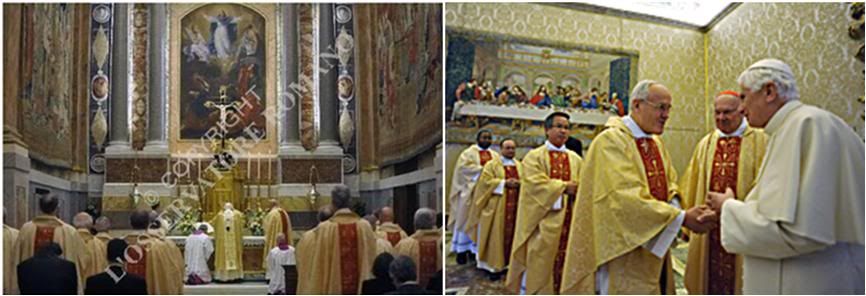
[Modificato da TERESA BENEDETTA 05/05/2011 21:23]
|
| |
 19/04/2010 14:35 19/04/2010 14:35 |
|
| | | OFFLINE | | Post: 19.970
Post: 2.611 | Registrato il: 28/08/2005
Registrato il: 20/01/2009 | Administratore | Utente Veteran | |
|
|
| |
 20/04/2010 09:24 20/04/2010 09:24 |
|
| | | OFFLINE | | Post: 19.971
Post: 2.612 | Registrato il: 28/08/2005
Registrato il: 20/01/2009 | Administratore | Utente Veteran | |
|

 THE MALTA VISIT ON O.R.
THE MALTA VISIT ON O.R.
OR for 4/19-4/20.
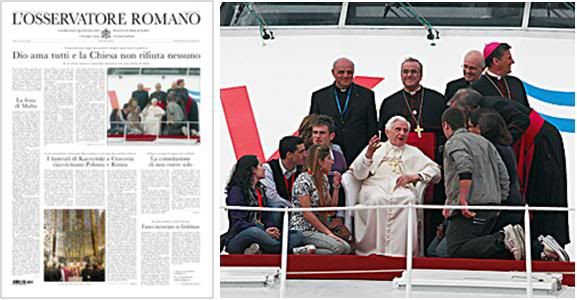 L'Osservatore Romano, under the erratic management of Giovanni Maria Vian, put out two special issues on Benedict XVI's visits abroad which I had hoped would be kept up - the first was the US visit in 2008. Then there was the issue on WYD in Sydney, with its incredibly rich spectrum of experiences and images - from the Pope's unprecedented stay at Bushwick to the transformative sights and sounds of secular Sydney converted for at least a week into the capital of contemporary Christianity in all its one, holy, and apostolic Catholicism. [P.S. I erroneously said earlier there was no special issue on Syndey, sorry!] The OR then came out with a special issue about the visit to France, but then nothing after that. Especially since the next foreign visit after France was the Pope;s firs trip to Africa, and the next one to the Holy Land. If a papal pilgrimage to the Holy Land does not deserve a special issue, what does?
L'Osservatore Romano, under the erratic management of Giovanni Maria Vian, put out two special issues on Benedict XVI's visits abroad which I had hoped would be kept up - the first was the US visit in 2008. Then there was the issue on WYD in Sydney, with its incredibly rich spectrum of experiences and images - from the Pope's unprecedented stay at Bushwick to the transformative sights and sounds of secular Sydney converted for at least a week into the capital of contemporary Christianity in all its one, holy, and apostolic Catholicism. [P.S. I erroneously said earlier there was no special issue on Syndey, sorry!] The OR then came out with a special issue about the visit to France, but then nothing after that. Especially since the next foreign visit after France was the Pope;s firs trip to Africa, and the next one to the Holy Land. If a papal pilgrimage to the Holy Land does not deserve a special issue, what does?
In effect, the April 19-20 OR is ths special issue on Malta. It includes, of course, all the papal texts delivered during the visit, as well as the send-off spech of President Abela (but strangely, not his welcome). It would have been good to include the greetings delivered by the ARchbishops of Malta and Gozo respectively to the Pope, because the hosts' welcome remarks are not just their tribute to the visitor but also a statement of the host Church's pastoral priorities. These are the photos OR posted online for the issue:
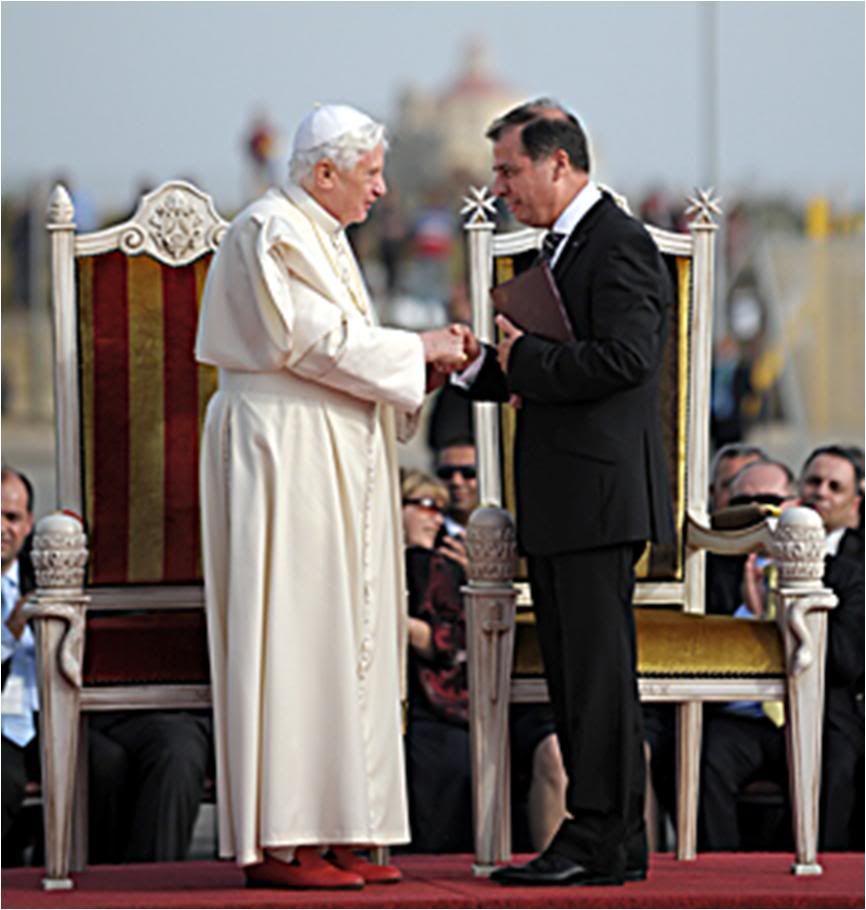
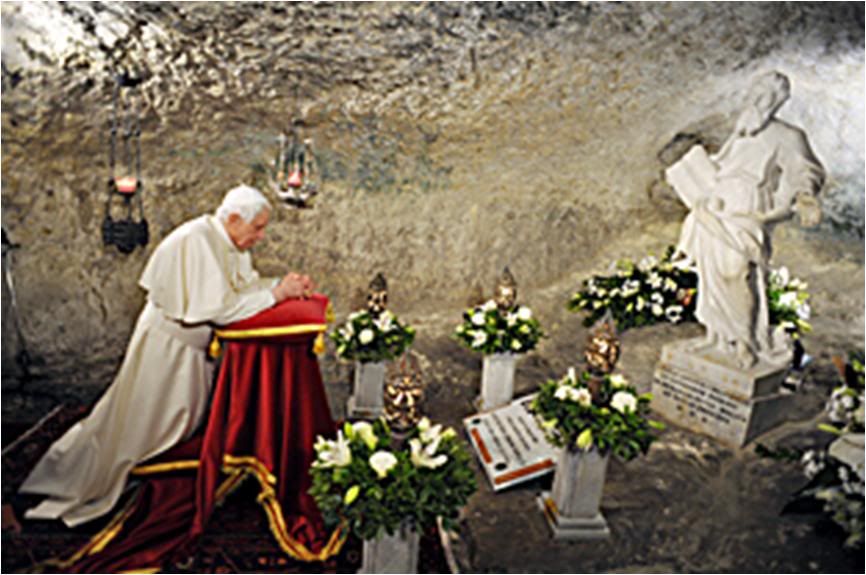
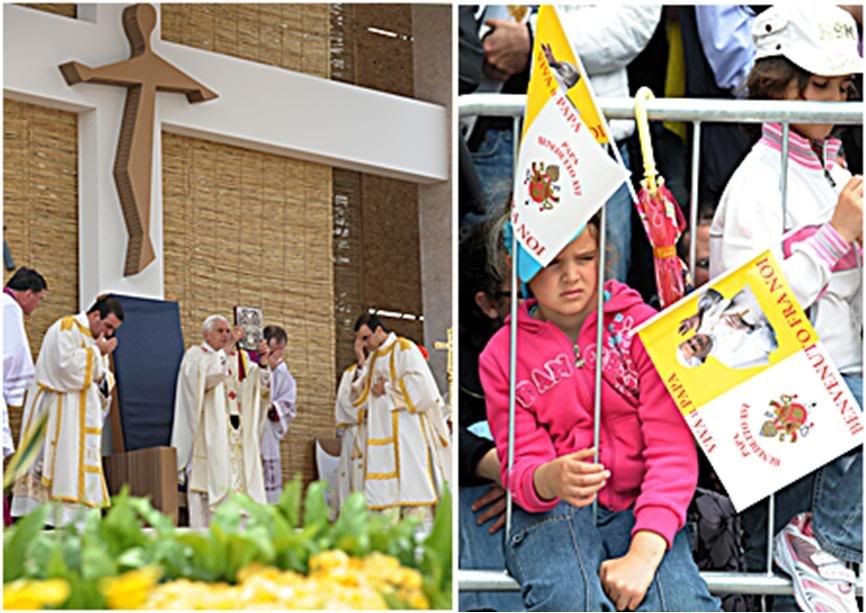
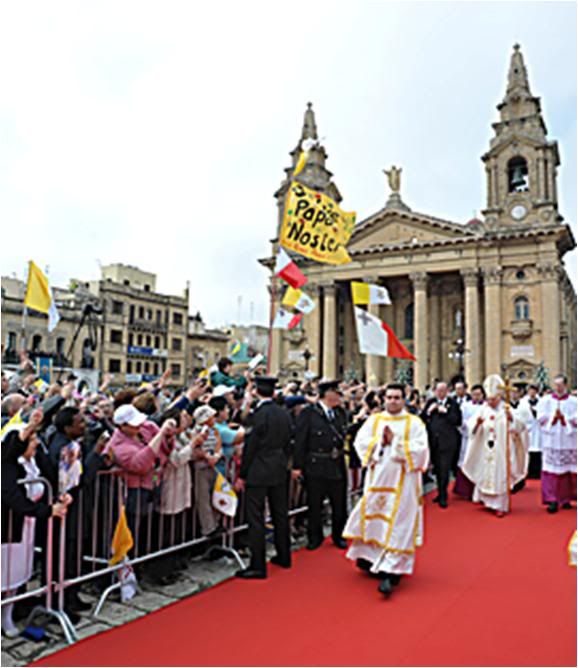
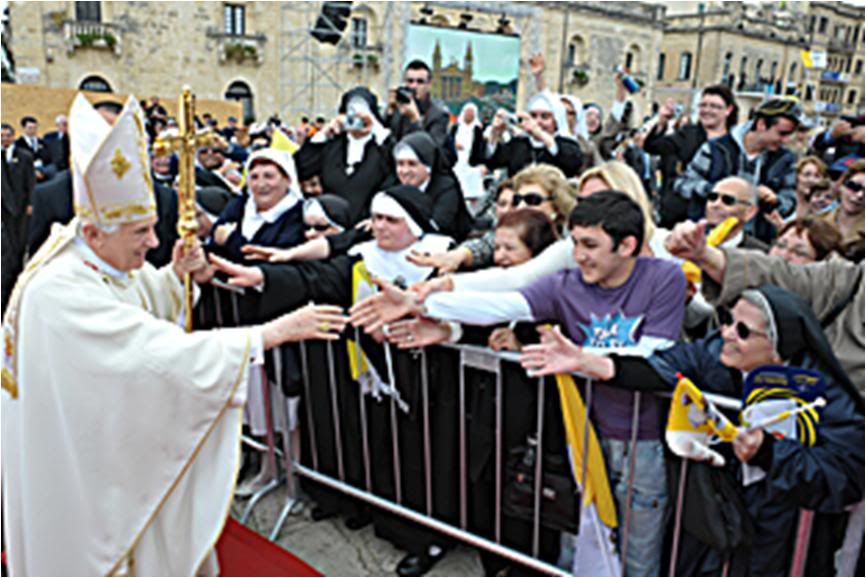
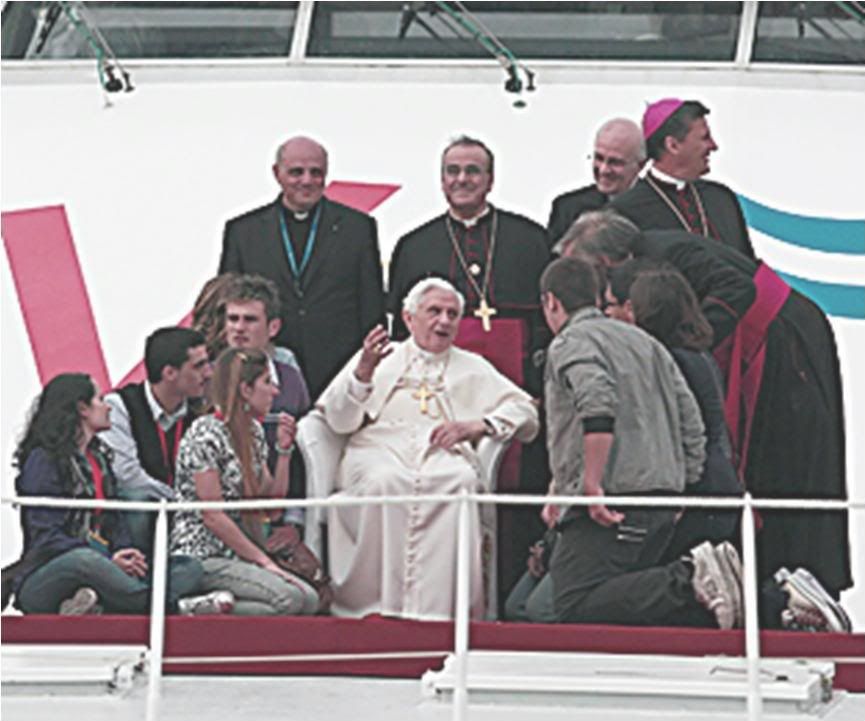
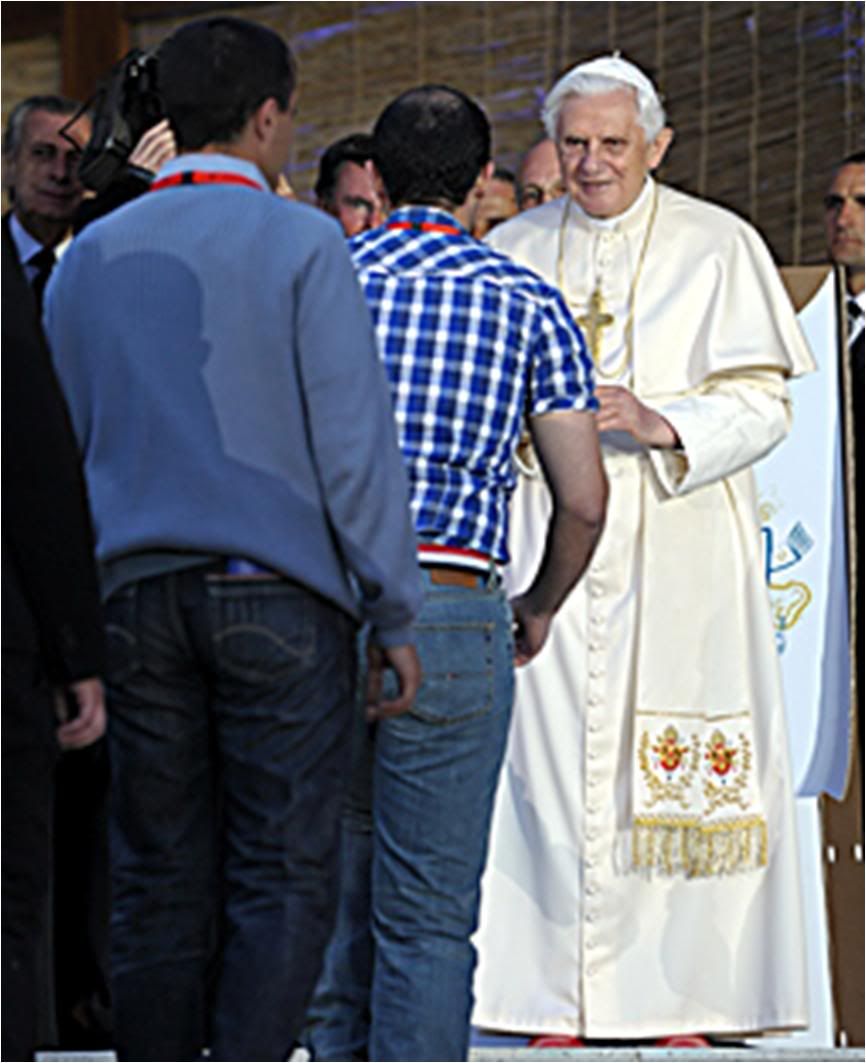
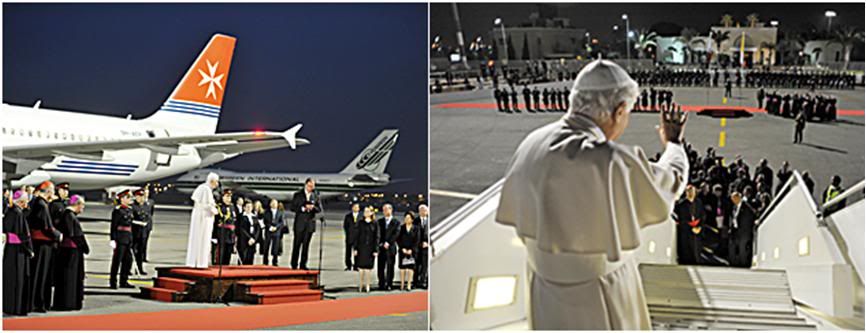 I am suffering from particularly extreme allergic reactions to all the pollen in the air and today was so bad I took an extra dose of my medications which knocked me out in the middle of the afternoon for the next 10 hours. To my horror, I lost the day. A terrible way to start off the sixth year of the Pontificate, so now I will try to play catch-up....
I am suffering from particularly extreme allergic reactions to all the pollen in the air and today was so bad I took an extra dose of my medications which knocked me out in the middle of the afternoon for the next 10 hours. To my horror, I lost the day. A terrible way to start off the sixth year of the Pontificate, so now I will try to play catch-up....
[Modificato da TERESA BENEDETTA 20/04/2010 14:47] |
| |
 20/04/2010 12:30 20/04/2010 12:30 |
|
| | | OFFLINE | | Post: 19.972
Post: 2.613 | Registrato il: 28/08/2005
Registrato il: 20/01/2009 | Administratore | Utente Veteran | |
|



 Of the many articles that have been written about our beloved Pope on the fifth anniversary of his election as Pope, let me translate first this one written by Rabbi Jacob Neusner for Corriere della Sera.... which also contains an authentic piece of news!
Benedict XVI: The power of reason
Of the many articles that have been written about our beloved Pope on the fifth anniversary of his election as Pope, let me translate first this one written by Rabbi Jacob Neusner for Corriere della Sera.... which also contains an authentic piece of news!
Benedict XVI: The power of reason
in dealing with other religions
by Rabbi Jacob Neusner
Translated from

Once in a gymnasium, when someone disputed my opinions about the New York Yankees as against the New York Mets. I said, "Don't try to change my mind. I am A professor, so I know I am right!" Unfortunately, instead of appreciating my humor, he pushed me against the wall!
When a scholar and intellectual is given the attribute of infallibility, then problems arise. A scholar does not need to be told he is infallible. He knows he is, especially if he has paid the price for it. Because the profession of research and study demands integrity, reason and intellectual honesty.
In the first five years as Pope, Joseph Ratzinger has shown all this, along with abundant humility, generosity and love.
But the world apparently needs more time to get used to this scholar Pope, who faces the fundamental issues directly and without hesitation - and ignores silliness whenever possible.
The Muslims found out what this Pope is made of in Regensburg, when with a very profound lecture, Benedict XVI cast doubt, in effect, on what Islam has actually contributed to civilization.
The Anglicans found out when, in an initiative of great honesty, he invited their clergy to come back into communion with Rome.
The Jews found out when he re-authorized a liturgy that included a prayer for the Jews.
In all three cases, the 'break' was quickly restored and the more moderate positions have prevailed: peace has been made with Islam, and conciliation with the Anglicans and the Jews.
And yet the scholar Pope did nothing but to express the truth as it is felt in the heart of Catholicism. Islam cannot compete with Christianity for moral authority, the Anglicans will always be welcome, and the Jews would be so much better if they converted.
Pope Benedict speaks as a scholar and states Christian truth as one would expect of the Bishop of Rome. He could not do less.
Meanwhile, a question which now agitates many is how the future Pope dealt with a priest who had sexually abused children in his care. Christian charity suggests forgiving a priest who had long been retired and apparently penitent and who was, moreover, dying. So Cardinal Ratzinger spared him the humiliation of the just punishment he deserved. The priest died in the bosom of the Church, and the future Benedict XVI underscored the meaning of Christian repentance and charity.
Last January, when I met the Pope in Rome, I asked him what his next project would be after the publication this year of the second volume of his book on Jesus of Nazareth.
He smiled, and said: "Nothing more. This is my last book. I have many other things to do".
A scholar who stops writing books is generally often considered a has-been. Of course, Benedict XVI did not need to say,"After all, I am Pope." And yet the academic in me remonstrated privately, "Yes, at what cost!"
What the world has learned in these past five years about the scholar Pope is the price that a true scholar must pay for sustaining truth and maintaining his own integrity.
People prefer politicians who are able to mediate and placate rather than persons who are critical and tend to start controversy. In general, this is an obvious lesson the world has learned from the scholar Pope.
But what I appreciate in him is something more. The true integrity of this man and his capacity to express the truth to all of mankind have mobilized very powerful interests.
And so, Muslims, Anglicans and Jews must be prepared for a continuing high-profile debate on reason and rationality that can be shared, in order to find a common point on conflicts and seek to establish what is right, and what Sacred Scriptures and Tradition counsel us.
[The article was translated for Corriere della Sera from Rabbi Neusner's original English by Esther Leibel. I expect the original will come out shortly in an English outlet, but so far I do not see it online.]
Another intellectual weighs in.... Alain Besancon (born 1932), Catholic, is a French historian of the Communist and Nazi totalitarianisms as well as of Christianity, who was elected in 1996 to a seat in the Academy of Moral and Political Sciences of the legendarily prestigious Institut de France, to which Cardinal Joseph Ratzinger himself was elected in 1992 to take the seat of the late Russian physicit Andrei Sakharov.
The restoration of intelligence
and the glory of martyrdom
by Alain Besançon
Translated from
the 4/19-4/20 issue of

The election of Cardinal Joseph Ratzinger to Peter's Chair five years ago was welcomed trustfully by the Catholic Church and Christians all over the world.
It reminded us of his significant 'teamship' with his predecessor John Paul II. The Polish Pope, endowed with a strong personality and irresistible charisma, had the wisdom and, one might add, the humility, to have beside him a great mind in the best German tradition, one who had received a more complete classical education than his own - a Herr Doktor Professor, the best prepared of all the custodians of the faith handed down from the Apostles.
John Paul II left - or so we thought - a Church that was back on its feet, and that now, the Church needed a time of calm and reflection. No one was better prepared for this than Benedict XVI, who demonstrated from his very first acts what the spirit of his Pontificate would be.
He took his name directly from the wise Benedict XVI who had sought in vain to end the First World War; from Benedict XIV, the Pope of the Enlightenment, so cultured and broadminded; and from St. Benedict, Europe's Founding Father.
His first encyclical, Deus caritas est,put an end to the confusion, so typical of our time, between eros, Christian agape, and the ancients' philia.
He did not condemn eros, source of life, but placed it where it ought to be, in the service of friendship and of charity.
In the same way, his second encyclical showed the right discernment between the virtue of hope and that which one may reasonably expect - in other words, exposing the false promises of utopias and revolutions.
Benedict XVI has stood tirelessly for clarity and precision. Nothing seemed more dangerous to him than the relativisim that corresponds to modern democratic society - where any organized group can legitimize its own opinion just because it is its opinion without having to justify it with reason.
In the religious field, the correlative to relativism is a vague humanism that is hostile to dogmatic statements because these would create frontiers and provoke conflict. In short, it is wrong to proclaim the truth, and it is wrong in itself to have people opposed to you!
We have seen very well that this Pope has given himself a farsighted task: the restoration of intelligence in the bosom of the Church.
The Reformation, the French Revolution, Communism, Mazism, were all dramatic shocks that threatened the very survival of the Church and which did not leave room for otium, that calm space required for thinking.
The Pope spelled out what needs to be done in his discourse at the College des Bernadins in Paris, a magnificent lecture worthy of the most august of the Church Fathers.
One needs, he said, to avail of moments of peace in order to carry out profound tasks. In particular, the Church could better reflect on the administrative structure of the Curia which basically goes back to the days of the Council of Trent, and which the Second Vatican Council sought to loosen.
The Pope, a passionate music lover, had his old piano brought into the papal apartments. It was a gesture that seemed to say he would find time for music.
Well, it seems he really has not. History is unpredictable. In five years, the Pope has had to confront two unexpected 'incidents'.
Like his predecessor, Benedict XVI is committed to the cause of ecumenism. He welcomed joyfully the understanding [on the doctrine of justification] reached with the Lutheran community ten years ago. With the Orthodox world, the process still appears stalled, although it's hard to be resigned to the fact that these churches are separeted from Rome despite professing the same faith, as England and the United States are saparated by the smae language. [Perhaps Besancon under-estimates the progress that has been registered in the theological dialog with the Orthodox, which is now examining the role of the Papacy in the Church as it was before the Great Schism of 1054.]
It is too early to judge the outcome of the path opened for the Anglicans. On the other hand, the Pope has sought to establish good faith with the non-Christian religions.
Thus, the first incident, which brought the question of Islam in the world sharply into focus. The Regensburg lecture was scholarly, moderate and benevolent. But it immediately provoked violent reactions, directly threatening the Christian churches that survive in conditions of dhimmitude [political subjection] to Islam.
It also revealed the incomprehension of 'humanitarian' activists who refuse to entertain the thought that Islam could possibly have any fundamental differences with their own vague Christianity.
Evidently, if one considers that the Incarnation, Redemption and the Trinity are mysteries which are outdated and unimportant, what would prevent wlecoming Islam as just another variety of a religion common to all?
The disproportionate reaction to the Regensburg lecture revealed most of all the tragic ignorance of Catholic clergy and faithful about the religion of Islam, as well as of their own religion, because one cannot understand Islam without first understanding Christianity.
So, once again, the urgent need for a 'restructuring' of Christian intelligence became absolutely clear. When asked whether stupidity ( stultitia) was a sin, St. Thomas Aquinas replied that it was, if it was the result of forgetting the divine. He added that it was also a sin if it was about things that one ought to know!
The other 'incident' proceeds fromm baser reasons. Numerous but old charges of pedophilia were suddenly aired out again quite brusquely, orchestrated in a media vortex of the kind that our society generates increasingly more often, except that this time it has assumed unprecedented breadth.
The Church is accused of having covered up and kept silent about uncontestable happenings, and indeed, it often was. I would like to make two observations about this.
The first is that the 'offensiveness' of such crimes committed in the past half century has undergone considerable amplification in the public mind, and the law has often reflected this. However, in sexual matters, several acts previously considered unthinkable are now allowed, sometimes even exalted, acts which would have been severely penalized in the past.
And the weight of all these now allowable other sexual acts has all been deflected towards sexual abuse of minors, the last taboo that is still upheld.
The second is that the Church looks on these acts as an offense against God, and that sin is a notion distinct from crime. The Church does not forgive the crime but leaves its punishment to the courts. She looks at the sin over which she has competence. Christ gave priests the key to bind as well as to loosen.
The Church has always said first and foremost that man is a sinner and says so in every prayer. Sin is man's identifying feature. 'Ora pro nobis peccatoribus', pray for us sinners - we who do not do the good that we should love but instead do evil which we should hate. And so the Church is not surprised even by the most horrifying acts.
"We are all capable of everything," wrote the young St. Therese of the Child Jesus. Therefore, the strange prejudice is perplexing that some men, simply because they choose to be priests, should be considered different from everybody else in this respect. All men are sinners.
No one has found a way to make men other from what they are and can be: proud, greedy, lustful, angry, always sinners. No psychological or medical screening can keep them from being what men are. [But Christianity teaches them what they should be.]
This should not make us ignore that the immense media maelstrom has sucked in issues that have nothing to do with sexual abuse of minors: allowing priests to marry, ordaining married priets, and the like, questions wqhich are radically different.
Such opportunistic issues reveal hatred for the very designation 'Christian' as well as a loss of trust in the Catholic Church. [Not that her critics ever had any such trust!]
Whatever it is, it is the Pope who has to carry all the brunt of these confusions. After five years, his Pontificate seems to be a sorrowful one.
John Paul II fought a monstrous political regime - Communism - but he had all of society and mankind itself with him. Benedict XVI is opposed by the whole of modern society, that which was born in the various crises of the 1969s which gave rise to a new morality and a new religion.
It is somewhat akin to the situation of Paul VI, after Vatican II, who soon found he had to deal with what he called the 'self destruction' of the Church. But this time, Benedict XVI faces the self-destruction of society itself, of nature and of reason.
The glory of his Pontificate is not visible. It is the glory of martyrdom.
Although he would not think of it in terms of glory, no one could be more certain that Benedict XVI himself that martyrdom. symbolic as well as actual, is the fate of Christians who uphold the Gospel and the faith in the face of incomprehension and malice.
And the other 'sign of contradiction' of course is what the Holy Father referred to in his extemporaneous homily to Biblical theologians last week:
I must say that we Christians have in recent times avoided the word repentance, which appears to us rather harsh. Now, under the attacks by a world that tells us of our sins, we can see that to do penance is a grace. We can see it is necessary to do penance - which is to acknowledge what is wrong in our life, to be open to forgiveness, to prepare for forgiveness, to allow ourselves to be transformed.
The pain of repentance, namely of purification, of transformation - such pain is grace, because it is renewal, the work of divine mercy.
[Modificato da TERESA BENEDETTA 20/04/2010 14:48] |
| |
|
|
|
|